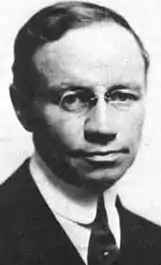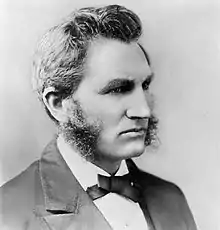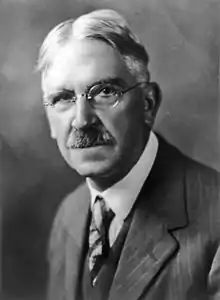Social democracy
Social democracy is a political, social and economic philosophy within socialism[1] that supports political and economic democracy.[2] As a policy regime, it is described by academics as advocating economic and social interventions to promote social justice within the framework of a liberal-democratic polity and a capitalist-oriented mixed economy. The protocols and norms used to accomplish this involve a commitment to representative and participatory democracy, measures for income redistribution, regulation of the economy in the general interest and social-welfare provisions.[3] Due to longstanding governance by social-democratic parties during the post-war consensus and their influence on socioeconomic policy in Northern and Western Europe, social democracy became associated with Keynesianism, the Nordic model, the social-liberal paradigm and welfare states within political circles in the late 20th century.[4] It has been described as the most common form of Western or modern socialism[5] as well as the reformist wing of democratic socialism.[6]
| Part of a series on |
| Social democracy |
|---|
 |
|
| Part of the Politics series | ||||||
| Party politics | ||||||
|---|---|---|---|---|---|---|
.svg.png.webp) | ||||||
| Political spectrum | ||||||
|
||||||
| Party platform | ||||||
| Party organization | ||||||
| Party Leadership | ||||||
|
||||||
| Party system | ||||||
|
|
||||||
| Coalition | ||||||
|
|
||||||
| Lists | ||||||
|
| ||||||
Social democracy originated as a political ideology that advocated an evolutionary and peaceful transition from capitalism to socialism using established political processes in contrast to the revolutionary approach to transition associated with orthodox Marxism.[7] In the early post-war era in Western Europe, social democratic parties rejected the Stalinist political and economic model then current in the Soviet Union, committing themselves either to an alternative path to socialism or to a compromise between capitalism and socialism.[8] In this period, social democrats embraced a mixed economy based on the predominance of private property, with only a minority of essential utilities and public services under public ownership. As a result, social democracy became associated with Keynesian economics, state interventionism and the welfare state while placing less emphasis on the prior goal of replacing the capitalist system (factor markets, private property and wage labor) with a qualitatively different socialist economic system.[9]
While retaining socialism as a long-term goal,[10] social democracy seeks to humanize capitalism and create the conditions for it to lead to greater democratic, egalitarian and solidaristic outcomes.[11] It is characterized by a commitment to policies aimed at curbing inequality, eliminating oppression of underprivileged groups and eradicating poverty[12] as well as support for universally accessible public services like care for the elderly, child care, education, health care and workers' compensation.[13] It often has strong connections with the labour movement and trade unions, being supportive of collective bargaining rights for workers and measures to extend decision-making beyond politics into the economic sphere in the form of co-determination, or even social ownership, for employees and stakeholders.[14] The Third Way, which ostensibly aims to fuse liberal economics with social democratic welfare policies, is an ideology that developed in the 1990s and is sometimes associated with social democratic parties, but some analysts have instead characterized the Third Way as an effectively neoliberal movement.[15]
Overview
Definition
Social democracy is defined as one of many socialist traditions.[1] As a political movement, it aims to achieve socialism through gradual and democratic means.[16] This definition goes back to the influence of both the reformist socialism of Ferdinand Lassalle as well as the internationalist revolutionary socialism advanced by Karl Marx and Friedrich Engels, from whom social democracy was influenced.[17] As an international political movement and ideology, social democracy has undergone various major forms throughout its history.[18] Whereas in the 19th century it was "organized Marxism", social democracy became "organized reformism" by the 20th century.[19] In contemporary usage, social democracy as a policy regime[20] generally means support for a mixed economy and ameliorative measures to benefit the working class within the framework of capitalism.[21]
In political science, democratic socialism and social democracy are largely seen as synonyms[22] while they are distinguished in journalistic use.[23] Under this democratic socialist definition,[nb 1] social democracy is an ideology seeking to gradually build an alternative socialist economy through the institutions of liberal democracy.[24] Starting in the post-war period, social democracy was defined as a policy regime[nb 2] advocating reformation of capitalism to align it with the ethical ideals of social justice.[28] In the 19th century, it encompassed a wide variety of non-revolutionary and revolutionary currents of socialism which excluded anarchism.[29] In the early 20th century, social democracy came to refer to support for a gradual process of developing socialism through existing political structures and an opposition to revolutionary means of achieving socialism in favor of reformism.[24]
In the 19th century, social democrat was a broad catch-all for international socialists owing their basic ideological allegiance to Lassalle or Marx, in contrast to those advocating various forms of utopian socialism. In one of the first scholarly works on European socialism written for an American audience, Richard T. Ely's 1883 book French and German Socialism in Modern Times, social democrats were characterized as "the extreme wing of the socialists" who were "inclined to lay so much stress on equality of enjoyment, regardless of the value of one's labor, that they might, perhaps, more properly be called communists".[30] Many parties in this era described themselves as Social Democrat, including the General German Workers' Association and the Social Democratic Workers' Party of Germany which merged to form the Social Democratic Party of Germany, the British Social Democratic Federation and the Russian Social Democratic Labour Party. Social Democrat continued to be used in this context up to the time of the Bolshevik Revolution of October 1917, at which time Communist came into vogue for individuals and organizations espousing a revolutionary road to socialism.[31] According to Ely:
[Social democrats] have two distinguishing characteristics. The vast majority of them are laborers, and, as a rule, they expect the violent overthrow of existing institutions by revolution to precede the introduction of the socialistic state. I would not, by any means, say that they are all revolutionists, but the most of them undoubtedly are. The most general demands of the social democrats are the following: The state should exist exclusively for the laborers; land and capital must become collective property, and production be carried on unitedly. Private competition, in the ordinary sense of the term, is to cease.[32]
As a label or term, social democracy or social democratic remains controversial among socialists. Some define it as representing both a Marxist faction and non-communist socialists or the right-wing of socialism during the split with communism.[27] Others have noted its pejorative use among communists and other socialists. According to Lyman Tower Sargent, "socialism refers to social theories rather than to theories oriented to the individual. Because many communists now call themselves democratic socialists, it is sometimes difficult to know what a political label really means. As a result, social democratic has become a common new label for democratic socialist political parties".[33] According to Donald Busky:
Social democracy is a somewhat controversial term among democratic socialists. Many democratic socialists use social democracy as a synonym for democratic socialism, while others, particularly revolutionary democratic socialists, do not, the latter seeing social democracy as something less than socialism—a milder, evolutionary ideology that seeks merely to reform capitalism. Communists also use the term social democratic to mean something less than true socialism that sought only to preserve capitalism by reform rather than by overthrowing and establishing socialism. Even revolutionary democratic socialists and Communists have at times, particularly the past, called their parties "social democratic."[34]
Marxist revisionist Eduard Bernstein's views influenced and laid the groundwork for the development of post-war social democracy as a policy regime, Labour revisionism and the neo-revisionism[35] of the Third Way.[36] This definition of social democracy is focused on ethical terms, with the type of socialism advocated being ethical and liberal.[37] Bernstein described socialism and social democracy in particular as "organized liberalism".[38] In this sense, liberalism is the predecessor and precursor of socialism,[39] whose restricted view of freedom is to be socialized while democracy must entails social democracy.[40] For those social democrats, who still describe and see themselves as socialists, socialism is used in ethical or moral terms,[41] representing democracy, egalitarianism and social justice rather than a specifically socialist economic system.[42] Under this type of definition, social democracy's goal is that of advancing those values within a capitalist market economy as its support for a mixed economy no longer denotes the coexistence between private and public ownership or that between planning and market mechanisms, but rather it represents free markets combined with government intervention and regulations.[43]
Social democracy has been seen by some as an essentially revision of orthodox Marxism,[44] although this has been described as misleading for modern social democracy.[45] Some distinguish between ideological social democracy as part of the broad socialist movement and social democracy as a policy regime. The first is called classical social democracy or classical socialism,[46] being contrasted to competitive socialism,[47] liberal socialism,[48] neo-social democracy[49] and new social democracy.[50]
Social democracy has often been conflated with an administrative command economy, authoritarian socialism, big government, Marxist–Leninist states, Soviet-type economic planning, state interventionism and state socialism. Austrian School economists such as Friedrich Hayek and Ludwig von Mises also continually used socialism as a synonym for central planning and social democracy for state socialism, conflating it with fascism and opposing social-democratic policies, including the welfare state.[51] This is notable in the United States, where socialism has become a pejorative used by conservatives and libertarians to taint liberal and progressive policies, proposals and public figures.[52] Those confusions are caused not only by the socialist definition, but by the capitalist definition as well. Christian democrats, social liberals, national and social conservatives tend to support some social-democratic policies and generally regard capitalism as compatible with a mixed economy. On the other hand, classical liberals, conservative liberals, neoliberals, liberal conservatives and right-libertarians define capitalism as the free market. The latter support a small government and a laissez-faire capitalist market economy while opposing economic interventionism, government regulations and social-democratic policies.[53] They see actually existing capitalism as corporatism, corporatocracy, or crony capitalism.[54] This has resulted in socialism and by extension social democracy being defined in countries such as Norway and the United Kingdom as "what a Labour government does".[55]
With the rise of neoliberalism in the late 1970s and early 1980s and the Third Way between the 1990s and 2000s, social democracy became synonymous with it.[56] Many social democrats opposed to the Third Way overlap with democratic socialists in their commitment to a democratic alternative to capitalism and a post-capitalist economy. Those social democrats have not only criticized the Third Way as anti-socialist[57] and neoliberal,[58] but also as anti-social democratic in practice.[57] Some democratic socialists and others have rejected the Third Way's centrism, for the political centre moved decidedly to the right during the neoliberal years.[59] Social-democratic parties such as the British Labour Party and the Social Democratic Party of Germany have been described as effectively representing a new centre-right[59] or neoliberal party.[60]
Overlap with democratic socialism
| Part of a series on |
| Socialism |
|---|
 |
|
Social democracy has some significant overlap on practical policy positions with democratic socialism,[61] although they are usually distinguished from each other.[62] While the now revised version of Clause IV to the British Labour Party Constitution which was implemented in the 1990s by the New Labour faction led by Tony Blair[63] affirms a formal commitment to democratic socialism,[64] describing it as a modernized form of social democracy,[65] it no longer commits the party to public ownership of industry and in its place advocates "the enterprise of the market and the rigour of competition" along with "high quality public services either owned by the public or accountable to them".[64] Many social democrats "refer to themselves as socialists or democratic socialists" and some such as Tony Blair[66] "use or have used these terms interchangeably".[67] Others argue that "there are clear differences between the three terms, and preferred to describe their own political beliefs by using the term 'social democracy' only".[68]
Democratic socialism is generally defined as an anti-Stalinist left-wing big tent that opposes authoritarian socialism, rejecting self-described socialist states as well as Marxism–Leninism and its derivatives such as Maoism and Stalinism.[69] Besides social democrats, democratic socialists also include some anarchists,[70] classical Marxists,[71] democratic communists,[72] libertarian socialists,[73] market socialists,[74] orthodox Marxists such as Karl Kautsky[75] and Rosa Luxemburg[76] as well as revisionists such as Eduard Bernstein.[77]
As a term, democratic socialism represents social democracy prior to the 1970s,[78] when the post-war displacement of Keynesianism by monetarism and neoliberalism caused many social-democratic parties to adopt the Third Way ideology, accepting capitalism as the current status quo and redefining socialism in a way that maintains the capitalist structure intact.[79] Like modern social democracy, democratic socialism tends to follow a gradual, reformist or evolutionary path to socialism rather than a revolutionary one.[80][81] Policies commonly supported by both are Keynesian in nature and include some degree of regulation over the economy, social insurance schemes, public pension programs and a gradual expansion of public ownership over major and strategic industry.[33]
According to both right-wing critics and some supporters alike, policies such as universal health care and education are "pure Socialism" because they are opposed to "the hedonism of capitalist society".[82] Partly because of this overlap, democratic socialism refers to European socialism as represented by social democracy,[83] especially in the United States,[84] where it is tied to the New Deal.[85] Some democratic socialists who follow social democracy support practical, progressive reforms of capitalism and are more concerned to administrate and humanize it, with socialism relegated to the indefinite future.[86] Other democratic socialists want to go beyond mere meliorist reforms and advocate systematic transformation of the mode of production from capitalism to socialism.[87]
During the late 20th century, those labels were embraced, contested and rejected due to the emergence of developments within the European left[88] such as Eurocommunism,[89] the rise of neoliberalism,[90] the fall of the Soviet Union and Revolutions of 1989,[91] the Third Way[92] and the rise of anti-austerity[93] and Occupy[94] movements due to the global financial crisis of 2007–2008 and the Great Recession,[95] the causes of which have been attributed by some to the neoliberal shift and deregulation economic policies.[96] This latest development contributed to the rise of politicians such as Jeremy Corbyn in the United Kingdom and Bernie Sanders in the United States[97] who rejected centrist politicians that supported triangulation within the Labour and Democratic parties.[98]
Despite the long history of overlap between the two, with social democracy considered a form of democratic or parliamentary socialism and social democrats calling themselves democratic socialists,[22] democratic socialism is considered a misnomer in the United States.[99] One issue is that social democracy is equated with wealthy countries in the Western world (especially in Northern and Western Europe) while democratic socialism is conflated either with the pink tide in Latin America (especially with Venezuela)[100] or with communism in the form of Marxist–Leninist socialism as practized in the Soviet Union and other self-declared socialist states.[23] In the United States, democratic socialism has been described as representing the left-wing[101] or socialist tradition of the New Deal.[102] The lack of a strong and influential socialist movement in the United States has been linked to the Red Scare[103] and any ideology that is associated with socialism brings social stigma due its association with authoritarian socialist states.[104] As a term, socialism has been used as a scare word or a pejorative term without clear definition by conservatives and libertarians to taint liberal and progressive policies, proposals and public figures.[52] Although Americans may reject the idea that the United States has characteristics of a European-style social democracy, it has been argued by other observers that it has a comfortable social safety net, albeit severely underfunded in comparison to other Western countries.[105] It has also been argued that many policies that may be considered socialist are popular, but that socialism is not.[101] Others such as Tony Judt described modern liberalism in the United States as representing European social democracy.[106]
Political party
Social Democratic is the name of socialist parties in some countries. The term came to be associated with the positions of the German and Swedish parties. The first advocated revisionist Marxism while the second advocated a comprehensive welfare state. Today, parties advocating social democracy include Labour, Left and some Green parties.[107] Most social-democratic parties consider themselves to be democratic socialists and are routinely called socialist parties.[108] Some such as the Labour Party in the United Kingdom make reference to socialism,[64] either as a post-capitalist order[109] or in ethical terms as a just society, described as representing democratic socialism,[110] without any explicit reference to the economic system.[111] Parties such as the Social Democratic Party of Germany and the Swedish Social Democratic Party[nb 3] describe their goal the development of democratic socialism,[113] with social democracy serving as the principle of action.[114] Today, European social-democratic parties represents the centre-left and most are part of the European Socialist Party while democratic socialist parties are to their left within the Party of the European Left. Many of those contemporary social-democratic parties are members of the Socialist International, including several democratic socialist parties, whose Frankfurt Declaration declares the goal of the development of democratic socialism.[34] Others are also part of the Progressive Alliance, founded in 2013 by most of current or former member parties of the Socialist International.[115]
What socialists such as anarchists, communists, social democrats, syndicalists and some social-democratic proponents of the Third Way share in common is history, specifically that they can all be traced back to the individuals, groups and literature of the First International and have retained some of the terminology and symbolism such as the colour red. How far society should intervene and whether government, particularly existing government, is the correct vehicle for change are issues of disagreement.[116] As the Historical Dictionary of Socialism argues, "there were general criticisms about the social effects of the private ownership and control of capital", "a general view that the solution to these problems lay in some form of collective control (with the degree of control varying among the proponents of socialism) over the means of production, distribution, and exchange" and "there was agreement that the outcomes of this collective control should be a society that provided social equality and justice, economic protection, and generally a more satisfying life for most people".[116] Socialism became a catch-all term for the critics of capitalism and industrial society.[117] Social democrats are anti-capitalists insofar as criticism about "poverty, low wages, unemployment, economic and social inequality, and a lack of economic security" is linked to the private ownership of the means of production.[116]
Development
| Part of a series on |
| Marxism |
|---|
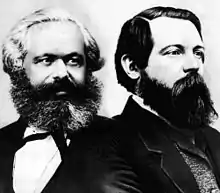 |
|
During the late 19th century and the early 20th century, social democracy was a broad labour movement within socialism that aimed to replace private ownership with social ownership of the means of production, distribution and exchange, taking influence from both Marxism and the supporters of Ferdinand Lassalle.[118] By 1868–1869, the socialism associated with Karl Marx had become the official theoretical basis of the first social-democratic party established in Europe, the Social Democratic Workers' Party of Germany.[119] By the early 20th century, the German social-democratic politician Eduard Bernstein rejected the ideas in orthodox Marxism that proposed specific historical progression and revolution as a means to achieve social equality, advancing the position that socialism should be grounded in ethical and moral arguments for social justice and egalitarianism that are to be achieved through gradual legislative reform.[120] Following the split between reformist and revolutionary socialists in the Second International, socialist parties influenced by Bernstein rejected revolutionary politics in favour of parliamentary reform while remaining committed to socialization.[121]
During the 1920s and 1930s, social democracy became a dominant tendency within the socialist movement, mainly associated with reformist socialism whilst communism represented revolutionary socialism.[122] Under the influence of politicians like Carlo Rosselli in Italy, social democrats began disassociating themselves from orthodox Marxism altogether as represented by Marxism–Leninism,[123] embracing liberal socialism,[124] Keynesianism[123] and appealing to morality rather than any consistent systematic, scientific or materialist worldview.[125] Social democracy made appeals to communitarian, corporatist and sometimes nationalist sentiments while rejecting the economic and technological determinism generally characteristic of both orthodox Marxism and economic liberalism.[126]
By the post-World War II period and its economic consensus and expansion, most social democrats in Europe had abandoned their ideological connection to orthodox Marxism and shifted their emphasis toward social policy reform as a compromise between capitalism to socialism.[127] According to Michael Harrington, the major reason for this was due to the perspective that viewed the Stalinist-era Soviet Union as having succeeded in propaganda in usurping the legacy of Marxism and distorting it in propaganda to justify totalitarianism.[128] In its foundation, the Socialist International denounced the Bolshevik-inspired communist movement, "for [it] falsely claims a share in the Socialist tradition".[129] Furthermore, core tenets of Marxism have been regarded by social democrats as having become obsolete, including the prediction that the working-class was the decisive class with the development of capitalism. In their view, this did not materialize in the aftermath of mass industrialization during World War II.[128]
During the Third Way development of social democracy, social democrats adjusted themselves to the neoliberal political climate that had existed since the 1980s. Those social democrats recognized that outspoken opposition to capitalism was politically non-viable and that accepting the current powers that be and seeking to challenge free-market and laissez-faire variations of capitalism was a more immediate concern.[130] The Third Way stands for a modernized social democracy,[131] but the social democracy that remained committed to the gradual abolition of capitalism, along with social democrats opposed to the Third Way, merged into democratic socialism.[132] Although social democracy originated as a revolutionary socialist or communist movement,[32] one distinction made to separate democratic socialism and social democracy is that the former can include revolutionary means.[133] The latter asserts that the only acceptable constitutional form of government is representative democracy under the rule of law.[134]
Social democracy has been described as the evolutionary form of democratic socialism that aims to gradually and peacefully achieve socialism through established political processes rather than social revolution as advocated by revolutionary socialists.[16] In this sense, social democracy is synonymous with democratic socialism and represented its original form, i.e. socialism achieved by democratic means, usually through the parliament.[135] While social democrats continue to call and describe themselves as democratic socialists or simply socialists,[67] with time, the post-war association of social democracy as policy regime[136] and the development of the Third Way,[92] democratic socialism has come to include communist and revolutionary tendencies,[137] effectively representing the original meaning of social democracy[138] as the latter has shifted towards mostly reformism.[139]
Philosophy
Philosophically and etymologically overlapping with democratic socialism, social democracy is a form of reformist democratic socialism.[6] Social democracy rejects the either/or interpretation of capitalism versus socialism.[140] It claims that fostering a progressive evolution of capitalism will gradually result in the evolution of a capitalist economy into a socialist economy.[141] Social democracy argues that all citizens should be legally entitled to certain social rights. These are made up of universal access to public services such as education, health care, workers' compensation and other services including child care and care for the elderly.[13] Social democracy also advocates freedom from discrimination based on differences of ability/disability, age, ethnicity, gender, language, race, religion, sexual orientation and social class.[142]
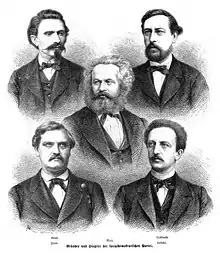
Later in their life, Karl Marx and Friedrich Engels came to argue that in some countries workers might be able to achieve their aims through peaceful means.[143] In this sense, Engels argued that socialists were evolutionists, although both Marx and Engels remained committed to social revolution.[144] In developing social democracy,[145] Marxist revisionist Eduard Bernstein rejected the revolutionary and materialist foundations of orthodox Marxism.[120] Rather than class conflict and socialist revolution,[39] Bernstein believed that socialism could be achieved through cooperation between people regardless of class.[146] Nonetheless, Bernstein paid deference to Marx, describing him as the father of social democracy, but declaring that it was necessary to revise Marx's thought in light of changing conditions.[147] Influenced by the gradualist platform favoured by the British Fabian movement,[148] Bernstein came to advocate a similar evolutionary approach to socialist politics that he termed evolutionary socialism.[149] Evolutionary means include representative democracy and cooperation between people regardless of class. Bernstein accepted the Marxist analysis that the creation of socialism is interconnected with the evolution of capitalism.[146]
August Bebel, Bernstein, Engels, Wilhelm Liebknecht, Marx and Carl Wilhelm Tölcke are all considered founding fathers of social democracy in Germany, but it is especially Bernstein and Lassalle, along with labourists and reformists such as Louis Blanc in France,[150] who led to widespread association of social democracy with socialist reformism.[151] While Lassalle was a reformist state socialist,[152] Bernstein predicted a long-term co-existence of democracy with a mixed economy during the reforming of capitalism into socialism and argued that socialists needed to accept this.[146] This mixed economy would involve public, cooperative and private enterprises and it would be necessary for a long period of time before private enterprises evolve of their own accord into cooperative enterprises.[153] Bernstein supported state ownership only for certain parts of the economy that could be best managed by the state and rejected a mass scale of state ownership as being too burdensome to be manageable.[146] Bernstein was an advocate of Kantian socialism and neo-Kantianism.[154] Although unpopular early on, his views became mainstream after World War I.[155]
In The Future of Socialism (1956), Anthony Crosland argued that "traditional capitalism has been reformed and modified almost out of existence, and it is with a quite different form of society that socialists must now concern themselves. Pre-war anti-capitalism will give us very little help", for a new kind of capitalism required a new kind of socialism. Crosland believed that these features of a reformed managerial capitalism were irreversible, but it has been argued within the Labour Party and by others that Margaret Thatcher and Ronald Reagan brought about its reversal in the 1970s and 1980s. While the post-war consensus represented a period where social democracy was "most buoyant", it has been argued that "post-war social democracy had been altogether too confident in its analysis" because "gains which were thought to be permanent turned out to be conditional and as the reservoir of capitalist growth showed signs of drying up".[156] In Socialism Now (1974), Crosland argued that "[m]uch more should have been achieved by a Labour Government in office and Labour pressure in opposition. Against the dogged resistance to change, we should have pitted a stronger will to change. I conclude that a move to the Left is needed".[157]
In Origin, Ideology and Transformation of Political Parties: East-Central and Western Europe Compared, Vít Hloušek and Lubomír Kopecek explain how socialist parties have evolved from the 19th to the early 21st centuries. As the number of people in traditional working class occupations such as factory-workers and miners declined, socialists have successfully widened their appeal to the middle class by diluting their ideology.[158] However, there is still continuity between parties such the German SPD, the British Labour Party and other socialist parties which remain part of the same famille spirituelle or ideological party family as outlined by most political scientists.[159] For many social democrats, Marxism is loosely held to be valuable for its emphasis on changing the world for a more just, better future.[160]
Communist split and the Third Way
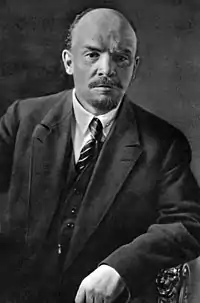
Before social democracy was associated to a policy regime with a specific set of socioeconomic policies, its economics ranged from communism[162] to syndicalism and the guild socialists,[163] who rejected or were opposed to the approach of some Fabians,[164] regarded as being "an excessively bureaucratic and insufficiently democratic prospect".[165] Communists and revolutionary socialists were a significant part of social democracy and represented its revolutionary wing.[32] Although they remained committed to the concept of social democracy representing the highest form of democracy,[166] social democracy became associated with its reformist wing since the communist split starting in 1917.[19]
The Russian Revolution further exacerbated this division, resulting in a split between those supporting the October Revolution renaming themselves as Communist and those opposing the Bolshevik development (favouring the liberal social-democratic development as argued by the Mensheviks) remaining with the Social Democrat label.[167] Rather than abandoning social democracy, Communists simply remained committed to revolutionary social democracy, merging into communism.[166] However, they saw Social Democrat associated to reformism, found it irredeemably lost and chose Communist to represent their views.[168] For the Communists, the Social Democrats betrayed the world's working class by supporting the imperialist Great War and leading their national governments into the war. The Communists also criticized their reformism, arguing that it represented "reformism without reforms".[169] This reformist–revolutionary division culminated in the German Revolution of 1919[170] in which the Communists wanted to overthrow the German government to turn it into a soviet republic like it was done in Russia while the Social Democrats wanted to preserve it as what came to be known as the Weimar Republic.[171] It was those revolutions that essentially transformed the social democracy meaning from "Marxist revolutionary" into a form of "moderate parliamentary socialism".[172]

While evolutionary and reformist social democrats believe that capitalism can be reformed into socialism,[173] revolutionary social democrats argue that this is not possible and that a social revolution would still be necessary. The revolutionary criticism of reformism, but not necessarily of reforms which are part of the class struggle, goes back to Marx, who proclaimed that social democrats had to support the bourgeoisie wherever it acted as a revolutionary, progressive class because "bourgeois liberties had first to be conquered and then criticised".[174] Internal rivalry in the social-democratic movement within the Second International between reformists and revolutionaries resulted in the Communists led by the Bolsheviks founding their own separate Communist International (Comintern) in 1919 that sought to rally revolutionary social democrats together for socialist revolution. With this split, the social-democratic movement was now dominated by reformists, who founded the Labour and Socialist International (LSI) in 1923. The LSI had a history of rivalry with the Comintern, with which it competed over the leadership of the international socialist and labour movement.[175]
The social-democratic Gaitskellites emphasized the goals of personal liberty, social welfare and above all social equality.[176] The Gaitskellites were part of a political consensus between the British Labour and Conservative parties, famously dubbed Butskellism.[177] Some social-democratic Third Way figures such as Anthony Giddens and Tony Blair, who has described himself as a Christian socialist and consider himself to be a socialist in ethical terms,[178] adamantly insist that they are socialists,[179] for they claim to believe in the same values that their anti-Third Way critics do.[66] However, Clause IV's open advocacy of state socialism was alienating potential middle-class Labour supporters and nationalization policies had been so thoroughly attacked by neoliberal economists and politicians, including rhetorical comparisons by the right of state-owned industry in the West to that in the Soviet Union and the Eastern Bloc, hence nationalizations and state socialism became unpopular. In countries such as Britain, Thatcherite Conservatives were adept at condemning state-owned enterprises as economically inefficient.[53] For the Gaitskellites, nationalization was not essential to achieve all major socialist objectives. Public ownership and nationalization were not specifically rejected, but were rather seen as merely one of numerous useful devices.[176] According to social-democratic modernizers like Blair, nationalization policies were politically unviable by the 1990s.[180]
Some critics and analysts argue that a number of prominent social-democratic parties[nb 6] such as the British Labour Party and the German Social Democratic Party, even while maintaining references to socialism and declaring themselves to be democratic socialist parties, have effectively abandoned socialism in practice, whether unwillingly or not.[181]
Policy regime
As a policy regime, it has become commonplace to reference social democracy as the European social democracies, i.e. the actually-existing states in Northern and Western European countries,[182] usually in reference to their model of welfare state and corporatist system of collective bargaining.[183] European social democracies represents a socio-economic order that has been variously described as starting in either the 1930s, 1940s and 1950s and ending in the 1970s, 1980s and 1990s. Henning Meyer and Jonathan Rutherford associate social democracy with the socio-economic order that existed in Europe from the post-war period up until the early 1990s.[184] This has been accepted or adopted across the political spectrum,[25] including conservatives (Christian democrats), liberals (social liberals) and socialists (social democrats).[185] However, socialists see the welfare state "not merely to provide benefits but to build the foundation for emancipation and self-determination".[186]
Social democracy influenced the development of social corporatism, a form of economic tripartite corporatism based upon a social partnership between the interests of capital and labour, involving collective bargaining between representatives of employers and of labour mediated by the government at the national level.[187] During the post-war consensus, this form of social democracy has been a major component of the Nordic model and to a lesser degree the West European social market economies.[188] The development of social corporatism began in Norway and Sweden in the 1930s and was consolidated in the 1960s and 1970s.[189] The system was based upon the dual compromise of capital and the labour as one component and the market and the state as the other component.[189] From the 1940s through the 1970s, defining features of social democracy as a policy regime included Keynesian economic policies and industrial agreements to balance the power of capital and labor as well as the welfare state.[24] This is especially associated with the Swedish Social Democrats.[190] In the 1970s, social corporatism evolved into neo-corporatism which essentially replaced it. Neo-corporatism has represented an important concept of Third Way social democracy.[191] Social-democratic theorist Robin Archer wrote about the importance of social corporatism to social democracy in his work Economic Democracy: The Politics of a Feasible Socialism (1995).[192] As a welfare state, social democracy is a specific type of welfare state and policy regime described as being universalist, supportive of collective bargaining and more supportive of public provision of welfare. It is especially associated to the Nordic model.[193]
As a policy regime, social democracy rests on three fundamental features, namely "(1) democracy (e.g., equal rights to vote and form parties), (2) an economy partly regulated by the state (e.g., through Keynesianism), and (3) a welfare state offering social support to those in need (e.g., equal rights to education, health service, employment, and pensions)".[194] In practice, social-democratic parties have been instrumental in the social-liberal paradigm lasting from the 1940s and 1970s and called as such because it was developed by social liberals, but implemented by social democrats.[195] Since those policies were mostly implemented by social democrats, social liberalism is sometimes called social democracy.[196] The social-liberal Beveridge Report drafted by the Liberal economist William Beveridge influenced the British Labour Party's social policies such as the National Health Service and Labour's welfare state development.[197] This social-liberal paradigm represented the post-war consensus and was accepted across the political spectrum by conservatives, liberals and socialists until the 1970s.[198] Similarly, the neoliberal paradigm which replaced the previous paradigm was accepted across the mainstream political parties, including social-democratic supporters of the Third Way.[199] This has caused much controversy within the social-democratic movement.[181]
Implementation
From the late 19th century until the mid- to late 20th century, there was greater public confidence in the idea of a state-managed economy that was a major pillar of both proponents of communism and social democracy and even to a substantial degree by conservatives and left-liberals.[200] Aside from anarchists and other libertarian socialists, there was confidence amongst socialists in the concept of state socialism as being the most effective form of socialism. Some early British social democrats in the 19th century and 20th century such as the Fabians claimed that British society was already mostly socialist and that the economy was significantly socialist through government-run enterprises created by conservative and liberal governments which could be run for the interests of the people through their representatives' influence,[201] an argument reinvoked by some socialists in post-war Britain.[202] Advents in economics and observation of the failure of state socialism in the Eastern Bloc countries[203] and in the Western world with the crisis and stagflation of the 1970s,[204] combined with the neoliberal rebuke of state interventionism, resulted in socialists re-evaluating and redesigning socialism.[205] Some social democrats have sought to keep what they deem are socialism's core values while changing their position on state involvement in the economy, but retaining significant social regulations.[206]
When nationalization of large industries was relatively widespread in the 20th century until the 1970s, it was not uncommon for commentators to describe some European social democracies as democratic socialist states seeking to move their countries toward a socialist economy.[207] In 1956, leading British Labour Party politician and author Anthony Crosland claimed that capitalism had been abolished in Britain,[208] although others such as Welshman Aneurin Bevan, Minister of Health in the first post-war Labour government and the architect of the National Health Service, disputed the claim.[209] For Crosland and others who supported his views, Britain was a socialist state.[202] According to Bevan, Britain had a socialist National Health Service which stood in opposition to the hedonism of Britain's capitalist society.[82]
Although as in the rest of Europe the laws of capitalism still operated fully and private enterprise dominated the economy,[210] some political commentators claimed that during the post-war period, when social-democratic parties were in power, countries such as Britain and France were democratic socialist states and the same claim is now applied to Nordic countries with the Nordic model.[207] In the 1980s, the government of President François Mitterrand aimed to expand dirigism and attempted to nationalize all French banks, but this attempt faced opposition of the European Economic Community because it demanded a free-market economy among its members.[211] Public ownership never accounted for more than 15–20% of capital formation, further dropping to 8% in the 1980s and below 5% in the 1990s after the rise of neoliberalism.[210]
One issue of social democracy is the response to the collapse of legitimacy for state socialism and state-interventionist economics of Keynesianism with the discovery of the phenomenon of stagflation which has been an issue for the legitimacy of state socialism.[212] This has provoked re-thinking of how socialism should be achieved by social democrats,[213] including changing views by social democrats on private property—anti-Third Way social democrats such as Robert Corfe have advocated a socialist form of private property as part of a new socialism (although Corfe technically objects to the term private property to collectively describe property that is not publicly owned as being vague) and rejecting state socialism as a failure.[214] Third Way social democracy was formed as response to what its proponents saw as a crisis in the legitimacy of socialism—especially state socialism—and the rising legitimacy for neoliberalism, especially laissez-faire capitalism. The Third Way's view is criticized for being too simplistic in its view of the crisis.[215] Others have criticized it because with the fall of state socialism it was possible "a new kind of 'third way' socialism (combining social ownership with markets and democracy), thereby heralding a revitalization of the social democratic tradition".[216] However, it has been argued that the prospect of a new socialism was "a chimera, a hopeful invention of Western socialists who had not understood how 'actually existing socialism' had totally discredited any version of socialism among those who had lived under it".[216]
History
Social democracy originated as an ideology within the labour and socialist movement,[217] whose goal at different times has been a social revolution to move away from capitalism to a post-capitalist economy such as socialism,[32] a peaceful revolution as in the case of evolutionary socialism,[218] or the establishment and support of a welfare state.[219] Its origins lie in the 1860s as a revolutionary socialism associated with orthodox Marxism.[220] Starting in the 1890s, there was a dispute between committed revolutionary social democrats such as Rosa Luxemburg[221] and reformist social democrats as well as Marxist revisionists such as Eduard Bernstein, who supported a more gradual approach grounded in liberal democracy and cross-class cooperation,[222] with Karl Kautsky representing a centrist position.[223] By the 1920s, social democracy became the dominant political tendency along with communism within the international socialist movement,[122] representing a form of democratic socialism with the aim of achieving socialism peacefully.[16] By the 1910s, social democracy had spread worldwide and transitioned towards advocating an evolutionary change from capitalism to socialism using established political processes such as the parliament.[16] In the late 1910s, socialist parties committed to revolutionary socialism renamed themselves as communist parties, causing a split in the socialist movement between these supporting the October Revolution and those opposing it.[224] Social democrats who were opposed to the Bolsheviks later renamed themselves as democratic socialists in order to highlight their differences from communists and later in the 1920s from Marxist–Leninists,[225] disagreeing with the latter on topics such as their opposition to liberal democracy whilst sharing common ideological roots.[44]
In the early post-war era, social democrats in Western Europe rejected the Stalinist political and economic model then current in the Soviet Union, committing themselves either to an alternative path to socialism or to a compromise between capitalism and socialism.[8] During the post-war period, social democrats embraced the idea of a mixed economy based on the predominance of private property, with only a minority of essential utilities and public services being under public ownership.[121] As a policy regime, social democracy became associated with Keynesian economics, state interventionism and the welfare state as a way to avoid capitalism's typical crises and to avert or prevent mass unemployment,[226] without abolishing factor markets, private property and wage labour.[9] With the rise in popularity of neoliberalism and the New Right by the 1980s,[227] many social-democratic parties incorporated the Third Way ideology,[228] aiming to fuse economic liberalism with social-democratic welfare policies.[229] By the 2010s, social-democratic parties that accepted triangulation and the neoliberal[230] shift in policies such as austerity, deregulation, free trade, privatization and welfare reforms such as workfare experienced a drastic decline.[231][232] The Third Way largely fell out of favour in a phenomenon known as Pasokification.[233] Scholars have linked the decline of social-democratic parties to the declining number of industrial workers, greater economic prosperity of voters and a tendency for these parties to shift from the left to the centre on economic issues, alienating their former base of supporters and voters in the process. This decline has been matched by increased support for more left-wing and left-wing populist parties as well as for Left and Green social-democratic parties that reject neoliberal and Third Way policies.[234]
Social democracy was highly influential throughout the 20th century.[235] Starting in the 1920s and 1930s, with the aftermath of World War I and that of the Great Depression, social democrats were elected to power.[236] In countries such as Britain, Germany and Sweden, social democrats passed social reforms and adopted proto-Keynesian approaches that would be promoted across the Western world in the post-war period, lasting until the 1970s and 1990s.[237] Academics, political commentators and other scholars tend to distinguish between authoritarian socialist and democratic socialist states, with the first representing the Soviet Bloc and the latter representing Western Bloc countries which have been democratically governed by socialist parties such as Britain, France, Sweden and Western social-democracies in general, among others.[238] Social democracy has been criticized by both the left and right. The left criticizes social democracy for having betrayed the working class during World War I and played a role in the failure of the proletarian 1917–1924 revolutionary wave, further accusing social democrats of having abandoned socialism.[239] Conversely, one critique of the right is mainly related to their criticism of welfare. Another criticism concerns the compatibility of democracy and socialism.[240]
First International era and origins in the socialist movement (1863–1889)
The concept of social democracy goes back to the French Revolution and the bourgeois-democratic Revolutions of 1848, with historians such as Albert Mathiez seeing the French Constitution of 1793 as an example and inspiration whilst labelling Maximilien Robespierre as the founding father of social democracy.[241] The origins of social democracy as a working-class movement[32] have been traced to the 1860s,[242] with the rise of the first major working-class party in Europe, the General German Workers' Association (ADAV) founded in 1863 by Ferdinand Lassalle.[220] The 1860s saw the concept of social democracy deliberately distinguishing itself from that of liberal democracy.[242] As Theodore Draper explains in The Roots of American Communism, there were two competing social-democratic versions of socialism in 19th-century Europe, especially in Germany,[243] where there was a rivalry over political influence between the Lassalleans and the Marxists. Although the latter theoretically won out by the late 1860s and Lassalle had died early in 1864, in practice the Lassallians won out[244] as their national-style social democracy and reformist socialism influenced the revisionist development of the 1880s and 1910s.[245] The year 1864 saw the founding of the International Workingmen's Association, also known as the First International. It brought together socialists of various stances and initially caused a conflict between Karl Marx and the anarchists, who were led by Mikhail Bakunin, over the role of the state in socialism, with Bakunin rejecting any role for the state.[246] Another issue in the First International was the question of reformism and its role within socialism.[247]

Although Lassalle was not a Marxist, he was influenced by the theories of Marx and Friedrich Engels and accepted the existence and importance of class struggle. Unlike Marx and Engels' Communist Manifesto, Lassalle promoted class struggle in a more moderate form.[17] While Marx's theory of the state saw it negatively as an instrument of class rule that should only exist temporarily upon the rise to power of the proletariat and then dismantled, Lassalle accepted the state. Lassalle viewed the state as a means through which workers could enhance their interests and even transform the society to create an economy based on worker-run cooperatives. Lassalle's strategy was primarily electoral and reformist, with Lassalleans contending that the working class needed a political party that fought above all for universal adult male suffrage.[220]
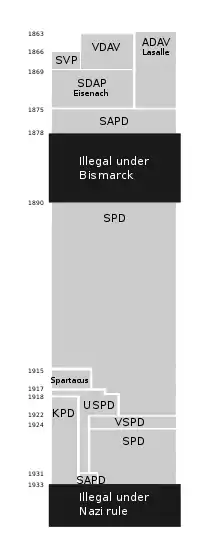
The ADAV's party newspaper was called The Social Democrat (German: Der Sozialdemokrat). Marx and Engels responded to the title Sozialdemocrat with distaste and Engels once writing: "But what a title: Sozialdemokrat! [...] Why do they not call the thing simply The Proletarian". Marx agreed with Engels that Sozialdemokrat was a bad title.[17] Although the origins of the name Sozialdemokrat actually traced back to Marx's German translation in 1848 of the Democratic Socialist Party (French: Partie Democrat-Socialist) into the Party of Social Democracy (German: Partei der Sozialdemokratie), Marx did not like this French party because he viewed it as dominated by the middle class and associated the word Sozialdemokrat with that party.[248] There was a Marxist faction within the ADAV represented by Wilhelm Liebknecht, who became one of the editors of the Der Sozialdemokrat.[17] While democrats looked to the Revolutions of 1848 as a democratic revolution which in the long run ensured liberty, equality and fraternity, Marxists denounced 1848 as a betrayal of working-class ideals by a bourgeoisie indifferent to the legitimate demands of the proletariat.[249]
Faced with opposition from liberal capitalists to his socialist policies, Lassalle controversially attempted to forge a tactical alliance with the conservative aristocratic Junkers due to their communitarian anti-bourgeois attitudes as well as with Prussian Chancellor Otto von Bismarck.[220] Friction in the ADAV arose over Lassalle's policy of a friendly approach to Bismarck that had incorrectly presumed that Bismarck would in turn be friendly towards them. This approach was opposed by the party's faction associated with Marx and Engels, including Liebknecht.[248] Opposition in the ADAV to Lassalle's friendly approach to Bismarck's government resulted in Liebknecht resigning from his position as editor of Die Sozialdemokrat and leaving the ADAV in 1865. In 1869, August Bebel and Liebknecht founded the Social Democratic Workers' Party of Germany (SDAP) as a merger of the petty-bourgeois Saxon People's Party (SVP), a faction of the ADAV and members of the League of German Workers' Associations (VDA).[248]
Although the SDAP was not officially Marxist, it was the first major working-class organization to be led by Marxists and both Marx and Engels had direct association with the party. The party adopted stances similar to those adopted by Marx at the First International. There was intense rivalry and antagonism between the SDAP and the ADAV, with the SDAP being highly hostile to the Prussian government while the ADAV pursued a reformist and more cooperative approach.[250] This rivalry reached its height involving the two parties' stances on the Franco-Prussian War, with the SDAP refusing to support Prussia's war effort by claiming it was an imperialist war pursued by Bismarck while the ADAV supported the war as a defensive one because it saw Emperor Napoleon III and France as an "overreacting aggressor".[251]

In the aftermath of the defeat of France in the Franco-Prussian War, revolution broke out in France, with revolutionary army members along with working-class revolutionaries founding the Paris Commune.[252] The Paris Commune appealed both to the citizens of Paris regardless of class as well as to the working class, a major base of support for the government, via militant rhetoric. In spite of such militant rhetoric to appeal to the working class, the Paris Commune received substantial support from the middle-class bourgeoisie of Paris, including shopkeepers and merchants. In part due to its sizeable number neo-Proudhonians and neo-Jacobins in the Central Committee, the Paris Commune declared that it was not opposed to private property, but that it rather hoped to create the widest distribution of it.[253] The political composition of the Paris Commune included twenty-five neo-Jacobins, fifteen to twenty neo-Proudhonians and proto-syndicalists, nine or ten Blanquists, a variety of radical republicans and a few members of the First International influenced by Marx.[254]

In the aftermath of the Paris Commune's collapse in 1871, Marx praised it in his work The Civil War in France (1871) for its achievements in spite of its pro-bourgeois influences and called it an excellent model of the dictatorship of the proletariat in practice as it had dismantled the apparatus of the bourgeois state, including its huge bureaucracy, military and executive, judicial and legislative institutions, replacing it with a working-class state with broad popular support.[255] The Paris Commune's collapse and the persecution of its anarchist supporters had the effect of weakening the influence of the Bakuninist anarchists in the First International which resulted in Marx expelling the weakened rival Bakuninists from the International a year later.[255] In Britain, the achievement of the legalization of trade unions under the Trade Union Act 1871 drew British trade unionists to believe that working conditions could be improved through parliamentary means.[256]
At the Hague Congress of 1872, Marx made a remark in which he admitted that while there are countries "where the workers can attain their goal by peaceful means", in most European countries "the lever of our revolution must be force".[143] In 1875, Marx attacked the Gotha Program that became the program of the Social Democratic Party of Germany (SDP) in the same year in his Critique of the Gotha Program. Marx was not optimistic that Germany at the time was open to a peaceful means to achieve socialism, especially after German Chancellor Otto von Bismarck had enacted the Anti-Socialist Laws in 1878.[257] At the time of the Anti-Socialist Laws beginning to be drafted but not yet published in 1878, Marx spoke of the possibilities of legislative reforms by an elected government composed of working-class legislative members, but also of the willingness to use force should force be used against the working class.[257]
In his study England in 1845 and in 1885, Engels wrote a study that analysed the changes in the British class system from 1845 to 1885 in which he commended the Chartist movement for being responsible for the achievement of major breakthroughs for the working class.[258] Engels stated that during this time Britain's industrial bourgeoisie had learned that "the middle class can never obtain full social and political power over the nation except by the help of the working class".[257] In addition, he noticed a "gradual change over the relations between the two classes".[258] This change he described was manifested in the change of laws in Britain that granted political changes in favour of the working class that the Chartist movement had demanded for years, arguing that they made a "near approach to 'universal suffrage,' at least such as it now exists in Germany".[258]

A major non-Marxian influence on social democracy came from the British Fabian Society. Founded in 1884 by Frank Podmore, it emphasized the need for a gradualist evolutionary and reformist approach to the achievement of socialism.[259] The Fabian Society was founded as a splinter group from the Fellowship of the New Life due to opposition within that group to socialism.[260] Unlike Marxism, Fabianism did not promote itself as a working-class movement and it largely had middle-class members.[261] The Fabian Society published the Fabian Essays on Socialism (1889), substantially written by George Bernard Shaw.[262] Shaw referred to Fabians as "all Social Democrats, with a common confiction [sic] of the necessity of vesting the organization of industry and the material of production in a State identified with the whole people by complete Democracy".[262] Other important early Fabians included Sidney Webb, who from 1887 to 1891 wrote the bulk of the Fabian Society's official policies.[263] Fabianism would become a major influence on the British labour movement.[261]
Second International era and reform or revolution dispute (1889–1914)
The social-democratic movement came into being through a division within the socialist movement. Starting in the 1880s and culminating in the 1910s and 1920s,[264] there was a division within the socialist movement between those who insisted upon political revolution as a precondition for the achievement of socialist goals and those who maintained that a gradual or evolutionary path to socialism was both possible and desirable.[265] German social democracy as exemplified by the SPD was the model for the world social-democratic movement.[266]
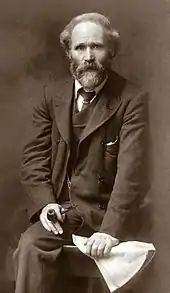
The influence of the Fabian Society in Britain grew in the British socialist movement in the 1890s, especially within the Independent Labour Party (ILP) founded in 1893.[267] Important ILP members were affiliated with the Fabian Society, including Keir Hardie and Ramsay MacDonald—the future British Prime Minister.[267] Fabian influence in British government affairs also emerged such as Fabian member Sidney Webb being chosen to take part in writing what became the Minority Report of the Royal Commission on Labour.[268] While he was nominally a member of the Fabian Society, Hardie had close relations with certain Fabians such as Shaw while he was antagonistic to others such as the Webbs.[269] As ILP leader, Hardie rejected revolutionary politics while declaring that he believed the party's tactics should be "as constitutional as the Fabians".[269]
Another important Fabian figure who joined the ILP was Robert Blatchford who wrote the work Merrie England (1894) that endorsed municipal socialism.[270] Merrie England was a major publication that sold 750,000 copies within one year.[271] In Merrie England, Blatchford distinguished two types of socialism, namely an ideal socialism and a practical socialism.[272] Blatchford's practical socialism was a state socialism that identified existing state enterprise such as the Post Office run by the municipalities as a demonstration of practical socialism in action while claiming that practical socialism should involve the extension of state enterprise to the means of production as common property of the people.[272] Although endorsing state socialism, Blatchford's Merrie England and his other writings were nonetheless influenced by anarcho-communist William Morris—as Blatchford himself attested to—and Morris' anarcho-communist themes are present in Merrie England.[272] Shaw published the Report on Fabian Policy (1896) that declared: "The Fabian Society does not suggest that the State should monopolize industry as against private enterprise or individual initiative".[273]
Major developments in social democracy as a whole emerged with the ascendance of Eduard Bernstein as a proponent of reformist socialism and an adherent of Marxism.[274] Bernstein had resided in Britain in the 1880s at the time when Fabianism was arising and is believed to have been strongly influenced by Fabianism.[275] However, he publicly denied having strong Fabian influences on his thought.[276] Bernstein did acknowledge that he was influenced by Kantian epistemological scepticism while he rejected Hegelianism. He and his supporters urged the SPD to merge Kantian ethics with Marxian political economy.[277] On the role of Kantian criticism within socialism which "can serve as a pointer to the satisfying solution to our problem", Bernstein argued that "[o]ur critique must be direct against both a scepticism that undermines all theoretical thought, and a dogmatism that relies on ready-made formulas".[277] An evolutionist rather than a revolutionist, his policy of gradualism rejected the radical overthrow of capitalism and advocated legal reforms through legislative democratic channels to achieve socialist objectives—i.e. social democracy must cooperatively work within existing capitalist societies to promote and foster the creation of socialist society.[120] As capitalism grew stronger, Bernstein rejected the view of some orthodox Marxists that socialism would come after a catastrophic crisis of capitalism.[45] He came to believe that rather than socialism developing with a social revolution, capitalism would eventually evolve into socialism through social reforms.[174] Bernstein commended Marx's and Engels' later works which advocated that socialism should be achieved through parliamentary democratic means wherever possible.[274]
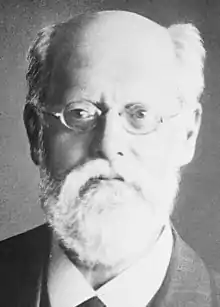
The term revisionist was applied to Bernstein by his critics, who referred to themselves as orthodox Marxists, although Bernstein claimed that his principles were consistent with Marx's and Engels' stances, especially in their later years when they advocated that socialism should be achieved through parliamentary democratic means wherever possible.[274] Bernstein and his faction of revisionists criticized orthodox Marxism and particularly its founder Karl Kautsky for having disregarded Marx's view of the necessity of evolution of capitalism to achieve socialism by replacing it with an either/or polarization between capitalism and socialism, claiming that Kautsky disregarded Marx's emphasis on the role of parliamentary democracy in achieving socialism as well as criticizing Kautsky for his idealization of state socialism.[278] Despite Bernstein and his revisionist faction's accusations, Kautsky did not deny a role for democracy in the achievement of socialism as he argued that Marx's dictatorship of the proletariat was not a form of government that rejected democracy as critics had claimed it was, but rather it was a state of affairs that Marx expected would arise should the proletariat gain power and be faced with fighting a violent reactionary opposition.[246]
Bernstein had held close association to Marx and Engels, but he saw flaws in Marxian thinking and began such criticism when he investigated and challenged the Marxian materialist theory of history.[279] He rejected significant parts of Marxian theory that were based upon Hegelian metaphysics and also rejected the Hegelian dialectical perspective.[280] Bernstein distinguished between early Marxism as being its immature form as exemplified by The Communist Manifesto, written by Marx and Engels in their youth, that he opposed for what he regarded as its violent Blanquist tendencies; and later Marxism as being its mature form that he supported.[281] Bernstein declared that the massive and homogeneous working class claimed in The Communist Manifesto did not exist. Contrary to claims of a proletarian majority emerging, the middle class was growing under capitalism and not disappearing as Marx had claimed. Bernstein noted that rather than the working class being homogeneous, it was heterogeneous, with divisions and factions within it, including socialist and non-socialist trade unions. In his work Theories of Surplus Value, Marx himself later in his life acknowledged that the middle class was not disappearing, but his acknowledgement of this error is not well known due to the popularity of The Communist Manifesto and the relative obscurity of Theories of Surplus Value.[282]
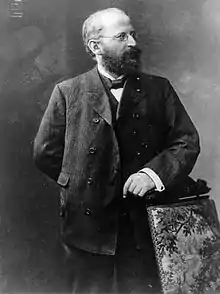
Bernstein criticized Marxism's concept of "irreconciliable class conflicts" and Marxism's hostility to liberalism.[283] He challenged Marx's position on liberalism by claiming that liberal democrats and social democrats held common grounds that he claimed could be utilized to create a "socialist republic".[283] He believed that economic class disparities between the bourgeoisie and the proletariat would gradually be eliminated through legal reforms and economic redistribution programs.[283] Bernstein rejected the Marxian principle of dictatorship of the proletariat, claiming that gradualist democratic reforms would improve the rights of the working class.[284] According to Bernstein, social democracy did not seek to create a socialism separate from bourgeois society, but it instead sought to create a common development based on Western humanism.[45] The development of socialism under social democracy does not seek to rupture existing society and its cultural traditions, but rather to act as an enterprise of extension and growth.[165] Furthermore, he believed that class cooperation was a preferable course to achieve socialism than class conflict.[285]
Bernstein responded to critics that he was not destroying Marxism and instead claimed he was modernizing it as it was required "to separate the vital parts of Marx's theory from its outdated accessories". He asserted his support for the Marxian conception of a "scientifically based" socialist movement and said that such a movement's goals must be determined in accordance with "knowledge capable of objective proof, that is, knowledge which refers to, and conforms with, nothing but empirical knowledge and logic".[286] Bernstein was also strongly opposed to dogmatism within the Marxist movement. Despite embracing a mixed economy, Bernstein was sceptical of welfare state policies, believing them to be helpful, but ultimately secondary to the main social-democratic goal of replacing capitalism with socialism, fearing that state aid to the unemployed might lead to the sanctioning of a new form of pauperism.[287]

Representing revolutionary socialism, Rosa Luxemburg staunchly condemned Bernstein's revisionism and reformism for being based on "opportunism in social democracy". Luxemburg likened Bernstein's policies to that of the dispute between Marxists and the opportunistic Praktiker ("pragmatists"). She denounced Bernstein's evolutionary socialism for being a "petty-bourgeois vulgarization of Marxism" and claimed that Bernstein's years of exile in Britain had made him lose familiarity with the situation in Germany, where he was promoting evolutionary socialism.[288] Luxemburg sought to maintain social democracy as a revolutionary Marxist creed.[286] Both Kautsky and Luxemburg condemned Bernstein's philosophy of science as flawed for having abandoned Hegelian dialectics for Kantian philosophical dualism. Russian Marxist George Plekhanov joined Kautsky and Luxemburg in condemning Bernstein for having a neo-Kantian philosophy.[286] Kautsky and Luxemburg contended that Bernstein's empiricist viewpoints depersonalized and dehistoricized the social observer and reducing objects down to facts. Luxemburg associated Bernstein with ethical socialists who she identified as being associated with the bourgeoisie and Kantian liberalism.[289]
In his introduction to the 1895 edition of Marx's The Class Struggles in France, Engels attempted to resolve the division between gradualist reformists and revolutionaries in the Marxist movement by declaring that he was in favour of short-term tactics of electoral politics that included gradualist and evolutionary socialist measures while maintaining his belief that revolutionary seizure of power by the proletariat should remain a goal. In spite of this attempt by Engels to merge gradualism and revolution, his effort only diluted the distinction of gradualism and revolution and had the effect of strengthening the position of the revisionists.[290] Engels' statements in the French newspaper Le Figaro in which he wrote that "revolution" and the "so-called socialist society" were not fixed concepts, but rather constantly changing social phenomena and argued that this made "us socialists all evolutionists", increased the public perception that Engels was gravitating towards evolutionary socialism.[144] Engels also argued that it would be "suicidal" to talk about a revolutionary seizure of power at a time when the historical circumstances favoured a parliamentary road to power that he predicted could bring "social democracy into power as early as 1898".[144] Engels' stance of openly accepting gradualist, evolutionary and parliamentary tactics while claiming that the historical circumstances did not favour revolution caused confusion.[144] Bernstein interpreted this as indicating that Engels was moving towards accepting parliamentary reformist and gradualist stances, but he ignored that Engels' stances were tactical as a response to the particular circumstances and that Engels was still committed to revolutionary socialism.[144]
Engels was deeply distressed when he discovered that his introduction to a new edition of The Class Struggles in France had been edited by Bernstein and Kautsky in a manner which left the impression that he had become a proponent of a peaceful road to socialism. While highlighting The Communist Manifesto's emphasis on winning as a first step the "battle of democracy", Engels also wrote to Kautsky the following on 1 April 1895, four months before his death:
I was amazed to see today in the Vorwärts an excerpt from my 'Introduction' that had been printed without my knowledge and tricked out in such a way as to present me as a peace-loving proponent of legality quand même.[nb 7] Which is all the more reason why I should like it to appear in its entirety in the Neue Zeit in order that this disgraceful impression may be erased. I shall leave Liebknecht in no doubt as to what I think about it and the same applies to those who, irrespective of who they may be, gave him this opportunity of perverting my views and, what's more, without so much as a word to me about it.[291]
After delivering a lecture in Britain to the Fabian Society titled "On What Marx Really Taught" in 1897, Bernstein wrote a letter to the orthodox Marxist August Bebel in which he revealed that he felt conflicted with what he had said at the lecture as well as revealing his intentions regarding revision of Marxism.[292] What Bernstein meant was that he believed that Marx was wrong in assuming that the capitalist economy would collapse as a result of its internal contradictions as by the mid-1890s there was little evidence of such internal contradictions causing this to capitalism.[292] In practice, the SPD "behaved as a Revisionist party and, at the same time, to condemn Revisionism; it continued to preach revolution and to practice reform", notwithstanding its "doctrinal Marxism". The SPD became a party of reform, with social democracy representing "a party that strives after the socialist transformation of society by the means of democratic and economic reforms". This has been described as central to the understanding of 20th-century social democracy.[245]
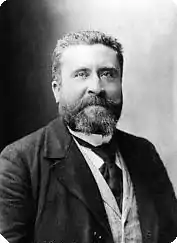
The dispute over policies in favour of reform or revolution dominated discussions at the 1899 Hanover Party Conference of the Socialist Workers' Party of Germany (SAPD). This issue had become especially prominent with the Millerand affair in France in which Alexandre Millerand of the Independent Socialists joined the non-socialist and liberal government of Prime Minister Waldeck-Rousseau without seeking support from his party's leadership.[288] Millerand's actions provoked outrage amongst revolutionary socialists within the Second International, including the anarchist left and Jules Guesde's revolutionary Marxists.[288] In response to these disputes over reform or revolution, the 1900 Paris Congress of the Second International declared a resolution to the dispute in which Guesde's demands were partially accepted in a resolution drafted by Kautsky that declared that overall socialists should not take part in a non-socialist government, but he provided exceptions to this rule where necessary to provide the "protection of the achievements of the working class".[288]
Another prominent figure who influenced social democracy was French revisionist Marxist and reformist socialist Jean Jaurès. During the 1904 Congress of the Second International, Jaurès challenged orthodox Marxist August Bebel, the mentor of Kautsky, over his promotion of monolithic socialist tactics. He claimed that no coherent socialist platform could be equally applicable to different countries and regions due to different political systems in them, noting that Bebel's homeland of Germany at the time was very authoritarian and had limited parliamentary democracy.[293] Jaurès compared the limited political influence of socialism in government in Germany to the substantial influence that socialism had gained in France due to its stronger parliamentary democracy. He claimed that the example of the political differences between Germany and France demonstrated that monolithic socialist tactics were impossible, given the political differences of various countries.[293] Meanwhile, the Australian Labor Party formed the world's first labour party government as well as the world's first social-democratic government at a national level in 1910. Previously, Chris Watson was prime minister for a few months in 1904, representing the first socialist democratically elected as the head of government.[294]
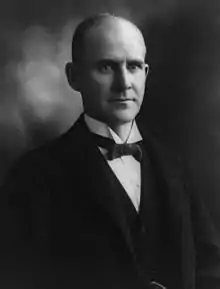
In spite of the two Red Scare periods which substantially hindered the development of the socialist movement,[103] left-wing parties and labour and trade union movements which advocated or supported social-democratic policies have been popular and exerted their influence in American politics.[295] These included the progressive movement and its namesake parties of 1912,[296] 1924[297] and 1948,[298] with the Progressive presidential campaign of former Republican Theodore Roosevelt winning 27.4% of the popular vote, compared to the Republican campaign of President William Howard Taft's 23.2% in the 1912 presidential election which was ultimately won by the progressive Democratic candidate Woodrow Wilson,[nb 8] making Roosevelt the only third party presidential nominee in American history to finish with a higher share of the popular vote than a major party's presidential nominee.[299] Furthermore, the city of Milwaukee has been led by a series of democratic socialist mayors from the Socialist Party of America, namely Frank Zeidler, Emil Seidel and Daniel Hoan.[300]
Socialist Party of America presidential candidate Eugene V. Debs obtained 5.99% of the popular vote in the 1912 presidential election, even managing to win nearly one million votes in the 1920 presidential election, despite Debs himself being imprisoned for alleged sedition at that time due to his opposition to World War I.[300] While Wilson's philosophy of New Freedom was largely individualistic, Wilson's actual program resembled the more paternalistic ideals of Theodore Roosevelt ideas such that of New Nationalism, an extension of his earlier philosophy of the Square Deal, excluding the notion of reining in judges.[301] In addition, Robert M. La Follette and Robert M. La Follette Jr. dominated Wisconsin's politics from 1924 to 1934.[302] This included sewer socialism,[303] an originally pejorative term for the socialist movement that centered in Wisconsin from around 1892 to 1960.[304] It was coined by Morris Hillquit at the 1932 Milwaukee convention of the Socialist Party as a commentary on the Milwaukee socialists and their perpetual boasting about the excellent public sewer system in the city. Hillquit was running against Milwaukee mayor Dan Hoan for the position of National Chairman of the Socialist Party at the 1932 convention and the insult may have sprung up in that context.[305]
World War I, revolutions and counter-revolutions (1914–1929)
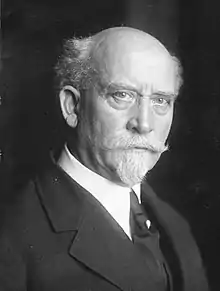
As tensions between Europe's Great Powers escalated in the late 19th and early 20th centuries, Bernstein feared that Germany's arms race with other powers was increasing the possibility of a major European war.[306] Bernstein's fears were ultimately proven to be prophetic when the outbreak of World War I occurred on 27 July 1914, just a month prior the assassination of Archduke Franz Ferdinand.[306] Immediately after the outbreak of World War I, Bernstein travelled from Germany to Britain to meet with Labour Party leader Ramsay MacDonald. While Bernstein regarded the outbreak of the war with great dismay and although the two countries were at war with one another, he was honoured at the meeting.[307] In spite of Bernstein's and other social democrats' attempts to secure the unity of the Second International, with national tensions increasing between the countries at war, the Second International collapsed in 1914.[306] Anti-war members of the SPD refused to support finances being given to the German government to support the war.[306] However, a nationalist-revisionist faction of SPD members led by Friedrich Ebert, Gustav Noske and Philipp Scheidemann supported the war, arguing that Germany had the "right to its territorial defense" from the "destruction of Tsarist despotism".[308]
The SPD's decision to support the war, including Bernstein's decision to support it, was heavily influenced by the fact that the German government lied to the German people as it claimed that the only reason Germany had declared war on Russia was because Russia was preparing to invade East Prussia when in fact this was not the case.[309] Jaurès opposed France's intervention in the war and took a pacifist stance, but he was soon assassinated on 31 July 1914 by French nationalist Raoul Villain.[308] Bernstein soon resented the war and by October 1914 was convinced of the German government's war guilt and contacted the orthodox Marxists of the SPD to unite to push the SPD to take an anti-war stance.[308] Kautsky attempted to put aside his differences with Bernstein and join forces in opposing the war and Kautsky praised him for becoming a firm anti-war proponent, saying that although Bernstein had previously supported civic and liberal forms of nationalism, his committed anti-war position made him the "standard-bearer of the internationalist idea of social democracy".[310] The nationalist position by the SPD leadership under Ebert refused to rescind.[310]
.jpg.webp)
In Britain, the British Labour Party became divided on the war. Labour Party leader Ramsay MacDonald was one of a handful of British MPs who had denounced Britain's declaration of war on Germany. MacDonald was denounced by the pro-war press on accusations that he was pro-German and a pacifist, both charges that he denied.[311] In response to pro-war sentiments in the Labour Party, MacDonald resigned from being its leader and associated himself with the Independent Labour Party. Arthur Henderson became the new leader of the Labour Party and served as a cabinet minister in prime minister Asquith's war government. After the February Revolution of 1917 in Russia in which the Tsarist regime in Russia was overthrown, MacDonald visited the Russian Provisional Government in June 1917, seeking to persuade Russia to oppose the war and seek peace. His efforts to unite the Russian Provisional Government against the war failed after Russia fell back into political violence resulting in the October Revolution in which the Bolsheviks led Vladimir Lenin's rise to power.[312]
Although MacDonald critically responded to the Bolsheviks' political violence and rise to power by warning of "the danger of anarchy in Russia", he gave political support to the Bolshevik regime until the end of the war because he thought that a democratic internationalism could be revived.[313] The British Labour Party's trade union affiliated membership soared during World War I. With the assistance of Sidney Webb, Henderson designed a new constitution for the Labour Party in which it adopted a strongly left-wing platform in 1918 to ensure that it would not lose support to the newly founded Communist Party of Great Britain, exemplified by Clause IV of the constitution.[314]
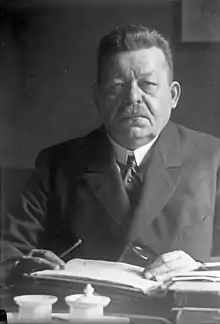
The overthrow of the tsarist regime in Russia in February 1917 impacted politics in Germany as it ended the legitimation used by Ebert and other pro-war SPD members that Germany was in the war against a reactionary Russian government. With the overthrow of the tsar and revolutionary socialist agitation increased in Russia, such events influenced socialists in Germany.[170] With rising bread shortages in Germany amid war rationing, mass strikes occurred beginning in April 1917 with 300,000 strikers taking part in a strike in Berlin. The strikers demanded bread, freedom, peace and the formation of workers' councils as was being done in Russia. Amidst the German public's uproar, the SPD alongside the Progressives and the Catholic labour movement in the Reichstag put forward the Peace Resolution on 19 July 1917 that called for a compromise peace to end the war which was passed by a majority of members of the Reichstag.[170] The German High Command opposed the Peace Resolution, but it did seek to end the war with Russia and presented the Treaty of Brest-Litovsk to the Bolshevik government in 1918 that agreed to the terms and the Reichstag passed the treaty which included the support of the SPD, the Progressives and the Catholic political movement.[170]
By late 1918, the war situation for Germany had become hopeless and Kaiser Wilhelm II was pressured to make peace. Wilhelm II appointed a new cabinet that included SPD members. At the same time, the Imperial Naval Command was determined to make a heroic last stand against the British Royal Navy. On 24 October 1918, it issued orders for the German Navy to depart to confront, but the sailors refused, resulting in the Kiel mutiny.[315] The Kiel mutiny resulted in revolution. Faced with military failure and revolution, Prince Maximilian of Baden resigned, giving SPD leader Ebert the position of Chancellor. Wihelm II abdicated the German throne immediately afterwards and the German High Command officials Paul von Hindenburg and Erich Ludendorff resigned whilst refusing to end the war to save face, leaving the Ebert government and the SPD-majority Reichstag to be forced to make the inevitable peace with the Allies and take the blame for having lost the war. With the abdication of Wilhelm II, Ebert declared Germany to be a republic and signed the armistice that ended World War I on 11 November 1918.[315] The new social democratic government in Germany faced political violence in Berlin by a movement of communist revolutionaries known as the Spartacist League, who sought to repeat the feat of Lenin and the Bolsheviks in Russia by overthrowing the German government.[316] Tensions between the governing majority of Social Democrats led by Ebert versus the strongly left-wing elements of the Independent Social Democratic Party (USPD) and communists over Ebert's refusal to immediately reform the German Army resulted in the January rising by the newly formed Communist Party of Germany (KPD) and the USPD which saw communists mobilizing a large workers' demonstration.[315] The SPD responded by holding a counter-demonstration that was effective in demonstrating support for the government and the USPD soon withdrew its support for the rising.[315] However, the communists continued to revolt and between 12 and 28 January 1919 communist forces had seized control of several government buildings in Berlin. Ebert responded by requesting that defense minister Gustav Noske take charge of loyal soldiers to fight the communists and secure the government.[316] Ebert was furious with the communists' intransigence and said that he wished "to teach the radicals a lesson they would never forget".[315]

Noske was able to rally groups of mostly reactionary former soldiers, known as the Freikorps, who were eager to fight the communists. The situation soon went completely out of control when the recruited Freikorps went on a violent rampage against workers and murdered the communist leaders Karl Liebknecht and Rosa Luxemburg. The atrocities by the government-recruited Freikorps against the communist revolutionaries badly tarnished the reputation of the SPD and strengthened the confidence of reactionary forces.[315] In spite of this, the SPD was able to win the largest number of seats in the 1919 federal election and Ebert was elected president of Germany. However, the USPD refused to support the government in response to the atrocities committed by the SPD government-recruited Freikorps.[315]
Due to the unrest in Berlin, the drafting of the constitution of the new German republic was undertaken in the city of Weimar and the following political era is referred to as the Weimar Republic. Upon founding the new government, President Ebert cooperated with liberal members of his coalition government to create the Weimar constitution and sought to begin a program of nationalization of some sectors of the economy. Political unrest and violence continued and the government's continued reliance on the help of the far-right and counter-revolutionary Freikorps militias to fight the revolutionary Spartacists further alienated potential left-wing support for the SPD.[317] The SPD coalition government's acceptance of the harsh peace conditions of the Treaty of Versailles in June 1919 infuriated the German right, including the Freikorps that had previously been willing to cooperate with the government to fight the Spartacists.[317] In March 1920, a group of right-wing militarists led by Wolfgang Kapp and former German military chief-of-staff Erich Ludendorff initiated a briefly successful putsch against the German government in what became known as the Kapp Putsch, but the putsch ultimately failed and the government was restored. In the 1920 German federal election, the SPD's share of the vote significantly declined due to their previous ties to the Freikorps.[317]

After World War I, several attempts were made at a global level to refound the Second International that collapsed amidst national divisions in the war. The Vienna International formed in 1921 attempted to end the rift between reformist socialists, including social democrats; and revolutionary socialists, including communists, particularly the Mensheviks.[318] However, a crisis soon erupted which involved the new country of Georgia led by a social-democratic government led by president Noe Zhordania that had declared itself independent from Russia in 1918 and whose government had been endorsed by multiple social-democratic parties.[319] At the founding meeting of the Vienna International, the discussions were interrupted by the arrival of a telegram from Zhordania who said that Georgia was being invaded by Bolshevik Russia. Delegates attending the International's founding meeting were stunned, particularly the Bolshevik representative from Russia Mecheslav Bronsky, who refused to believe this and left the meeting to seek confirmation of this. Upon confirmation, Bronsky did not return to the meeting.[319]
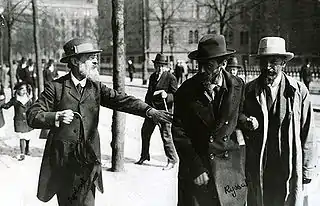
The overall response from the Vienna International was divided. The Mensheviks demanded that the Vienna International immediately condemn Russia's aggression against Georgia, but the majority as represented by German delegate Alfred Henke sought to exercise caution and said that the delegates should wait for confirmation.[318] Russia's invasion of Georgia completely violated the non-aggression treaty signed between Lenin and Zhordania as well as violating Georgia's sovereignty by annexing Georgia directly into the Russian Soviet Federated Socialist Republic. Tensions between Bolsheviks and social democrats worsened with the Kronstadt rebellion.[319] This was caused by unrest among leftists against the Bolshevik government in Russia. Russian social democrats distributed leaflets calling for a general strike against the Bolshevik regime and the Bolsheviks responded by forcefully repressing the rebels.[320]
Relations between the social-democratic movement and Bolshevik Russia descended into complete antagonism in response to the Russian famine of 1921 and the Bolsheviks' violent repression of opposition to their government. Multiple social-democratic parties were disgusted with Russia's Bolshevik regime, particularly Germany's SPD and the Netherlands' Social Democratic Workers' Party (SDAP) that denounced the Bolsheviks for defiling socialism and declared that the Bolsheviks had "driven out the best of our comrades, thrown them into prison and put them to death".[167] In May 1923, social democrats united to found their own international, the Labour and Socialist International (LSI), founded in Hamburg, Germany. The LSI declared that all its affiliated political parties would retain autonomy to make their own decisions regarding internal affairs of their countries, but that international affairs would be addressed by the LSI.[318] The LSI addressed the issue of the rise of fascism by declaring the LSI to be anti-fascist.[321] In response to the outbreak of the Spanish Civil War in 1936 between the democratically elected Republican government versus the authoritarian right-wing Nationalists led by Francisco Franco with the support of Fascist Italy and Nazi Germany, the Executive Committee of the LSI declared not only its support for the Spanish Republic, but also that it supported the Spanish government having the right to purchase arms to fight Franco's Nationalist forces. LSI-affiliated parties, including the British Labour Party, declared their support for the Spanish Republic.[322] The LSI was criticized on the left for failing to put its anti-fascist rhetoric into action.[321]
Great Depression era and World War II (1929–1945)
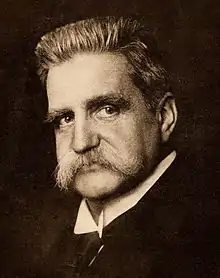
The stock market crash of 1929 that began an economic crisis in the United States that globally spread and became the Great Depression profoundly affected economic policy-making.[323] The collapse of the gold standard and the emergence of mass unemployment resulted in multiple governments recognizing the need for macroeconomic state intervention to reduce unemployment as well as economic intervention to stabilize prices, a proto-Keynesianism that John Maynard Keynes himself would soon publicly endorse.[324] Multiple social-democratic parties declared the need for substantial investment in economic infrastructure projects to respond to unemployment and creating social control over currency flow. Furthermore, social-democratic parties declared that the Great Depression demonstrated the need for substantial macroeconomic planning by the state while their free market opponents staunchly opposed this.[325] Attempts by social-democratic governments to achieve this were unsuccessful due to the ensuing political instability in their countries caused by the depression. The British Labour Party became internally split over said policies while Germany's SPD government did not have the time to implement such policies as Germany's politics degenerated into violent civil unrest pitting the left against the right in which the Nazi Party rose to power in January 1933 and violently dismantled parliamentary democracy for the next twelve years.[323]
Hjalmar Branting, leader of the Swedish Social Democratic Party (SAP) from its founding to his death in 1925, asserted: "I believe that one benefits the workers so much more by forcing through reforms which alleviate and strengthen their position, than by saying that only a revolution can help them".[326] A major development for social democracy was the victory of several social-democratic parties in Scandinavia, particularly the SAP in the 1920 general election.[327] Elected to a minority government, the SAP created a Socialization Committee that supported a mixed economy combining the best of private initiative with social ownership or control, supporting a substantial socialization "of all necessary natural resources, industrial enterprises, credit institutions, transportation and communication routes" that would be gradually transferred to the state.[328] It permitted private ownership of the means of production outside of these areas.[328]
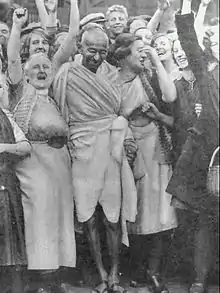
In 1922, Ramsay MacDonald returned to the leadership of the Labour Party after his brief tenure in the Independent Labour Party. In the 1924 general election, the Labour Party won a plurality of seats and was elected as a minority government, but required assistance from the Liberal Party to achieve a majority in parliament. Opponents of Labour falsely accused the party of Bolshevik sympathies. Prime minister MacDonald responded to these allegations by stressing the party's commitment to reformist gradualism and openly opposing the radical wing in the party.[329] MacDonald emphasized that the Labour minority government's first and foremost commitment was to uphold democratic and responsible government over all other policies. MacDonald emphasized this because he knew that any attempt to pass major socialist legislation in a minority government would endanger the new government as it would be opposed and blocked by the Conservatives and the Liberals, who together held a majority of seats. Labour had risen to power in the aftermath of Britain's severe recession of 1921–1922.[330]
With the economy beginning to recover, British trade unions demanded that their wages be restored from the cuts they took in the recession. The trade unions soon became deeply dissatisfied with the MacDonald government and labour unrest and threat of strikes arose in transportation sector, including docks and railways. MacDonald viewed the situation as a crisis, consulting the unions in advance to warn them that his government would have to use strikebreakers if the situation continued. The anticipated clash between the government and the unions was averted, but the situation alienated the unions from the MacDonald government, whose most controversial action was having Britain recognize the Soviet Union in February 1924. The British conservative tabloid press, including the Daily Mail, used this to promote a red scare by claiming that the Labour government's recognition of the Soviet Union proved that Labour held pro-Bolshevik sympathies.[330] Labour lost the 1924 general election and a Conservative government was elected. Although MacDonald faced multiple challenges to his leadership of the party, the Labour Party stabilized as a capable opposition to the Conservative government by 1927. MacDonald released a new political programme for the party titled Labour and the Nation (1928). Labour returned to government in 1929, but it soon had to deal with the economic catastrophe of the stock market crash of 1929.[330]

In the 1920s, SPD policymaker and Marxist Rudolf Hilferding proposed substantial policy changes in the SPD as well as influencing social-democratic and socialist theory. Hilferding was an influential Marxian socialist both inside the social democratic movement and outside, with his pamphlet titled Imperialism influencing Lenin's own conception of imperialism in the 1910s.[331] Prior to the 1920s, Hilferding declared that capitalism had evolved beyond what had been laissez-faire capitalism into what he called organized capitalism. Organized capitalism was based upon trusts and cartels controlled by financial institutions that could no longer make profit within their countries' national boundaries and therefore needed to export to survive, resulting in support for imperialism.[331] Hilferding described that while early capitalism promoted itself as peaceful and based on free trade, the era of organized capitalism was aggressive and said that "in the place of humanity there came the idea of the strength and power of the state". He said that this had the consequence of creating effective collectivization within capitalism and had prepared the way for socialism.[332]
Originally, Hilferding's vision of a socialism replacing organized capitalism was highly Kautskyan in assuming an either/or perspective and expecting a catastrophic clash between organized capitalism versus socialism. By the 1920s, Hilferding became an adherent to promoting a gradualist evolution of capitalism into socialism. He then praised organized capitalism for being a step towards socialism, saying at the SPD congress in 1927 that organised capitalism is nothing less than "the replacement of the capitalist principle of free competition by the socialist principle of planned production". He went on to say that "the problem is posed to our generation: with the help of the state, with the help of conscious social direction, to transform the economy organized and led by capitalists into an economy directed by the democratic state".[332]
By the 1930s, social democracy became seen as overwhelmingly representing reformist socialism and supporting liberal democracy,[122] influenced by Carlo Rosselli, an anti-fascist and social democrat in the liberal socialist tradition.[124] Despite advocating reformism rather than revolution as means for socialism, those social democrats had supported political revolutions to establish liberal democracy such as in Russia and social-democratic parties both in exile and in parliaments supported the forceful overthrow of fascist regimes such as in Germany, Italy and Spain. In the 1930s, the SPD began to transition away from revisionist Marxism towards liberal socialism. After the party was banned by the Nazis in 1933, the SPD acted in exile through Sopade.[333] In 1934, the Sopade began to publish material that indicated that the SPD was turning towards liberal socialism. Curt Geyer, who was a prominent proponent of liberal socialism within the Sopade, declared that Sopade represented the tradition of Weimar Republic social democracy, liberal-democratic socialism and stated that the Sopade had held true to its mandate of traditional liberal principles combined with the political realism of socialism.[334] Willy Brandt is a social democrat that has been identified as a liberal socialist.[335]

The only social-democratic governments in Europe that remained by the early 1930s were in Scandinavia.[323] In the 1930s, several Swedish social-democratic leadership figures, including former Swedish prime minister and secretary and chairman of the Socialization Committee Rickard Sandler and Nils Karleby, rejected earlier SAP socialization policies pursued in the 1920s for being too extreme.[328] Karleby and Sandler developed a new conception of social democracy known as the Nordic model which called for gradual socialization and redistribution of purchasing power, provision of educational opportunity and support of property rights. The Nordic model would permit private enterprise on the condition that it adheres to the principle that the resources it disposes are in reality public means and would create of a broad category of social welfare rights.[336]
The new SAP government of 1932 replaced the previous government's universal commitment to a balanced budget with a Keynesian-like commitment which in turn was replaced with a balanced budget within a business cycle. Whereas the 1921–1923 SAP governments had run large deficits, the new SAP government reduced Sweden's budget deficit after a strong increase in state expenditure in 1933 and the resulting economic recovery. The government had planned to eliminate Sweden's budget deficit in seven years, but it took only three years to eliminate the deficit and Sweden had a budget surplus from 1936 to 1938. However, this policy was criticized because major unemployment still remained a problem in Sweden, even when the budget deficit had been eliminated.[337]

In the Americas, social democracy was rising as a major political force. In Mexico, several social-democratic governments and presidents were elected from the 1920s to the 1930s. The most important Mexican social-democratic government of this time was that led by president Lázaro Cárdenas and the Party of the Mexican Revolution, whose government initiated agrarian reform that broke up vast aristocratic estates and redistributed property to peasants.[338] While deeply committed to social democracy, Cardenas was criticized by his left-wing opponents for being pro-capitalist due to his personal association with a wealthy family and for being corrupt due to his government's exemption from agrarian reform of the estate held by former Mexican president Álvaro Obregón. Political violence in Mexico escalated in the 1920s after the outbreak of the Cristero War in which far-right reactionary clerics staged a violent insurgency against the left-wing government that was attempting to institute secularization in Mexico.[338]
Cardenas' government openly supported Spain's Republican government while opposing Francisco Franco's Nationalists during the Spanish Civil War and he staunchly asserted that Mexico was progressive and socialist, working with socialists of various types, including communists. Under Cárdenas, Mexico accepted refugees from Spain and communist dissident Leon Trotsky after Joseph Stalin expelled Trotsky and sought to have him and his followers killed.[338] Cárdenas strengthened the rights of Mexico's labour movement, nationalized the property of foreign oil companies (which was later used to create PEMEX, Mexico's national petroleum company) and controversially supported peasants in their struggle against landlords by allowing them to form armed militias to fight the private armies of landlords in the country.[338] Cárdenas' actions deeply outraged rightists and far-right reactionaries as there were fears that Mexico would once again descend into civil war. Subsequently, he stepped down from the Mexican presidency and supported the compromise presidential candidate Manuel Ávila Camacho, who held support from business interests, in order to avoid further antagonizing the right.[338]
Canada and the United States represent an unusual case in the Western world. While having a social-democratic movement, both countries were not governed by a social-democratic party at the federal level.[339] In American politics, democratic socialism became more recently a synonym for social democracy due to social-democratic policies being adopted by progressive intellectuals such as Herbert Croly,[340] John Dewey[341] and Lester Frank Ward[342] as well as liberal politicians such as Franklin D. Roosevelt, Harry S. Truman and Woodrow Wilson, causing the New Deal coalition to be the main entity spearheading left-wing reforms of capitalism, rather than by socialists like elsewhere.[343]
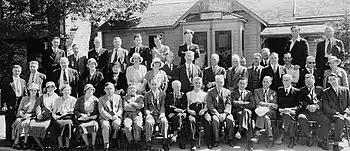
Similarly, the welfare state in Canada was developed by the Liberal Party of Canada.[344] Nonetheless, the social-democratic Co-operative Commonwealth Federation (CCF), the precursor to the social-democratic New Democratic Party (NDP), had significant success in provincial Canadian politics.[110] In 1944, the Saskatchewan CCF formed the first socialist government in North America and its leader Tommy Douglas is known for having spearheaded the adoption of Canada's nationwide system of universal healthcare called Medicare.[345] The NDP obtained its best federal electoral result to date in the 2011 Canadian general election, becoming for the first time the Official Opposition until the 2015 Canadian general election.[346]
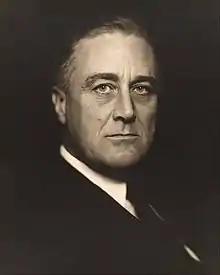
Although well within the liberal and modern liberal American tradition, Franklin D. Roosevelt's more radical, extensive and populist Second New Deal challenged the business community. Conservative Democrats led by Roman Catholic politician and former presidential candidate Al Smith fought back along with the American Liberty League, savagely attacking Roosevelt and equating him and his policies with Karl Marx and Vladimir Lenin.[347] This allowed Roosevelt to isolate his opponents and identify them with the wealthy landed interests that opposed the New Deal, strengthening Roosevelt's political capital and becoming one of the key causes of his landslide victory in the 1936 presidential election. By contrast, already with the passage of the National Labor Relations Act of 1935, also known as the Wagner Act, "the most significant and radical bill of the period", there was an upsurge in labour insurgency and radical organization.[348] Those labour unions were energized by the passage of the Wagner Act, signing up millions of new members and becoming a major backer of Roosevelt's presidential campaigns in 1936, 1940 and 1944.[349]
Conservatives feared the New Deal meant socialism and Roosevelt privately noted in 1934 that the "old line press harps increasingly on state socialism and demands the return to the good old days".[350] In his 1936 Madison Square Garden speech, Roosevelt pledged to continue the New Deal and criticized those who were putting their greed, personal gain and politics over national economic recovery from the Great Depression.[351] In the speech, Roosevelt also described forces which he labeled as "the old enemies of peace: business and financial monopoly, speculation, reckless banking, class antagonism, sectionalism, war profiteering" and went on to claim that these forces were united against his candidacy, that "[t]hey are unanimous in their hate for me — and I welcome their hatred".[352] In 1941, Roosevelt advocated freedom from want and freedom from fear as part of his Four Freedoms goal.[353] In 1944, Roosevelt called for a Second Bill of Rights that would have expanded many social and economic rights for the workers such as the right for every American to have access to a job and universal healthcare. This economic bill of rights was taken up as a mantle by the People's Program for 1944 of the Congress of Industrial Organizations, a platform that has been described as "aggressive social-democratic" for the post-war era.[354]
.jpg.webp)
While criticized by many leftists and hailed by mainstream observers as having saved American capitalism from a socialist revolution,[355] many communists, socialists and social democrats admired Roosevelt and supported the New Deal, including politicians and activists of European social-democratic parties such as the British Labour Party and the French Section of the Workers' International.[354] After initially rejecting the New Deal as part of its ultra-leftist sectarian Third Period that equated social democracy with fascism, the Communist International had to concede and admit the merits of Roosevelt's New Deal by 1935.[356] Although critical of Roosevelt, arguing that he never embraced "our essential [conception of] socialism", Socialist Party leader Norman Thomas viewed Roosevelt's program for reform of the economic system as far more reflective of the Socialist Party platform than of the Democratic Party's platform. Thomas acknowledged that Roosevelt built a welfare state by adopting "ideas and proposals formerly called 'socialist' and voiced in our platforms beginning with Debs in 1900".[354]
Harry S. Truman, Roosevelt's successor after his death on 12 April 1945, called for universal health care as part of the Fair Deal, an ambitious set of proposals to continue and expand the New Deal, but strong and determined conservative opposition from both parties in Congress blocked such policy from being enacted.[357] The details of the plan became the Wagner-Murray-Dingell Bill, but they were never rolled out because the bill never even received a vote in Congress[nb 10] and Truman later described it as the greatest disappointment of his presidency.[358] The British Labour Party released an "exultant statement" upon Truman's upset victory.[354] It stated that "[w]e are not suggesting that Mr. Truman is a Socialist. It is precisely because he is not that his adumbration of these policies is significant. They show that the failure of capitalism to serve the common man [...] is not, after all, something we invented [...] to exasperate Mr. Churchill".[359] Truman argued that socialism is a "scare word" used by Republicans and "the patented trademark of the special interest lobbies" to refer to "almost anything that helps all the people".[360]
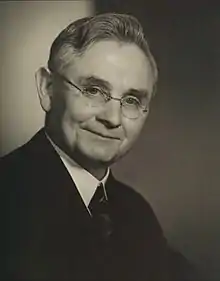
In Oceania, Michael Joseph Savage of the New Zealand Labour Party became prime minister on 6 December 1935, marking the beginning of Labour's first term in office. The new government quickly set about implementing a number of significant reforms, including a reorganization of the social welfare system and the creation of the state housing scheme.[361] Workers benefited from the introduction of the forty hour week and legislation making it easier for unions to negotiate on their behalf.[362] Savage was highly popular with the working classes and his portrait could be found on the walls of many houses around the country.[363] At this time, the Labour Party pursued an alliance with the Māori Rātana movement.[364] Meanwhile, the opposition attacked the Labour Party's more left-wing policies and accused it of undermining free enterprise and hard work. The year after Labour's first win, the Reform Party and the United Party took their coalition to the next step, agreeing to merge with each other. The combined organization was named the National Party and would be Labour's main rival in future years.[365] Labour also faced opposition from within its ranks. While the Labour Party had been explicitly socialist at its inception, it had been gradually drifting away from its earlier radicalism. The death of the party's former leader, the so-called "doctrinaire" Harry Holland, had marked a significant turning point in the party's history. However, some within the party were displeased about the changing focus of the party, most notably John A. Lee, whose views were a mixture of socialism and social credit theory, emerged as a vocal critic of the party's leadership, accusing it of behaving autocratically and of betraying the party's rank and file. After a long and bitter dispute, Lee was expelled from the party, establishing his own breakaway Democratic Labour Party.[366]
Savage died in 1940 and was replaced by Peter Fraser, who became Labour's longest-serving prime minister. Fraser is best known as New Zealand's leader for most of World War II. In the post-war period, ongoing shortages and industrial problems cost Labour considerable popularity and the National Party under Sidney Holland gained ground, although Labour was able to win the 1943 and 1946 general elections. Eventually, Labour was defeated in the 1949 general election.[367] Fraser died shortly afterwards and was replaced by Walter Nash, the long-serving minister of finance.[368]
Cold War era and post-war consensus (1945–1973)
After World War II, a new international organization called the Socialist International was formed in 1951 to represent social democracy and a democratic socialism in opposition to Soviet-style socialism. In the founding Frankfurt Declaration on 3 July, its Aims and Tasks of Democratic Socialism: Declaration of the Socialist International denounced both capitalism and Bolshevism, better known as Marxism–Leninism and referred to as Communism—criticizing the latter in articles 7, 8, 9 and 10.[369]
The rise of Keynesianism in the Western world during the Cold War influenced the development of social democracy.[370] The attitude of social democrats towards capitalism changed as a result of the rise of Keynesianism.[226] Capitalism was acceptable to social democrats only if capitalism's typical crises could be prevented and if mass unemployment could be averted, therefore Keynesianism was believed to be able to provide this.[226] Social democrats came to accept the market for reasons of efficiency and endorsed Keynesianism as that was expected to reconcile democracy and capitalism.[226] According to Michael Harrington, this represented a compromise between capitalism and socialism. While the post-war period of social democracy saw several social-democratic parties renouncing orthodox Marxism, they did not lose their revisionist Marxist character, nor did they stop looking at Marx for inspiration such as in the form of Marxist humanism.[128] However, Marxism was associated with the Marxism–Leninism as practized in the Soviet Union and the Eastern Bloc which social democracy rejected and regarded as "falsely claim[ing] a share in the Socialist tradition. In fact it has distorted that tradition beyond recognition". Rather than a close or dogmatic Marxism, social democracy favours an open and "critical spirit of Marxism".[129]
For Harrington, social democracy believes that capitalism be reformed from within and that gradually a socialist economy will be created. The "social democratic compromise" involving Keynesianism led to a capitalism under socialist governments that would generate such growth that the surplus would make possible "an endless improvement of the quality of social life". According to Harrington, the socialists had become the "normal party of government" in Europe while their "conservative opponents were forced to accept measures they had once denounced on principle". Although this socialist pragmatism led in theory and practice to utopias hostile to one another, they all shared basic assumptions. This "social democratic compromise" goes back to the 1930s, when there was "a ferment in the movement, a break with the old either/or Kautskyan tradition, a new willingness to develop socialist programs that could work with and modify capitalism, but that fell far short of a "revolutionary" transformation".[371]
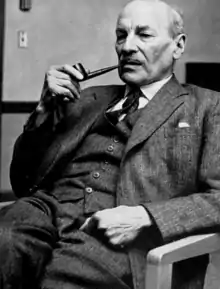
After the 1945 general election, a Labour government was formed by Clement Attlee. Attlee immediately began a program of major nationalization of the economy.[372] From 1945 to 1951, the Labour government nationalized the Bank of England, civil aviation, cable and wireless, coal, transport, electricity, gas and iron and steel.[372] This policy of major nationalizations gained support from the left faction within the Labour Party that saw the nationalizations as achieving the transformation of Britain from a capitalist to socialist economy.[372]
The Labour government's nationalizations were staunchly condemned by the opposition Conservative Party.[372] The Conservatives defended private enterprise and accused the Labour government of intending to create a Soviet-style centrally planned socialist state.[372] Despite these accusations, the Labour government's three Chancellors of the Exchequer, namely Hugh Dalton, Stafford Cripps and Hugh Gaitskell, all opposed Soviet-style central planning.[372] Initially, there were strong direct controls by the state in the economy that had already been implemented by the British government during World War II, but after the war these controls gradually loosened under the Labour government and were eventually phased out and replaced by Keynesian demand management.[372] In spite of opposition by the Conservatives to the nationalizations, all of the nationalizations except for that of coal and iron soon became accepted in a national post-war consensus on the economy that lasted until the Thatcher era in the late 1970s, when the national consensus turned towards support of privatization.[372]
The Labour Party lost the 1951 general election and a Conservative government was formed. There were early major critics of the nationalization policy within the Labour Party in the 1950s. In The Future of Socialism (1956),[156] British social-democratic theorist Anthony Crosland argued that socialism should be about the reforming of capitalism from within.[373] Crosland claimed that the traditional socialist programme of abolishing capitalism on the basis of capitalism inherently causing immiseration had been rendered obsolete by the fact that the post-war Keynesian capitalism had led to the expansion of affluence for all, including full employment and a welfare state.[374] He claimed that the rise of such an affluent society had resulted in class identity fading and as a consequence socialism in its traditional conception as then supported by the British Labour Party was no longer attracting support.[374] Crosland claimed that the Labour Party was associated in the public's mind as having "a sectional, traditional, class appeal" that was reinforced by bickering over nationalization.[374] He argued that in order for the Labour Party to become electable again it had to drop its commitment to nationalization and to stop equating nationalization with socialism.[374] Instead of this, Crosland claimed that a socialist programme should be about support of social welfare, redistribution of wealth and "the proper dividing line between the public and private spheres of responsibility".[374] In post-war Germany, the SPD endorsed a similar policy on nationalizations to that of the British Labour government. SPD leader Kurt Schumacher declared that the SPD was in favour of nationalizations of key industrial sectors of the economy such as banking and credit, insurance, mining, coal, iron, steel, metal-working and all other sectors that were identified as monopolistic or cartelized.[375]
Upon becoming a sovereign state in 1947, India elected the social democratic Indian National Congress into government, with its leader Jawaharlal Nehru becoming the Indian prime minister. Upon his election as prime minister, Nehru declared: "In Europe, we see many countries have advanced very far on the road to socialism. I am not referring to the communist countries but to those which may be called parliamentary, social democratic countries".[376] While in power, Nehru's government emphasized state-guided national development of India and took inspiration from social democracy, although India's newly formed Planning Commission also took inspiration from post-1949 China's agricultural policies.[377]
In 1949, the newly independent and sovereign state of Israel elected the social-democratic Mapai. The party sought the creation of a grassroots mixed economy based on cooperative ownership of the means of production via the kibbutz system while rejecting nationalization of the means of production.[378] The kibbutz are producer cooperatives which have flourished in Israel through government assistance.[379]
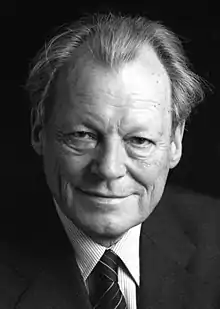
In 1959, the SPD instituted a major policy review with the Godesberg Program.[380] The Godesberg Program eliminated the party's remaining orthodox Marxist policies and the SPD redefined its ideology as freiheitlicher Sozialismus (liberal socialism).[380] With the adoption of the Godesberg Program, the SPD renounced orthodox Marxist determinism and classism. The SPD replaced it with an ethical socialism based on humanism and emphasized that the party was democratic, pragmatic and reformist.[381] The most controversial decision of the Godesberg Program was its declaration stating that private ownership of the means of production "can claim protection by society as long as it does not hinder the establishment of social justice".[172]
By accepting free-market principles, the SPD argued that a truly free market would in fact have to be a regulated market to not to degenerate into oligarchy. This policy also meant the endorsement of Keynesian economic management, social welfare and a degree of economic planning. Some argue that this was an abandonment of the classical conception of socialism as involving the replacement of the capitalist economic system.[172] It declared that the SPD "no longer considered nationalization the major principle of a socialist economy but only one of several (and then only the last) means of controlling economic concentration of power of key industries" while also committing the SPD to an economic stance which promotes "as much competition as possible, as much planning as necessary".[382] The decision to abandon the traditional anti-capitalist policy angered many in the SPD who had supported it.[381]
After these changes, the SPD enacted the two major pillars of what would become the modern social-democratic program, namely making the party a people's party rather than a party solely representing the working class and abandoning remaining Marxist policies aimed at destroying capitalism and replacing them with policies aimed at reforming capitalism.[382] The Godesberg Program divorced its conception of socialism from Marxism, declaring that democratic socialism in Europe was "rooted in Christian ethics, humanism, and classical philosophy".[382] The Godesberg Program has been seen as involving the final victory of the reformist agenda of Eduard Bernstein over the orthodox Marxist agenda of Karl Kautsky.[382] The Godesberg Program was a major revision of the SPD's policies and gained attention from beyond Germany.[381] At the time of its adoption, the stance on the Godesberg Program in neighbouring France was not uniform. While the French Section of the Workers' International was divided on the Godesberg Program, the Unified Socialist Party denounced the Godesberg Program as a renunciation of socialism and an opportunistic reaction to the SPD's electoral defeats.[381]
Economist John Kenneth Galbraith has been described as an "American liberal but European social democrat". For Galbraith, "it was possible to see social democracy as fulfilling its promise to be the extension and successor of liberalism" because "it sought to universalize the benefits of Western societies to all their citizens" and therefore "to make their economies work in the public interest".[383] John F. Kennedy has been called "the first Keynesian president"[384] and socialists such as Michael Harrington were called to assist the Kennedy administration's New Frontier and the Johnson administration's War on Poverty and Great Society social programs during the 1960s.[385] Socialists such as A. Philip Randolph,[386] Bayard Rustin[387] and Martin Luther King Jr.[388] also played important roles in the civil rights movement.[389] The Social Democrats, USA (SDUSA), an association of reformist democratic socialists and social democrats, was founded in 1972.[390] The Socialist Party had stopped running independent presidential candidates and begun reforming itself towards Keynesian social democracy. Consequently, the party's name was changed because it had confused the public. With the name change in place, the SDUSA clarified its vision to Americans who confused social democracy with authoritarian socialism and communism in the form of Marxism–Leninism, harsly opposed by the SDUSA.[391]
_Felipe_Gonz%C3%A1lez_ofrece_una_rueda_de_prensa_junto_al_primer_ministro_de_Suecia._Pool_Moncloa._28_de_septiembre_de_1984_(cropped).jpeg.webp)
During the 1970s, the Swedish Rehn–Meidner model allowed capitalists who were owning highly productive and efficient firms to retain excess profits at the expense of the firms' workers, exacerbating income inequality and causing workers in these firms to agitate for a share of the profits in the 1970s. At the same time, women working in the public sector also began to assert pressure for better wages.[392] Under the leadership of "revolutionary reformist"[393] and self-described democratic socialist[394] prime minister Olof Palme, economist Rudolf Meidner established in 1976 a study committee that came up with a proposal, called the Meidner Plan. It entailed the transferring of the excess profits into investment funds controlled by the workers in the efficient firms, with the intention that the firms would create further employment and pay more workers higher wages rather than unduly increasing the wealth of company owners and managers.[395] Earlier in the 1960s, Einar Gerhardsen established a planning agency and tried to establish a planned economy.[396]
In 1982, the Social Democratic government adopted the Meidner Plan of Meidner to pursue a gradualist socialist agenda to first pursue the enhancement of political democracy and citizenship; second, to pursue entrenching social rights; and third, to then be able to implement economic democracy and social ownership.[397] The plan focused on a twenty percent annual taxation of private enterprise to be used to create investment funds that were to be owned collectively by employees.[398] Meidner stated that his plan was a gradualist socialism that would result in wage-earners gaining a controlling share in their enterprises within twenty-five to fifty years.[398] The Meidner Plan was cancelled after the Social Democrats were defeated in the 1991 general election to a conservative government that scrapped the plan. Capitalists and conservatives had immediately denounced this proposal as "creepy socialism" and launched an unprecedented opposition and smear campaign against it, including the threat of calling off the class compromise established in the 1938 Saltsjöbaden Agreement.[235]
The social democracy practized by parties such as the Singaporean People's Action Party (PAP) during its first few decades in power were of a pragmatic kind as characterized by its rejection of nationalization.[399] Despite this, the PAP still claimed to be a socialist party, pointing out its regulation of the private sector, state intervention in the economy and social policies as evidence of this.[400] The Singaporean prime minister Lee Kuan Yew also stated that he has been influenced by the democratic socialist British Labour Party.[401] Originally, there was infighting between moderates and radicals,[402] including a left-wing and communist wing in the party which saw many imprisoned.[403] While being the most right-wing of the Singaporean parties, the party has been described as centre-left and at times adopted a left tack in certain areas in order to remain electorally dominant.[404]
Response to neoliberalism and Third Way (1973–2007)

The economic crisis in the Western world in the aftermath of the 1973 oil crisis during the mid- to late 1970s resulted in the rise of neoliberalism and several politicians were elected on neoliberal platforms such as British prime minister Margaret Thatcher and United States president Ronald Reagan.[405] The rise in support for neoliberalism raised questions over the political viability of social democracy, with sociologist Ralf Dahrendorf predicting the "end of the social democratic century".[406] In 1985, an agreement was made between several social-democratic parties in the Western Bloc countries of Belgium, Denmark and the Netherlands and with the communist parties of the Eastern Bloc countries of Bulgaria, East Germany and Hungary to have multilateral discussions on trade, nuclear disarmament and other issues.[407]
In 1989, the Socialist International adopted its present Declaration of Principles which addressed issues concerning the internationalization of the economy and defined its interpretation of the nature of socialism. The Declaration of Principles stated that socialist values and vision include "a peaceful and democratic world society combining freedom, justice and solidarity" while arguing that [n]either private nor State ownership by themselves guarantee either economic efficiency or social justice".[408] The Socialist International defined the rights and freedoms it supported as follows: "Socialists protect the inalienable right to life and to physical safety, to freedom of belief and free expression of opinion, to freedom of association and to protection from torture and degradation. Socialists are committed to achieve freedom from hunger and want, genuine social security, and the right to work". It also clarified that it did not promote any fixed and permanent definition for socialism, arguing: "Socialists do not claim to possess the blueprint for some final and fixed society which cannot be changed, reformed or further developed. In a movement committed to democratic self-determination there will always be room for creativity since each people and every generation must set its own goals".[409]
By the 1980s, with the rise of conservative neoliberal politicians such as Ronald Reagan in the United States, Margaret Thatcher in Britain, Brian Mulroney in Canada and Augusto Pinochet in Chile, the Western welfare state was attacked from within, but state support for the corporate sector was maintained.[410] With the fall of Marxism–Leninism in Africa and Eastern Europe, most of those countries adopted liberal democracy and the former ruling parties moved away from Marxism–Leninism and towards social democracy.[411]

The 1989 Socialist International congress was politically significant in that members of the Communist Party of the Soviet Union during the reformist leadership of Mikhail Gorbachev attended the congress. The Socialist International's new Declaration of Principles abandoned previous statements made in the Frankfurt Declaration of 1951 against Soviet-style socialism. After the congress, the Communist Party of the Soviet Union's newspaper Pravda noted that thanks to dialogue between the Soviet Union and the Socialist International since 1979 that the positions of the two organizations on nuclear disarmament issues "today virtually coincide".[407] The Revolutions of 1989 and the resulting collapse of Marxist–Leninist states in Eastern Europe after the end of the Cold War led to the rise of multi-party democracy in many of these countries which resulted in the creation of multiple social-democratic parties. Although the majority of these parties initially did not achieve electoral success, they became a significant part of the political landscape of Eastern Europe. In Western Europe, the prominent Italian Communist Party transformed itself into the post-communist Democratic Party of the Left in 1991.[91]

In the 1990s, the ideology of the Third Way developed and many social democrats became adherents of it. The Third Way has been advocated by its proponents as an alternative to capitalism and what it regards as the traditional forms of socialism (Marxian socialism and state socialism) which Third Way social democrats reject. It officially advocates ethical socialism, reformism and gradualism which includes advocating a humanized version of capitalism, a mixed economy, political pluralism and liberal democracy.[412]
For Giddens and others, there is really no significant difference between revisionism, Lassallian socialism and the Third Way. In each case, they advocated government policies that would immediately help working people rather than revolution and in both cases their critics accused them of having sold out to the establishment and not being real socialists. In particular, the Third Way has been strongly criticized within the social-democratic movement for being neoliberal in nature.[57] Left-wing opponents of the Third Way claim that it is not a form of socialism and that it represents social democrats who responded to the New Right by accepting capitalism.[413] Supporters of Third Way ideals argue that they merely represent a necessary or pragmatic adaptation of social democracy to the realities of the modern world, noting that post-war social democracy thrived during the prevailing international climate of the Bretton Woods consensus which collapsed in the 1970s.[178]
.jpg.webp)
(1997–2007)
When he was a British Labour Party MP, Third Way supporter and former British prime minister Tony Blair wrote in a Fabian pamphlet in 1994 about the existence of two prominent variants of socialism, with one based on a Marxist–Leninist economic determinist and collectivist tradition that he rejected and the other being an ethical socialism that he supported which was based on values of "social justice, the equal worth of each citizen, equality of opportunity, community".[178] New Labour under Blair sought to distance Labour from the conventional definition of socialism[414] and create a new one representing a modern form of liberal-democratic socialism.[415] However, New Labour sought to avoid regular public use of the word socialism even in this new definition, out of concerns that it would remind the British electorate of the strongly left-wing political strategy of the Labour Party in the early 1980s. Later, One Nation Labour[416] was born as a critique of New Labour.[417] It challenged some of the Third Way policy developments created by New Labour while accepting and modifying others.[417] Like New Labour, One Nation Labour advocated a non-conventional definition of socialism, with Miliband endorsing a form of "capitalism that works for the people" for the time being while declaring support for a "form of socialism, which is a fairer, more just, more equal society".[417] Unlike New Labour, One Nation Labour used the term socialism more publicly.[417]
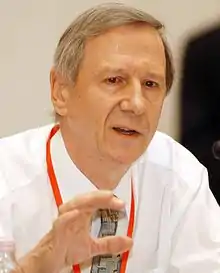
Prominent Third Way proponent Anthony Giddens views conventional socialism as essentially having become obsolete. However, Giddens claims that a viable form of socialism was advocated by Anthony Crosland in his major work The Future of Socialism (1956).[418] He has complimented Crosland as well as Thomas Humphrey Marshall for promoting a viable form of socialism.[419] Giddens views what he considers the conventional form of socialism that defines socialism as a theory of economic management—state socialism—as no longer viable.[420] Giddens rejects what he considers top-down socialism as well as rejecting neoliberalism[412] and criticizes conventional socialism for its common advocacy that socialization of production as achieved by central planning can overcome the irrationalities of capitalism. According to Giddens, this claim "can no longer be defended". He argues that with the collapse of the legitimacy of centrally planned socialization of production, "[w]ith its dissolution, the radical hopes for by socialism are as dead as the Old Conservatism that opposed them". Giddens writes that although there have been proponents of market socialism who have rejected such central planned socialism as well as being resistant to capitalism, "[t]here are good reasons, in my view, to argue that market socialism isn't a realistic possibility". Giddens makes clear that the Third Way as he envisions it is not market socialist, arguing that "[t]here is no Third Way of this sort, and with this realization the history of socialism as the avant-garde of political theory comes to a close".[418]
Giddens contends that Third Way is connected to the legacy of reformist revisionist socialism, writing: "Third way politics stands in the traditions of social democratic revisionism that stretch back to Eduard Bernstein and Karl Kautsky".[36] Giddens commends Crosland's A Future of Socialism for recognizing that socialism cannot be defined merely in terms of a rejection of capitalism because if capitalism did end and was replaced with socialism, then socialism would have no purpose with the absence of capitalism.[179] From Crosland's analysis, Giddens argues that the common characteristic of socialist doctrines is their ethical content, based on the critique of individualism. Giddens defines socialism as "the pursuit of ideas of social cooperation, universal welfare, and equality—ideas brought together by a condemnation of the evils and injustices of capitalism". For Giddens, socialism depends on a belief in "group action and participation" as well as "collective responsibility for social welfare".[179]
.jpg.webp)
Giddens dissociated himself from many of the interpretations of the Third Way made in the sphere of day-to-day politics—including New Labour—as he reiterated that the point was not a succumbing to neoliberalism or the dominance of capitalist markets, but rather to get beyond both market fundamentalism and top-down socialism to make the values of the centre-left count in a globalizing world.[421] However, Paul Cammack has condemned the Third Way as conceived by Giddens as being a complete attack upon the foundations of social democracy and socialism in which Giddens has sought to replace them with neoliberal capitalism.[57] Cammack claims that Giddens devotes a lot of energy into criticizing conventional social democracy and socialism—such as Giddens' claim that conventional socialism has died because Marx's vision of a new economy with wealth spread in an equitable way is not possible—while at the same time making no criticism of capitalism. Cammack condemns Giddens and his Third Way for being anti-social-democratic, anti-socialist and pro-capitalist that he disguises in rhetoric to make it appealing within social democracy.[57]
British political theorist Robert Corfe, a social-democratic proponent of a new socialism free of class-based prejudices, criticized both Marxist classists and Third Way proponents within the Labour Party.[422] Corfe has denounced the Third Way as developed by Giddens for "intellectual emptiness and ideological poverty".[423] Corfe has despondently noted and agreed with former long-term British Labour Party MP Alice Mahon's statement in which she said that "Labour is the party of bankers, not workers. The party has lost its soul, and what has replaced it is harsh, American style politics". Corfe claims that the failure to develop a new socialism has resulted in what he considers the "death of socialism" that left social capitalism as only feasible alternative.[424] Some critics and analysts alike have characterized the Third Way as an effectively neoliberal movement.[425]

Former SPD chairman Oskar Lafontaine condemned then-SPD leader and German Chancellor Gerhard Schröder for his Third Way policies, saying that the SPD under Schröder had adopted a "radical change of direction towards a policy of neoliberalism".[426] After resigning from the SPD, Lafontaine co-founded The Left in 2007.[427] The Left was founded out of a merger of the Party of Democratic Socialism (PDS) and the Labour and Social Justice – The Electoral Alternative (WASG), a breakaway faction from the SPD. The Left has been controversial because as a direct successor to the PDS it is also a direct successor of former East Germany's ruling Marxist–Leninist Socialist Unity Party (SED) that transformed into the PDS after the end of the Cold War. However, the PDS did not continue the SED's policies as the PDS adopted policies to appeal to democratic socialists, feminists, greens and pacifists.[428]
Lafontaine said in an interview that he supports the type of social democracy pursued by Willy Brandt, but he claims that the creation of The Left was necessary because "formerly socialist and social democratic parties" had effectively accepted neoliberalism.[427] The Left grew in strength and in the 2009 federal election gained 11 percent of the vote while the SPD gained 23 percent of the vote.[428] Lafontaine has noted that the founding of The Left in Germany has resulted in emulation in other countries, with several Left parties being founded in Greece, Portugal, Netherlands and Syria.[429] Lafontaine claims that a de facto British left movement exists, identifying the Green Party of England and Wales MEP Caroline Lucas as holding similar values.[430]

Others have claimed that social democracy needs to move past the Third Way, including Olaf Cramme and Patrick Diamond in their book After the Third Way: The Future of Social Democracy in Europe (2012).[431] Cramme and Diamond recognize that the Third Way arose as an attempt to break down the traditional dichotomy within social democracy between state intervention and markets in the economy, but they contend that the 2007–2012 global economic crisis requires that social democracy must rethink its political economy.[432] Cramme and Diamond note that belief in economic planning amongst socialists was strong in the early to mid-20th century, but it declined with the rise of the neoliberal right that attacked economic planning and associated the left with a centralized command economy, conflating it with the administrative-command system and Soviet-type economic planning akin to the Soviet Union and other Marxist–Leninist states. They claim that this formed the foundation of "the Right's moral trap" in which the neoliberal right's attacks on economic-planning policies provokes a defense of such planning by the left as being morally necessary and ends with the right then rebuking such policies as being inherently economically incompetent while presenting itself as the champion of economic competence and responsibility.[432] Cramme and Diamond state that social democracy has five different strategies both to address the economic crisis in global markets at present that it could adopt in response, namely market conforming, market complementing, market resisting, market substituting and market transforming.[433] Cramme and Diamond identify market conforming as being equivalent to British Labour Party politician and former Chancellor of the Exchequer Philip Snowden's desire for a very moderate socialist agenda based above all upon fiscal prudence as Snowden insisted that socialism had to build upon fiscal prudence or else it would not be achieved.[434]
Democratic and market socialists alike have criticized the Third Way for abandoning socialism, arguing that the major reason for the economic shortcomings of Soviet-type economies was their authoritarian nature rather than socialism itself and that it was a failure of a specific model, therefore social democrats should support democratic models of socialism rather than the Third Way. Economists Pranab Bardhan and John Roemer argue that Soviet-type economies failed because they did not create rules and operational criteria for the efficient operation of state enterprises in their administrative, command allocation of resources and commodities and the lack of democracy in the political systems that the Soviet-type economies were combined with. A form of competitive socialism that rejects dictatorship and authoritarian allocation whilst supporting democracy could work and prove superior to free-market capitalism.[435]
Decline and rejection of the Third Way (2007–present)
Beginning in the 2000s, with the global economic crisis in the late 2000s and early 2010s, the social-democratic parties that had dominated some of the post-World War II political landscape in Western Europe were under pressure in some countries to the extent that a commentator in Foreign Affairs called it an "implosion of the centre-left".[233] The Israeli Labor Party went into gradual decline in the early 2000s following the October 2000 riots and the violence of the al-Aqsa Intifada. The first European country that saw a similar development was Greece in the aftermath of the Great Recession and the ongoing Greek government-debt crisis. Support for the Greek social-democratic party PASOK declined from 43.9% in the 2009 Greek legislative election to 4.68% in the January 2015 Greek legislative election. The decline subsequently proved to not be isolated to Greece as it spread to a number of countries in Europe, a phenomenon many observers described as Pasokification.[436]
In 2017, support for social-democratic parties in other countries such as Denmark and Portugal was relatively strong in polls. Moreover, the decline of the social-democratic parties in some countries was accompanied by a surge in the support for other centre-left or left-wing parties such as Syriza in Greece, the Left-Green Movement in Iceland and Podemos in Spain. Several explanations for the European decline have been proposed. Some commentators highlight that the social-democratic support of national fragmentation and labour market deregulation had become less popular among potential voters. Others such as the French political scientist Pierre Manent emphasize the need for social democrats to rehabilitate and reinvigorate the idea of nationhood.[437]
In a 2017 article in The Political Quarterly, Jörg Michael Dostal explains the decline in Germany with electoral disillusionment with Third Way and neoliberal policies, or more specifically Gerhard Schröder's embrace of the Hartz reforms which recommended the privatization and reduction of the welfare state as well as the deregulation of the labour market and curtailing of workers rights. According to Dostal, the SPD subsequently lost half of its former electoral coalition (i.e. blue-collar voters and socially disadvantaged groups) while efforts to attract centrist and middle-class voters failed to produce any compensating gains. Furthermore, the article concludes that the only possible remedy is for the SPD to make efforts to regain former voters by abandoning neoliberalism and offering credible social-welfare and redistributive policies.[438] Earlier in 2016, a research article in Socio-Economic Review found that the longer-term electoral effects of the Hartz plan and Agenda 2010 on relevant voter groups were limited, but that it had helped to entrench The Left as a permanent political force to its left.[439]
After the Labour Party's surprising loss in the 2017 Norwegian parliamentary election, commentators such as the editor of Avisenes Nyhetsbyrå highlight that the party had ignored a strong surge in discontent with mass immigration among potential voters.[440] Hanne Skartveit of Verdens Gang claimed that social democrats have been struggling because the sustainability of the welfare state is challenged by mass immigration. Skarstein emphasize the contrast between social democrats' strong commitment for helping people on the international scene on one side and their strong commitment in favour of welfare policies for the nation's own population on the other.[441]
Spain is one of the countries in which the PSOE, the main social-democratic party, has been governing for a longer period of time than any other party since the transition to democracy in 1977. However, it has also declined like the European social-democratic parties, losing half of its electorate between 2010 and 2015 to Podemos and gaining its worst ever result in the 2015 Spanish general election since the restoration of democracy in Spain. Despite this loss, the PSOE returned to power in June 2018 after the government of Mariano Rajoy was ousted in a vote of no confidence in the aftermath of a corruption scandal, with Pedro Sánchez leading the party. Some authors consider his government the last hope for Europe to retain its social democratic heritage[442] and believe they would act as an example to like-minded politicians in other countries.[443] By 2019 and 2020, Denmark, Finland and Italy saw a return of their main social-democratic party back in power while Portugal, Spain and Sweden confirmed their social-democratic governments.[444] In the case of Italy and Spain, the centre-left parties allied with anti-establishment, populist and other left-leaning parties in coalition governments.[445]

Several social-democratic parties such as the British Labour Party under Jeremy Corbyn have outright rejected the Third Way strategy and moved back to the left on economics and class issues.[446] After running in the 2014 PSOE primary election as a centrist profile, Pedro Sánchez later switched to the left in his successful 2017 bid to return to the PSOE leadership in which he stood for a refoundation of social democracy in order to transition to a post-capitalist society, putting an end to neoliberal capitalism.[447][448] A key personal idea posed in Sánchez's 2019 Manual de Resistencia book is the indissoluble link between social democracy and Europe.[449]
Other parties such as the Danish Social Democrats also became increasingly skeptical of neoliberal mass immigration from a left-wing point of view. The party believes it has had negative impacts for much of the population and it has been seen as a more pressing issue since at least 2001 after the 11 September attacks that has intensified during the 2015 European migrant crisis. The perception of the party being neoliberal and soft on immigration during the era of neoliberal globalization contributed to its poor electoral performance in the early 21st century.[450] In a recent biography, the Danish Social Democrats party leader and prime minister Mette Frederiksen argued: "For me, it is becoming increasingly clear that the price of unregulated globalisation, mass immigration and the free movement of labour is paid for by the lower classes".[451] Frederiksen later shifted her stance on immigration by allowing more foreign labour and reversing plans to hold foreign criminals offshore after winning government.[452] A 2020 study disputed the notion that anti-immigration positions would help social-democratic parties. The study found that "more authoritarian/nationalist and more anti-EU positions are if anything associated with lower rather than greater electoral support for social democratic parties".[453]

In 2016, Senator from Vermont Bernie Sanders, who describes himself as a democratic socialist,[454] made a bid for the Democratic Party presidential candidate, gaining considerable popular support, particularly among the younger generation and working-class Americans,[455] but he ultimately lost the presidential nomination to Hillary Clinton, a centrist candidate.[456] Sanders ran again in the 2020 Democratic Party presidential primaries,[457] briefly becoming the front-runner in February until Super Tuesday in March and suspending his campaign in April.[458] Nonetheless, Sanders would remain on the ballot in states that had not yet voted to influence the Democratic Party's platform as he did in 2016.[459]
Since his praise of the Nordic model indicated focus on social democracy as opposed to views involving social ownership of the means of production,[460] several political commentators have argued that democratic socialism has become a misnomer for social democracy in American politics.[23] Sanders previously advocated for some form of public ownership,[461] supports workplace democracy,[462] an expansion of worker cooperatives[463] and the democratisation of the economy.[464] Sanders' proposed legislation include worker-owned businesses,[465] the Workplace Democracy Act,[466] employee ownership as alternative to corporations[467] and a package to encourage employee-owned companies.[468] While seen as part of the liberal New Deal[469] or social-democratic tradition,[470] Sanders associates the New Deal as part of the socialist tradition[471] and claimed the New Deal's legacy to "take up the unfinished business of the New Deal and carry it to completion".[472]
In an August 2018 poll conducted by Gallup, a majority of Americans under the age of 30 in the United States stated they approved of socialism. 57% of Democratic leaning voters viewed socialism positively and 47% saw capitalism positively. 71% of Republican leaning voters who were polled saw capitalism under a positive light and 16% viewed socialism in a positive light.[473] A June 2019 Harris Poll found that socialism is more popular with women than men, with 55% of women between the ages of 18 and 54 preferring to live in a socialist society while a majority of men surveyed in the poll chose capitalism over socialism.[474] A November 2019 YouGov poll found that 7 out of 10 millennials in the United States would vote for a socialist presidential candidate and 36% had a favorable view of communism.[475] Progressive reforms and social-democratic policies have been proposed, including the United States National Health Care Act[476] to enact universal single-payer health care and the Green New Deal.[477] In November 2018, Alexandria Ocasio-Cortez and Rashida Tlaib, who are members of the Democratic Socialists of America (DSA), a democratic socialist organization which advocates social-democratic reforms that "will weaken the power of corporations and increase the power of working people",[478] were elected to the House of Representatives while eleven DSA candidates were elected to state legislatures.[479]
On 30 November 2018, The Sanders Institute[480] and the Democracy in Europe Movement 2025[481] founded the Progressive International, a political organization which unites social democrats with other democratic socialists, labour unionists and progressive activists.[482]
Legacy
| Corporatism |
|---|
|
| Part of a series on |
| Progressivism |
|---|
|
Social-democratic policies were first adopted in the German Empire between the 1880s and 1890s, when the conservative Chancellor Otto von Bismarck put in place many social welfare proposals initially suggested by the Social Democrats to hinder their electoral success after he instituted the Anti-Socialist Laws, laying the ground of the first modern welfare state.[186] Those policies were dubbed as State Socialism by the liberal opposition, but the term was later accepted and re-appropriated by Bismarck.[483] It was a set of social programs implemented in Germany that were initiated by Bismarck in 1883 as remedial measures to appease the working class and reduce support for socialism and the Social Democrats following earlier attempts to achieve the same objective through Bismarck's Anti-Socialist Laws.[484] This did not prevent the Social Democrats to become the biggest party in parliament by 1912.[485]
Similar policies were later adopted in most of Western Europe, including France and the United Kingdom (the latter in the form of the Liberal welfare reforms),[486] with both socialist and liberal parties adopting those policies.[185] In the United States, the progressive movement, a similar social-democratic movement predominantly influenced more by social liberalism than socialism, supported progressive liberals such as Democratic presidents Woodrow Wilson and Franklin D. Roosevelt, whose New Freedom and New Deal programmes adopted many social-democratic policies.[487] With the Great Depression, economic interventionism and nationalizations became more common worldwide and the post-war consensus until the 1970s saw Keynesian social-democratic and mixed economy policies put in place, leading to the post-World War II boom in which the United States, the Soviet Union, the Western European and East Asian countries experienced unusually high and sustained economic growth, together with full employment. Contrary to early predictions, this period of high economic growth and national development also included many countries that have been devastated by the war such as Japan (Japanese post-war economic miracle), West Germany and Austria (Wirtschaftswunder), South Korea (Miracle of the Han River), France (Trente Glorieuses), Italy (Italian economic miracle) and Greece (Greek economic miracle).[488]
With the 1970s energy crisis, the abandonment of both the gold standard and the Bretton Woods system along with Keynesian social-democratic, mixed-economy policies and the implementation of market-oriented, monetarist and neoliberal policies (privatization, deregulation, free trade, economic globalization and anti-inflationary fiscal policy, among others), the social-democratic welfare state was put in doubt.[489] This caused several social-democratic parties to adopt the Third Way, a centrist ideology combining progressivism and social liberalism with neoliberalism.[490] However, the Great Recession in the late 2000s and early 2010s cast doubts to the so-called Washington Consensus and protests against austerity measures ensued, causing a resurgence of social democratic parties and policies, especially in the United States and the United Kingdom with the rise of politicians such as Bernie Sanders and Jeremy Corbyn, who rejected the Third Way,[491] after the economic recession caused the Pasokification of many social-democratic parties.[436]
The United Nations World Happiness Report shows that the happiest nations are concentrated in social-democratic nations,[492] especially in Northern Europe, where the Nordic model is applied.[493] This is at times attributed to the success of the social-democratic Nordic model in the region, where similar democratic socialist, labourist and social-democratic parties dominated the region's political scene and laid the ground to their universal welfare states in the 20th century.[494] The Nordic countries, including Denmark, Finland, Iceland, Norway and Sweden as well as Greenland and the Faroe Islands, also ranks highest on the metrics of real GDP per capita, economic equality, public health, life expectancy, having someone to count on, perceived freedom to make life choices, generosity, quality of life and human development while countries practicing a neoliberal form of government have registered relatively poorer results.[495]
Similarly, several reports have listed Scandinavian and other social-democratic countries as ranking high on indicators such as civil liberties,[496] democracy,[497] press,[498] labour and economic freedoms,[499] peace[500] and freedom from corruption.[501] Numerous studies and surveys indicate that people tend to live happier lives in countries ruled by social-democratic parties, compared to countries ruled by neoliberal, centrist and right-wing governments.[502]
Criticism
Social democracy is criticized by other socialists because it serves to devise new means to strengthen the capitalist system which conflicts with the socialist goal of replacing capitalism with a socialist system.[503] According to this view, social democracy fails to address the systemic issues inherent in capitalism. The American democratic socialist philosopher David Schweickart contrasts social democracy with democratic socialism by defining the former as an attempt to strengthen the welfare state and the latter as an alternative economic system to capitalism. According to Schweickart, the democratic socialist critique of social democracy is that capitalism can never be sufficiently humanised and that any attempt to suppress its economic contradictions will only cause them to emerge elsewhere. He gives the example that attempts to reduce unemployment too much would result in inflation and too much job security would erode labour discipline.[504] In contrast to social democracy's mixed economy, democratic socialists advocate a post-capitalist economic system based on either a market economy combined with workers' self-management, or on some form of participatory, decentralized planning of the economy.[74]
Marxian socialists argue that social-democratic welfare policies cannot resolve the fundamental structural issues of capitalism such as cyclical fluctuations, exploitation and alienation. Accordingly, social democratic programs intended to ameliorate living conditions in capitalism—such as unemployment benefits and taxation on profits—creates further contradictions by further limiting the efficiency of the capitalist system by reducing incentives for capitalists to invest in further production.[505] The welfare state only serves to legitimize and prolong the exploitative and contradiction-laden system of capitalism to society's detriment. Critics of contemporary social democracy such as Jonas Hinnfors argue that when social democracy abandoned Marxism, it also abandoned socialism and became a liberal capitalist movement, effectively making social democrats similar to non-socialist parties like the Democratic Party in the United States.[506]
Market socialism is also critical of social-democratic welfare states. While one common goal of both concepts is to achieve greater social and economic equality, market socialism does so by changes in enterprise ownership and management whereas social democracy attempts to do so by subsidies and taxes on privately owned enterprises to finance welfare programs. Franklin Delano Roosevelt III (grandson of United States president Franklin D. Roosevelt) and David Belkin criticize social democracy for maintaining a property-owning capitalist class which has an active interest in reversing social-democratic welfare policies and a disproportionate amount of power as a class to influence government policy.[507] The economists John Roemer and Pranab Bardhan point out that social democracy requires a strong labour movement to sustain its heavy redistribution through taxes and that it is idealistic to think such redistribution can be accomplished in other countries with weaker labour movements, noting that social democracy in Scandinavian countries has been in decline as the labour movement weakened.[508]
Some critics claim that social democracy abandoned socialism in the 1930s by endorsing Keynesian welfare capitalism.[509] The democratic socialist political theorist Michael Harrington argues that social democracy historically supported Keynesianism as part of a "social democratic compromise" between capitalism and socialism. While this compromise did not allow for the immediate creation of socialism, it created welfare states and "recognized noncapitalist, and even anticapitalist, principles of human need over and above the imperatives of profit".[140] Social democrats in favour of the Third Way have been accused of having endorsed capitalism, including by anti-Third Way social democrats who have accused Third Way proponents such as Anthony Giddens of being anti-social democratic and anti-socialist in practice.[57]
Social democracy's reformism has been criticized from both the left and right,[510] for if the left was to govern a capitalist economy, it would have to do so according to capitalist, not socialist, logic. This argument was previously echoed by Joseph Schumpeter in Capitalism, Socialism and Democracy (1942), writing: "Socialists had to govern in an essentially capitalist world [...], a social and economic system that would not function except on capitalist lines. [...] If they were to run it, they would have to run it according to its own logic. They would have to "administer" capitalism".[511] Similarly, Irving Kristol argued: "Democratic socialism turns out to be an inherently unstable compound, a contradiction in terms. Every social-democratic party, once in power, soon finds itself choosing, at one point after another, between the socialist society it aspires to and the liberal society that lathered it".[240] Joseph Stalin was a vocal critic of reformist social democrats, later coining the term social fascism to describe social democracy in the 1930s because in this period it embraced a similar corporatist economic model to the model supported by fascism. This view was adopted by the Communist International which argued that capitalist society had entered the Third Period in which a proletarian revolution was imminent, but that it could be prevented by social democrats and other fascist forces.[512]
See also
- Economic progressivism
- History of the Social Democratic Party of Austria
- History of the Social Democratic Party of Germany
- International Group of Democratic Socialists
- List of anti-capitalist and communist parties with national parliamentary representation
- List of democratic socialist parties that have governed
- List of democratic socialist parties and organizations
- List of democratic socialists
- List of Labour parties
- List of left-wing political parties
- List of social democratic parties
- List of social democrats
- Social Democratic Party
- Socialist Party
References
Citations
- Eatwell & Wright 1999, pp. 80–103; Newman 2005, p. 5.
- Wintrop 1983, p. 306; Archer 1995; Jones 2001, p. 737; Ritzer 2004, p. 479.
- Miller 1998, p. 827; Badie, Berg-Schlosser & Morlino 2011, p. 2423; Heywood 2012, p. 128.
- Gombert 2009, p. 8; Sejersted 2011.
- Eatwell & Wright 1999, pp. 81, 100; Pruitt 2019; Berman 2020.
- Williams 1985, p. 289; Foley 1994, p. 23; Eatwell & Wright 1999, p. 80; Busky 2000, p. 8; Sargent 2008, p. 117; Heywood 2012, p. 97; Hain 2015, p. 3.
- Duignan, Kalsang Bhutia & Mahajan 2014.
- Adams 1993, pp. 102–103.
- Weisskopf 1992, p. 10; Miller 1998, p. 827; Jones 2001, p. 1410; Heywood 2012, pp. 125–128.
- Roemer 1994, pp. 25–27; Berman 1998, p. 57; Bailey 2009, p. 77; Lamb 2015, pp. 415–416.
- Weisskopf 1992, p. 10.
- Heywood 2012, p. 97; Hoefer 2013, p. 29.
- Hinchman & Meyer 2007, p. 137.
- Hinchman & Meyer 2007, p. 91; Mathers, Taylor & Upchurch 2009, p. 51.
- Romano 2006, p. 11.
- Steger 1997; Safra 1998, p. 920; Stevens 2000, p. 1504; Duignan, Kalsang Bhutia & Mahajan 2014.
- Aspalter 2001, p. 52.
- Miller 1998, p. 827; Durlauf & Lawrence 2008.
- Eatwell & Wright 1999, p. 80.
- Egle et al. 2008; Kotz 2009; Foster & Tsakiroglou 2014.
- Hinchman & Meyer 2007, p. 112; Badie, Berg-Schlosser & Morlino 2011, p. 2423; Heywood 2012, p. 128.
- Busky 2000, p. 8; Sargent 2008, p. 118; Heywood 2012, p. 97; Hain 2015, p. 3.
- Qiu 2015; Barro 2015; Tupy 2016; Worstall 2016; Cooper 2018; Rodriguez 2018; Levitz, April 2019.
- O'Hara 2003, p. 538.
- Heywood 2012.
- Blume & Durlauf 2016, p. 606.
- Brown, McLean & McMillan 2018.
- Kornai & Yingi 2009, pp. 11–24.
- Ely 1883, pp. 204–205; Eatwell & Wright 1999, p. 80; Lamb 2015, pp. 415–416.
- Ely 1883, p. 204.
- Williams 1985, p. 289.
- Ely 1883, pp. 204–205.
- Sargent 2008, p. 117.
- Busky 2000, p. 8.
- Eatwell & Wright 1999, p. 99.
- Giddens 2003, p. 2.
- Eatwell & Wright 1999, p. 86; Bastow & Martin 2003, pp. 72–79; Heywood 2012, p. 128.
- Steger 1997, p. 139; O'Meara 2013, p. 16; Laidler 2013, p. 253.
- Freeden, Sargent & Stears 2013, p. 350.
- Eatwell & Wrights; 1999.
- Giddens 1994, p. 71; Jackson & Tansey 2008, p. 97.
- Kornai & Yingyi 2009, pp. 11–24.
- Eatwell & Wright 1999, p. 100.
- Duignan, Kalsang Bhutia & Mahajan 2016.
- Eatwell & Wright 1999, p. 86.
- Döring 2007, p. 3.
- Walters 2001, p. 66; Katseli, Milios & Pelagidis 2018.
- Gamble & Wright 1999, p. 6; Fitzpatrick 2003; Bailey 2009, pp. 14–17; Meyer & Rutherford 2011, pp. 111–119; Taylor 2013, p. 133.
- Mises 1936; Hayek 1944; Mises 1962.
- Truman 1952; Jackson 2012; Astor 2019.
- Campbell 2009, p. 95.
- Stossel 2010; Kristof 2011; Salsman 2011; Chartier 2018.
- Riddell 2002, p. 16.
- Lewis & Surender 2004, pp. 3–4, 16; Whyman 2005, pp. 1–5, 61, 215.
- Cammack 2004, p. 155.
- Barrientos & Powell 2004, p. 18; Romano 2006, p. 11; Hinnfors 2006, pp. 117, 137–139; Lafontaine 2009, p. 7; Corfe 2010, pp. 33, 178.
- BBC 2000.
- Barrientos & Powell 2004, p. 18; Cammack 2004, p. 155.
- Denitch 1981; Picard 1985; Foley 1994, p. 23; Busky 2000, p. 8; Heywood 2012, p. 97; Sunkara 2020.
- Eatwell & Wright 1999, pp. 80; Busky 2000, p. 8; Anderson & Herr 2007; Alt et al. 2010; Sunkara 2020.
- Ludlam & Smith 2017, pp. 1–15.
- Adams 1998, pp. 144–145.
- Lowe 2004; Romano 2007, p. 3; Ludlam & Smith 2017, p. 3.
- Blair 1995, p. 2, "Labour Past, Present and Future"; The Guardian 2006; Diamond 2015; Eaton 2017.
- O'Reilly 2007, p. 91; Raza 2012, p. 86; Gage 2018.
- Brandal, Bratberg & Thorsen 2013, p. 7.
- Busky 2000, pp. 7–8; Schweickart 2007, p. 448.
- Dongyoun 2016, pp. 171–174.
- Sargent 2008, p. 118.
- Megill 1970, p. 45; Fleet 1973; Sargent 2008, p. 117.
- Draper 1966; Poulantzas 1978; Hain 1995; Hain 2000.
- Schweickart 2007, p. 448.
- Muldoon 2019; Post 2019; Blanc 2019.
- Draper 1966, "The "Revisionist" Facade"; Sunkara 2020.
- Bernstein 1907; Steger 1997.
- Schumpeter 1942; Thomas 1953; Williams 1985; Hattersley 1987; Tomlinson 1997; Medearis 1997.
- Barrientos & Powell 2004; Romano 2006; Hinnfors 2006; Lafontaine 2009; Corfe 2010.
- Hamilton 1989.
- Busky 2000, p. 10; Pierson 2005; Heywood 2012, p. 97.
- Bevan 1952, p. 106.
- Busky 2000, p. 8; Sargent, p. 118; Heywood 2012, p. 97; Hain 2015, p. 3; Levitz, April 2019.
- Benson 2015; Gram 2015; Murphy 2017.
- Prokop 2015; Sanders 2015; Frizell 2019; Sanders 2019; Golshan 2019.
- Berman 1998, p. 57; Bailey 2009, p. 77.
- Eatwell & Wright 1999, p. 80; Anderson & Herr 2007; Alt et al. 2010.
- Wintrop 1983, p. 306.
- Kindersley 2016.
- Lavelle 2005; Birch, MacLeavy & Springer 2016; Humphrys 2018.
- Docherty & Lamb 2006, p. 82.
- Barrientos & Powell 2004, pp. 9–26; Cammack 2004, pp. 151–166; Romano 2006; Hinnfors 2006; Lafontaine 2009; Corfe 2010.
- Calossi 2016.
- Kwok & Rieger 2013, p. 40.
- Dionne & Galtson 2019; Cassidy 2019; Kvitrud 2019; Sears 2019, p. 243.
- Palley 2013; Amadeo 2019; Sitaraman 2019.
- Tarnoff 2017.
- Huges 2016; Associated Press 2018.
- Qiu 2015; Barro 2015; Tupy 2016; Worstall 2016; Levitz, April 2019.
- Stephens 2019; Faiola 2019; Haltiwanger 2020; Krugman 2020.
- Levitz, April 2019.
- Marcetic 2019; Ackerman 2019.
- Foner 1984; Oshinsky 1988; Zimmerman 2010.
- Leibovich 2007.
- Zimmerman 2010.
- The Economist 2010.
- Lafontaine 2009, pp. 3–4.
- Lightfoot 2005, p. 17; Docherty & Lamb 2006; Lamb 2015.
- Schweizer Radio und Fernsehen 2010; Schweizer Radio und Fernsehen, November 2016; Schweizer Radio und Fernsehen, December 2016.
- New Democratic Party of Canada 2013; New Democratic Party of Canada 2018.
- Ludlam & Smith 2017, p. 3.
- Samuelsson 1968.
- Egle et al. 2008, p. 180.
- Social Democratic Party of Germany 2007.
- Lambin 2014, p. 269; Imlay 2018, p. 465.
- Docherty & Lamb 2006, pp. 1–2.
- Docherty & Lamb 2006, p. 2.
- Ely 1883, pp. 204–205; Lamb 2015, pp. 415–416.
- Schorske 1993, p. 2.
- Steger 1997, pp. 80, 137.
- Miller 1998, p. 827.
- Newman 2005, p. 5.
- Bronner 1999, p. 103.
- Bronner 1999, pp. 103–104.
- Eatwell & Wright 1999, p. 86; Heywood 2012, p. 128.
- Berman 2008, pp. 12–13.
- Adams 1993, p. 146.
- Harrington 2011, p. 162.
- Socialist International 1951.
- Romano 2006, p. 113.
- Lowe 1993; Romano 2006, p. 3; Ludlam & Smith 2017, p. 3.
- Lafontaine 2009.
- Duignan, Kalsang Bhutia & Mahajan 2009; Abjorensen 2019, p. 115.
- Hinchman & Meyer 2007, p. 91.
- O'Hara 2003, p. 539.
- Kornai & Yingi 2009, pp. 11–24; Ludlam & Smith 2017, pp. 1–15.
- Busky 2000, pp. 8–10; Sargent 2008, p. 117; Alt et al. 2010, p. 401; Abjorensen 2019, p. 115.
- Ely 1883, pp. 204–205; Ludlam & Smith 2017, p. 5.
- Eatwell & Wright 1999, p. 80; Ludlam & Smith 2017, p. 5.
- Harrington 2011, p. 93.
- Bose 2005, p. 41.
- Groenke & Hatch 2009, p. 192.
- Gray, Johnson & Walker 2014, pp. 119–120.
- Steger 1999, p. 186.
- Steger 1997, pp. 133, 146.
- Steger 1997, p. 146.
- Lerner 1993, p. 65.
- Mosse 2018, p. 269.
- Steger 1997, pp. 4, 14, 135.
- Wright 1999, p. 82.
- Megill 1970, p. 37; Lipset 1995, p. 1149; Brandal, Bratberg & Thorsen 2013, p. 24.
- Berlau 1949, p. 21.
- Pierson 2001, p. 25.
- Steger 1997, pp. 96, 115–116; Eatwell & Wright 1999, p. 86; Freeden, Sargent & Stears 2013, p. 349.
- Mosse 2018.
- Eatwell & Wright 1999, p. 93.
- Crosland 1974, p. 44.
- Hloušek & Kopecek 2003, pp. 15–40.
- Hloušek & Kopecek 2003, pp. 41–66.
- Berman 2006, p. 153.
- Fuchs 2019.
- Ely 1883, pp. 204–205; Busky 2000, p. 8.
- Busky 2000.
- Wright 1983, p. 62.
- Eatwell & Wright 1999, p. 88.
- Ritzer 2004, pp. 478–479.
- Naarden 2002, p. 441.
- Williams 1985, p. 289; Busky 2000, p. 8.
- Steger 1997, pp. 217–219.
- Chickering 1998, p. 155.
- Berman 1998, pp. 145–146; Childs 2000, p. 2.
- Adams 2001, p. 108.
- Steger 1997, p. 137.
- Bernstein 1897.
- Vickers 2004, p. 72.
- Brivati & Heffernan 2000, p. 301.
- Haseler 1969.
- Jackson & Tansey 2008, p. 97.
- Giddens 1994, p. 71.
- Lowe 2004; Romano 2007, p. 3; Ludlam & Smith 2017, p. 1–15.
- Barrientos & Powell 2004, p. 18; Cammack 2004, p. 155; Romano 2006, p. 11; Hinnfors 2006, pp. 117, 137–139; Lafontaine 2009, p. 7; Corfe 2010, pp. 33, 178.
- Blume & Durlauf 2016, pp. 610–611.
- Egle et al. 2008.
- Meyer & Rutherford 2011.
- Esping-Andersen 2013.
- Sacks 2019.
- Hicks 1988.
- Rosser Jr. & Rosser 2003, p. 226.
- Moschonas 2002, p. 65.
- Samuelsson 1968; Carlsson & Lindgren 1998.
- Whyman 2005, p. 208.
- Archer 1995.
- Esping-Andersen 2013; Brandal, Bratberg & Thorsen 2013.
- Badie, Berg-Schlosser & Morlino 2011, p. 2423.
- Adams 2001; Árnason & Wittrock 2012, pp. 30, 192.
- Kenworthy 2014.
- Jefferys 1994.
- Adams 2001, p. 37.
- Adams 2001, pp. 212–213.
- Bo 1998, pp. 18–27; Esping-Andersen 2013.
- Eatwell & Wright 1999, pp. 87–88.
- Crosland 1952; Kynaston 2009, p. 82.
- Gey, Kosta & Quaisser 1987.
- Miller 2008; Ehns 2016, pp. 4–5.
- Eatwell & Wright 1999, pp. 93–95.
- Eatwell & Wright 1999, pp. 96–103.
- Heilbroner 1991, pp. 96–110; Kendall 2011, pp. 125–127; Li 2015, pp. 60–69.
- Crosland 1952; Eatwell & Wright 1999, p. 93.
- Socialist Party of Great Britain 1958; Crosland 2006, pp. 9, 89.
- Batson 2017.
- Cobham 1984; Cohen 2010.
- Miller 2008; Ehnts 2016, pp. 4–5.
- Egle et al., p. 253.
- Corfe 2001, p. 74; Corfe & Miller 2002, p. 51; Corfe 2005, p. 20.
- Lamke & Marks 1992, p. 5.
- Eatwell & Wright 1999, p. 95.
- Newman 2005, p. 5; Lamb 2015, pp. 415–416.
- Steger 1997, pp. 4, 14, 135; Miller 1998, p. 827.
- Gombert 2009; Sejersted 2011; Mander 2012.
- Bookchin 1998, p. 284.
- Starke 2020.
- Berman 2006, pp. 200–218; Angel 2020.
- Kalsang Bhutia & Veenu 2019.
- Lamb 2015, pp. 415–416.
- Williams 1985, p. 289; Eatwell & Wright 1999, p. 80; Busky 2000, pp. 7–8.
- Egle et al. 2008, p. 10.
- Lewis & Surender 2004, pp. 3–4, 16.
- Whyman 2005, pp. 1–5.
- Whyman 2005, pp. 61, 215.
- Lavelle 2005; Humphrys 2018.
- Guinan 2013; Karnitschnig 2018; Buck 2018; Lawson 2018.
- Bremer, Björn; McDaniel, Sean (2020-04-01). "The ideational foundations of social democratic austerity in the context of the great recession". Socio-Economic Review. 18 (2): 439–463. doi:10.1093/ser/mwz001. ISSN 1475-1461.
- Barbieri 2017.
- Allen 2009; Calossi 2016; Benedetto, Hix & Mastrorocco 2019; Blombäck et al. 2019; Berman & Snegovaya 2019.
- Berman 2006.
- Macfarlane 1996, pp. 44–45; Berman 1998, pp. 146, 156; Jeffreys 1999, p. 29; Notermans 2000, pp. 102, 121.
- Adams 2001; Rosser Jr. & Rosser 2003, p. 226; Meyer & Rutherford 2011; Árnason & Wittrock 2012, pp. 30, 192.
- Barrett 1978; Heilbroner 1991; Kendall 2011, pp. 125–127; Li 2015, pp. 60–69.
- Eatwell & Wright 1999, p. 91; Fitzpatrick 2003, pp. 2–3; Cammack 2004, p. 155.
- Barrett 1978.
- Mathiez 1999, pp. 3–31; Jones 2007; Montefiore 2017.
- Masao 2010, p. 221.
- Draper 1966, pp. 11–12.
- Schorske 1993, pp. 2–3.
- Eatwell & Wright 1999, p. 87.
- Ishay 2008, p. 148.
- Ishay 2008, pp. 149–150.
- Aspalter 2001, p. 53.
- Gildea 2000, pp. 207–235.
- Bookchin 1998, pp. 285–286.
- Bookchin 1998, pp. 285–286; Schmidt 2018, p. 102.
- Bookchin 1998, p. 219.
- Bookchin 1998, p. 225.
- Bookchin 1998, p. 229.
- Bookchin 1998, p. 256.
- Ishay 2008, p. 149.
- Hollander 2011, p. 201.
- Hollander 2011, p. 208.
- Busky 2000, pp. 87–90.
- Britain 2005, p. 29.
- Clapson 2009, p. 328.
- Britain 2005, p. 14.
- Britain 2005, pp. 14, 29.
- Masao 2010.
- Berman 2008.
- Steenson 1981, pp. xi–xiii.
- McBriar 1962, pp. 290–291.
- McBriar 1962, p. 291.
- McBriar 1962, p. 295.
- McBriar 1962, p. 296.
- Ward 1998, p. 27.
- Thompson 2006, p. 21.
- Blaazer 2002, pp. 59–60.
- Harrington 2011, p. 42.
- McBriar 1962, p. 71.
- Steger 1997, p. 67.
- Steger 1997, p. 116.
- Harrington 2011, pp. 43–59.
- Berman 2006, pp. 38–39.
- Harrington 2011, p. 251.
- Steger 1997, pp. 236–237.
- Harrington 2011, pp. 249–250.
- Steger 1997, p. 133.
- Steger 1997, p. 141.
- Berman 2006, p. 2.
- Steger 1997, p. 96.
- Jackson 2008.
- Steger 1997, p. 154.
- Steger 1997, p. 115.
- Steger 1999, p. 182.
- Engels & Marx 2004, p. 86.
- Bernstein 2004, p. xix.
- Harrington 2011, p. 47.
- Rhodes 2013.
- Hamby 1999; Columbia Encyclopedia 2001; Nugent 2010.
- Milkis & Tichenor 1994, pp. 282–340; Chace 2005; Milkis 2009.
- Thelen 1986.
- Devine 2013, pp. 195–201, 211–212.
- Kraig 2000, pp. 363–395; O'Toole 2006.
- Paul 2013; Brockell 2020.
- Kraig 2000, pp. 363–395.
- Johnson 1964, pp. 524–525; Dreier 2011; Feinman 2016.
- The Economist 2016; Brockell 2020.
- Wisconsin Historical Society.
- Waldman 1944, p. 260.
- Steger 1997, pp. 217–218.
- Steger 1997, p. 167.
- Steger 1997, pp. 218–219.
- Steger 1997, p. 219.
- Steger 1997.
- Roberts & Tucker, p. 1158.
- Morgan 1987, pp. 69–70.
- Morgan 1987, p. 71.
- Rubinstein 2006, pp. 46–47.
- Berman 1998, p. 145.
- Childs 2000, p. 2.
- Berman 1998, p. 146.
- Naarden 2002, p. 509.
- Naarden 2002, p. 425.
- Naarden 2002, p. 434.
- Ceplair 1987, p. 78.
- Alpert, p. 67.
- Notermans 2000, p. 102.
- Notermans 2000, pp. 102, 110.
- Notermans 2000, p. 111.
- Berman 2006, p. 156.
- Sejersted 2011, p. 180.
- Macfarlane 1996, p. 44.
- Morgan 2006, pp. 43–44.
- Jeffreys 1999, p. 29.
- Harrington 2011, p. 56.
- Harrington 2011, p. 57.
- Edinger 1956, p. 215.
- Edinger 1956, pp. 219–220.
- Bronner 1999, p. 104.
- Macfarlane 1996, pp. 44–45.
- Notermans 2000, p. 121.
- Hart 1986, p. 13.
- Zimmerman 2010; Kautsky 2018.
- Levy 1985; O'Leary 1994; Croly 2014.
- Ryan 1995, p. 32; Senese, Tozer & Violas 2004, p. 121.
- Piott 2006.
- Schlesinger Jr. 1962.
- Johnson 2006, pp. 99–103.
- Lovick 2013.
- McSheffrey 2015.
- Fried 2001, pp. 120–123.
- Goldfield 1989, pp. 1257–1282.
- Burns 1956.
- Best 1991, p. 61.
- Grafton 1999, p. 57.
- Roosevelt 1936.
- Roosevelt 1941.
- Ackerman 2019.
- Lipset & Marks 2001.
- Hobsbawm 2007, p. 388.
- Poen 1996, pp. 161–168; Geselbracht 1999.
- Eldred 2019.
- Woloch 2019.
- Truman 1952.
- Aimer 2012, p. 2.
- Epstein 2001.
- McLean 2017.
- New Zealand History 2017.
- Franks & McAloon 2016, p. 100.
- Atkinson 2015.
- Franks & McAloon 2016, p. 133.
- Franks & McAloon 2016, p. 136.
- Socialist International 1951; Docherty & Lamb 2006, pp. 125–126; Docherty & Lamb 2015, pp. 169–170.
- Adams 1993, p. 108.
- Harrington 2011, p. 103.
- Matthijs 2011, pp. 65–67.
- Docherty & Lamb 2006, p. 14.
- Ellis 2004, p. 76.
- Notermans 2000, p. 155.
- Aggarwal & Agrawal 1989, p. 85.
- Berger 2004, p. 73.
- Janowsky 1959, p. 94.
- Busky 2000, p. 11.
- Orlow 2000, p. 108.
- Orlow 2000, p. 190.
- Berman 2006, p. 190.
- Eatwell & Wright 1999, p. 94.
- Schlesinger 2011.
- Isserman 2009.
- Anderson 1986.
- Anderson 1997; D'Emilio 2003; D'Emilio 2004.
- Hendricks Jr. 2014; Goodrich 2018; Terry 2019.
- Branch 1989; Saxon 1992; Horowitz 2007.
- Social Democrats USA; Hacker 2010.
- The New York Times, 27 December 1972, p. 25; Johnston 1972, p. 15; The New York Times, 31 December 1972, p. 36; The New York Times, 1 January 1973, p. 11.
- O'Hara 1999; Östberg 2019; Sunkara 2020.
- Linderborg 2006.
- Palme 1982.
- Newman 2005.
- Brandal, Bratberg & Thorsen 2013.
- Ritzer 2005, p. 479.
- Pierson 1995, p. 204.
- Chua 1995.
- Morley 1993.
- Kerr 1999.
- Quee 2001; Chew 2015.
- Chew 2015, p. 80; Leong 2016.
- Azhar & Chalmers 2015.
- Birch, MacLeavy & Springer 2016, pp. 1–3.
- Diamond 2012, p. 4.
- Oudenaren 1991, p. 144.
- Bose 2005, p. 395.
- Socialist International 1989.
- Teeple 2000, p. 47.
- Lamb 2015, p. 415.
- Arora 2010, pp. 9, 22.
- Romano 2006, p. 5.
- Giddens 1994, pp. 71–72; Hastings, Mason & Pyper 2000, p. 677; Freeden 2004, p. 198.
- Adams 1999, p. 127.
- Miliband 2013; Hattersley & Hickson 2013, pp. 4, 213.
- Duncan 2012.
- Giddens 1994, p. 67.
- Giddens 1994, p. 73.
- Cammack 2004, p. 152.
- Giddens 1998, pp. 148–149; Giddens 2000, p. 32; Grice 2002.
- Corfe 2010, p. 178.
- Corfe 2010, p. 33.
- Corfe 2010, pp. 33, 178.
- Barrientos & Powell 2004, p. 18; Romano 2006, p. 11; Hinnfors 2006, pp. 117, 137–139.
- Barrientos & Powell 2004, p. 18.
- Lafontaine 2009, p. 7.
- Hudson 2012, pp. 1–2.
- Lafontaine 2009, p. 3.
- Lafontaine 2009, p. 4.
- Gamble 2012, p. 47.
- Gamble 2012, p. 50.
- Gamble 2012, p. 54.
- Gamble 2012, p. 55.
- Gregory & Stuart 2003, p. 152.
- Lowen 2013; Ludwigshafen, Piraeus & Valletta 2016; Younge 2017; Eaton 2018; The Economist 2018.
- Angier 2017.
- Dostal 2016, pp. 230–240.
- Manow & Schwander 2016, pp. 117–134.
- Goffeng 2017; Arnste 2017; Hoel 2017.
- Aune & Myklebust 2018.
- Riccio 2018.
- Hutton 2018; Reuters 2018.
- Stone 2019; Reuters 2019; Johnson 2019; Ames & Oliveira 2019.
- Barigazzi 2019; Castro & Riveiro 2019; Aduriz & Castro 2020.
- Jones 2017.
- Dudda 2016; Carreño & Castro 2017; De Las Heras 2017.
- Dudda 2019.
- Estefanía 2019.
- Orange 2018; O'Leary 2018.
- Copenhagen 2019.
- Borshoff 2019; Stone 2019; Reuters 2019.
- Abou-Chadi & Wagner 2020, pp. 246–272.
- Powell 2006; Lerer 2009.
- Cassidy 2016; Spross 2018; Zurcher 2019.
- Edsall 2019.
- Kinzel 2019.
- Bacon Jr., 7 April 2020; Bacon Jr., 8 April 2020; Silver 2020.
- Ember 2020; Epstein 2020; Grumbach 2020.
- Issenberg 2010; Sanders 2013; M. 2016.
- Kaczynski & McDermott 2019.
- Elk 2018; Day 2018; Goodner 2019.
- Cohen 2018; Stein 2019; Johnson 2019; Matthews 2019; Levitz, May 2019; Gruenberg 2019; Lawrence 2019; Meyer 2019.
- Sanders 2014; Sanders 2016, pp. 11–13; 18–22; 260–261; Bruenig 2019; McCarthy 2019; Savage 2019.
- Sanders 2014.
- Sanders, May 2018.
- Sanders, June 2018.
- Sanders 2019.
- Lozada 2016; Levitz, April 2019.
- Barro 2015; Matthews 2015; Cooper 2018; McArdle 2019.
- Sanders 2015; Foran 2019; Sanders 2019 (Speech).
- Marcetic 2019.
- Newport 2018.
- Klar 2019.
- Gregory 2019.
- Conyers 2017.
- Carlock & McElwee 2018; Kaufman 2018; Ocasio-Cortez 2019; Rizzo 2019.
- Democratic Socialists of America.
- Vyse 2018.
- Wegel 2018.
- Adler & Varoufakis 2018.
- Progressive International 2018.
- Feuchtwanger 2002, p. 221.
- Bismarck 1884; Gregory & Stuart 2003, p. 207; Sacks 2019.
- Boissoneault 2017.
- The National Archive (Liberal Welfare Reforms 1906–11).
- Schlesinger Jr. 1962; Zimmerman 2010.
- Marglin & Schor 1991; Marglin & Schor 2017.
- Lewis & Surender 2004.
- Whyman 2005.
- Huges 2016; Tarnoff 2017; Associated Press 2018.
- Conley 2019.
- Cappelen et al. 1990, pp. 60–94; Veggel 2014, pp. 60–94; Dolvik et al. 2015, p. 23; Simon Reid 2015, p. 132.
- Esping-Andersen 1985; Hicks 1988; Moschonas 2002; Rosser Jr. & Rosser 2003; Ferragina & Seeleib-Kaiser 2011; Brandal, Bratberg & Thorsen 2013.
- Gregoire 2013; Conley 2019.
- Abramowitz 2018; Aghekyan et al. 2018; Abramowitz 2019; Repucci 2020.
- The Economist 2020.
- Reporters Without Borders 2019 (table); Reporters Without Borders 2019 (analysis).
- Kim & Miller 2016; The Heritage Foundation 2017.
- Vision of Humanity 2019.
- Transparency International 2020 (table); Transparency International 2020 (analysis).
- Brown 2009; Pani & Panic 2011; Radcliff 2013; Brown 2014; Eskow 2014.
- Clarke 1981, p. 2.
- Schweickart 2007, p. 447.
- Ticktin 1998, pp. 60–61.
- Hinnfors 2006, pp. 117, 137–139.
- Weisskopf 1994, pp. 314–315.
- Bardhan & Roemer 1992, p. 104.
- Eatwell & Wright 1999, p. 91; Fitzpatrick 2003, pp. 2–3.
- Socialist Party of Great Britain 2002; Patnaik 2010, pp. 3–21; Nagin 2018.
- Romano 2006, p. 114.
- Haro 2011.
Notes
- "Social democracy is a political ideology focusing on an evolutionary road to socialism or the humanization of capitalism. It includes parliamentary process of reform, the provision of state benefits to the population, agreements between labor and the state, and the revisionist movement away from revolutionary socialism."[24] "By the early twentieth century, [...] many such [social-democratic] parties had come to adopt parliamentary tactics and were committed to a gradual and peaceful transition to socialism. As a result, social democracy was increasingly taken to refer to democratic socialism, in contrast to revolutionary socialism."[25] "Social democracy refers to a political theory, a social movement or a society that aims to achieve the egalitarian objectives of socialism while remaining committed to the values and institutions of liberal democracy."[26] "In general, a label for any person or group who advocates the pursuit of socialism by democratic means. Used especially by parliamentary socialists who put parliamentarism ahead of socialism, and therefore oppose revolutionary action against democratically elected governments. Less ambiguous than social democracy, which has had, historically, the opposite meanings of (1) factions of Marxism, and (2) groupings on the right of socialist parties."[27]
- "Social democracy therefore came to stand for a broad balance between the market economy, on the one hand, and state intervention, on the other. Although this stance has been most clearly associated with reformist socialism, it has also been embraced, to a greater or lesser extent, by others, notably modern liberals and paternalist conservatives."[25]
- The party's first chapter in its statutes says "the intention of the Swedish Social Democratic Labour Party is the struggle towards the Democratic Socialism", i.e. a society with a democratic economy based on the socialist principle "From each according to his ability, to each according to his need."[112]
- They include from top to row August Bebel and Wilhelm Liebknecht from the Social Democratic Workers' Party of Germany; Karl Marx as an ideal pulse in the middle; and Carl Wilhelm Tölcke and Ferdinand Lassalle from the General German Workers' Association in the bottom row.
- "The notion of 'socialism' became associated with social democratic parties and the notion of 'communism' with communist parties."[161]
- "With the rise of neoliberalism, social democracy turned towards the right and increasingly adopted neoliberal policies. When Tony Blair became British Prime Minister in 1997, his neoliberal vision of social democracy influenced social democracy around the world. The consequence was that social democracy became in many respects indistinguishable from conservative parties, especially in respect to class politics."[161]
- Quand même literally means "come what may", but it is better translated as "at all costs".
- See Wilson, Woodrow (22 August 1887). "Socialism and Democracy". In Link, Arthur S., ed. (1968). The Papers of Woodrow Wilson (1st ed.). 5. Princeton, New Jersey: Princeton University Press. pp. 559–562. ISBN 9780691045870. "In fundamental theory socialism and democracy are almost one and the same. Men as communities are supreme over men as individuals. Limits of wisdom and convenience to the public control there may be: limits of principle there are, upon strict analysis, none." In the essay, Wilson advocates "practical means of realizing for society the principles of socialism." See Pestritto, Ronald J.; Wilson, Woodrow (2005). Woodrow Wilson: The Essential Political Writings. Lexington Books. p. 78. ISBN 9780739109519.
- Croly, one of the founders of modern liberalism in the United States, rejected the thesis that the liberal tradition in the United States was inhospitable to anti-capitalist alternatives and that the American liberal promise could be redeemed only by syndicalist reforms involving workplace democracy; Ward, whose critique of laissez-faire greatly influenced the development of the welfare state in the United States, of which he was a strong supporter; and Dewey, a progressive educator who advocated socialist methods to achieve liberal goals.
- On 24 April 1949, the American Medical Association denounced this health program. On 25 April 1949, the Murray-Dingell omnibus health legislation (S.1679 and H.R. 4312) was introduced into the Senate and the House, but the Congress adjourned in October 1949 without acting on this bill.
Books
- Abjorensen, Norman (2019). Historical Dictionary of Democracy. Rowman & Littlefield. ISBN 9781538120743.
- Adams, Ian (1993). Political Ideology Today. Politics Today (1st hardcover ed.). Manchester University Press. ISBN 9780719033469.
- Adams, Ian (1998). Ideology and Politics in Britain Today. Politics Today (illustrated, reprint ed.). Manchester, England: Manchester University Press. ISBN 9780719050565.
- Adams, Ian (1999). Ideology and Politics in Britain Today. Politics Today (illustrated, reprint ed.). Manchester, England: Manchester University Press. ISBN 9780719050565.
- Adams, Ian (2001). Political Ideology Today. Politics Today (2nd reprint, revised ed.). Manchester, England: Manchester University Press. ISBN 9780719060199.
- Aggarwal, J. C.; Agrawal, S. P., eds. (1989). Nehru on Social Issues. New Delhi: Concept Publishing. ISBN 9788170222071.
- Alpert, Michael (1994). A New International History of the Spanish Civil War.
- Anderson, Gary L.; Herr, Kathryn G. (2007). Encyclopedia of Activism and Social Justice. SAGE Publications. ISBN 9781412918121.
- Anderson, Jervis (1986) [1973]. A. Philip Randolph: A Biographical Portrait. University of California Press. ISBN 9780520055056.
- Anderson, Jervis (1997). Bayard Rustin: Troubles I've Seen. New York: HarperCollins. ISBN 9780060167028.
- Archer, Robin (1995). Economic Democracy: The Politics of Feasible Socialism. Clarendon Press. ISBN 9780198278917.
- Árnason, Jóhann Páll; Wittrock, Björn, eds. (2012). Nordic Paths to Modernity. Berghahn Books. ISBN 9780857452696.
- Arora, N. D. (2010). Political Science for Civil Services Main Examination. Tata McGraw-Hill Education. ISBN 9780070090941.
- Aspalter, Christian (2001). Importance of Christian and Social Democratic Movements in Welfare Politics: With Special Reference to Germany, Austria and Sweden. Huntington, New York: Nova Science Publishers. ISBN 9781560729754.
- Bailey, David J. (2009). The Political Economy of European Social Democracy: A Critical Realist Approach. Routledge. ISBN 9780415604253.
- Bailey, David J. (2009). The Political Economy of European Social Democracy: A Critical Realist Approach. Routledge. ISBN 9780415604253.
- Barrientos, Armando; Powell, Martin (2004). "The Route Map of the Third Way". In Hale, Sarah; Leggett, Will; Martell, Luke (eds.). The Third Way and Beyond: Criticisms, Futures and Alternatives. Manchester University Press. pp. 9–26. ISBN 9780719065989.
- Bastow, Steve; Martin, James (2003). Third Way Discourse: European Ideologies in the Twentieth Century. Edinburgh, Scotland: Edinburgh University Press. ISBN 9780748615605.
- Berger, Mark T. (2004). The Battle for Asia: From Decolonization to Globalization. Asia's Transformations. London: RoutledgeCurzon. ISBN 9780415325295.
- Berlau, Abraham Joseph (1949). The German Social Democratic Party, 1914–1921. New York: Columbia University Press. ASIN B007T3SD0A.
- Berman, Sheri (1998). The Social Democratic Moment: Ideas and Politics in the Making of Interwar Europe. Cambridge, Massachusetts: Harvard University Press. ISBN 9780674442610.
- Berman, Sheri (2006). The Primacy of Politics: Social Democracy and the Making of Europe's Twentieth Century. Cambridge University Press. ISBN 9780521817998.
- Bernstein, Eduard (2004) [1993]. Tudor, Henry (ed.). The Preconditions of Socialism. Cambridge Texts in the History of Political Thought. Translated by Tudor, Henry. Cambridge, England: Cambridge University Press. ISBN 9780521391214.
- Best, Gary Dean (1991). Pride, Prejudice, and Politics: Roosevelt Versus Recovery, 1933–1938. Praeger. ISBN 9780275935245.
- Bevan, Aneurin (1952). In Place of Fear. New York: Simon and Schuster.
- Birch, Kean; MacLeavy, Julie; Springer, Simon, eds. (2016). The Handbook of Neoliberalism. Routledge. ISBN 9781138844001.
- Blaazer, David (2002) [1992]. The Popular Front and the Progressive Tradition: Socialists, Liberals, and the Quest for Unity, 1884–1939. Cambridge University Press. ISBN 9780521413831.
- Blair, Tony (1995). Let Us Face the Future. Fabian phamplets. London: Fabian Society. ISBN 9780716305712.
- Blume, Lawrence E.; Durlauf, Steven N., eds. (2016). The New Palgrave Dictionary of Economics (2nd, illustrated ed.). Springer. ISBN 9780716305712.
- Bookchin, Murray (1998). The Third Revolution: Popular Movements in the Revolutionary Era. 2. London: Cassell. ISBN 9780304335930.
- Bose, Pradip (2005). Social Democracy in Practice: Socialist International, 1951–2001. Delhi: Authorspress. ISBN 9788172731755.
- Brandal, Nik; Bratberg, Øivind; Thorsen, Dag Einar (2013). The Nordic Model of Social Democracy. Basingstoke, England: Palgrave Macmillan. ISBN 9781137013262.
- Branch, Taylor (1989). Parting the Waters: America in the King Years, 1954–1963. New York: Touchstone. ISBN 9780671687427.
- Britain, Ian (2005) [1982]. Fabianism and Culture: A Study in British Socialism and the Arts, c. 1884–1918. Cambridge University Press. ISBN 9780521021296.
- Brivati, Brian; Heffernan, Richard, eds. (2000). The Labour Party: A Centenary History. Macmillan. ISBN 9780333746509.
- Bronner, Stephen Eric (1999). Ideas in Action: Political Tradition in the Twentieth Century. Oxford: Rowman & Littlefield Publishers. ISBN 9780847693870.
- Brown, Garrett W.; McLean, Ian; McMillan, Alistair (2018). The Concise Oxford Dictionary of Politics and International Relations. Oxford: Oxford University Press. ISBN 9780192545848.
- Burns, James MacGregor (1956). Roosevelt: The Lion and the Fox. Easton Press. ISBN 9780156788700.
- Busky, Donald F. (2000). Democratic Socialism: A Global Survey. Westport, Connecticut: Praeger Publishers. ISBN 978-0275968861.
- Calossi, Enrico (2016). Anti-Austerity Left Parties in the European Union. Competition, Coordination, Integration. Pisa: Pisa University Press. ISBN 9788867416653.
- Cammack, Paul (2004). "Giddens's Way with Words". In Hale, Sarah; Leggett, Will; Martell, Luke (eds.). The Third Way and Beyond: Criticisms, Futures and Alternatives. Manchester University Press. pp. 151–166. ISBN 9780719065989.
- Campbell, John (2009). The Iron Lady: Margaret Thatcher from Grocer's Daughter to Prime Minister. Penguin Books. ISBN 9780099540038.
- Carlsson, Ingvar; Lindgren, Anne-Marie (1998). What is Social Democracy?: A Book about Social Democracy. Stockholm: Socialdemokraterna. ISBN 9789153204138.
- Ceplair, Larry (1987). Under the Shadow of War: Fascism, Anti-Fascism, and Marxists, 1918–1939. New York: Columbia University Press. ISBN 9780231065320.
- Chace, James (2005) [2004]. 1912: Wilson, Roosevelt, Taft and Debs – The Election that Changed the Country. Simon & Schuster. ISBN 9780743273558.
- Chew, Melanie (2015). Leaders of Singapore. World Scientific. ISBN 9789814719452.
- Chickering, Roger (1998). Imperial Germany and the Great War, 1914–1918. Cambridge University Press. ISBN 9780521567541.
- Childs, David (2000). The Two Red Flags: European Social Democracy and Soviet Communism since 1945. London: Routledge. ISBN 9780415221955.
- Chua, Beng-Huat (1995). Communitarian Ideology and Democracy in Singapore. Routledge. ISBN 0415164656.
- Clapson, Mark (2009). The Routledge Companion to Britain in the Twentieth Century. Routledge Companions to History. Abingdon, Oxfordshire: Routledge. ISBN 9780415275354.
- Clarke, Peter (1981). Liberals and Social Democrats. Cambridge University Press. ISBN 9780521286510.
- Corfe, Robert (2010). The Future of Politics: With the Demise of the Left/Right Confrontational System. Bury St Edmunds, England: Arena Books. ISBN 9781906791469.
- Corfe, Robert (2001). Foundations of New Socialism: A Vision for the New Millennium. Bury St Edmunds, England: Arena Books. ISBN 9780953846023.
- Corfe, Robert; Miller, Eddie (2002). New Socialist Business Values: For Industrial Resurgence. Bury St Edmunds, England: Arena Books. ISBN 9780953846047.
- Corfe, Robert (2005). The Spirit of New Socialism and the End of Class-based Politics. Bury St Edmunds, England: Arena Books. ISBN 9780954316129.
- Croly, Herbert (2014) [1909]. The Promise of American Life (updated ed.). Princeton University Press. ISBN 9780691160689.
- Crosland, Anthony (1952). "The Transition from Capitalism". In Crossman, Richard (ed.). New Fabian Essays. London: Turnstile Press. ISBN 9780714646558.
- Crosland, Anthony (1974). Socialism Now. Jonathan Cape. ISBN 9780224009966.
- Crosland, Anthony (2006) [1956]. The Future of Socialism. Constable. ISBN 9781845294854.
- Diamond, Patrick (2012). "From Fatalism to Fraternity: Governing Purpose and Good Society". In Cramme, Olaf; Diamond, Patrick (eds.). After the Third Way: The Future of Social Democracy in Europe. London: I.B. Tauris. pp. 1–27. ISBN 9781848859920.
- D'Emilio, John (2003). Lost Prophet: Bayard Rustin and the Quest for Peace and Justice in America. New York: The Free Press. ISBN 9780684827803. OCLC 52269914.
- D'Emilio, John (2004). Lost Prophet: The Life and Times of Bayard Rustin. Chicago: University of Chicago Press. ISBN 9780226142692.
- Denitch, Bogdan (1981). Democratic Socialism: The Mass Left in Advanced Industrial Societies. Rowman & Littlefield. ISBN 9780865980150.
- Devine, Thomas W. (2013). Henry Wallace's 1948 Presidential Campaign and the Future of Postwar Liberalism. Chapel Hill, North Carolina: University of North Carolina Press. ISBN 9781469602035.
- Diamond, Patrick (2015). New Labour's Old Roots: Revisionist Thinkers in Labour's History (2nd ed.). Andrews UK Limited. ISBN 9781845407971.
- Dølvik, Jon Erik; Fløtten, Tone; Hippe, Jon M.; Jordfald, Bård (2015). The Nordic Model Towards 2030: A New Chapter?. Nordmod 2030. ISBN 9788232401857.
- Dongyoun, Hwang (2016). Anarchism in Korea: Independence, Transnationalism, and the Question of National Development, 1919–1984. SUNY Press. ISBN 9781438461670.
- Döring, Daniel (2007). Is 'Third Way' Social Democracy Still a Form of Social Democracy?. Norderstedt, Germany: GRIN Publishing. ISBN 9783638868327.
- Draper, Theodore (1966). "The Historic Left". The Roots of American Communism. Transaction Publishers. ISBN 9781412838801.
- Duncan, Watts (2012). British Government and Politics: A Comparative Guide. Edinburgh: Edinburgh University Press. ISBN 9780748644544.
- Eatwell, Roger; Wright, Anthony (1999). Contemporary Political Ideologies (2nd ed.). London: Continuum. ISBN 9781855676053.
- Edinger, Lewis Joachim (1956). German Exile Politics: The Social Democratic Executive Committee in the Nazi Era. Berkeley: University of California Press.
- Egle, Christoph; Henkes, Christian; Merkel, Wolfgang; Petring, Alexander (2008). Social Democracy in Power: The Capacity to Reform. Routledge Research in Comparative Politics. London: Routledge. ISBN 9780415438209.
- Ehns, Dirk H. (2016). Modern Monetary Theory and European Macroeconomics. Routledge. ISBN 9781138654778.
- Ellis, Catherine (2004). "Total Abstinence and a Good Filing-System? Anthony Crosland and the Affluent Society". In Black, Lawrence; Pemberton, Hugh (eds.). An Affluent Society? Britain's Post-War 'Golden Age' Revisited. Modern Economic and Social History. Aldershot, England: Ashgate. pp. 69–84. ISBN 9780754635284.
- Ely, Richard (1883). French and German Socialism in Modern Times. New York: Harper and Brothers. ISBN 9781104069551.
- Engels, Friedrich; Marx, Karl (2004). Marx/Engels Collected Works. 50. New York: International Publishers.
- Esping-Andersen, Gøsta (1985). Politics Against Markets: The Social Democratic Road to Power. Princeton University Press. ISBN 9780691654188. JSTOR j.ctt1m322zp.
- Esping-Andersen, Gøsta (2013) [1990]. The Three Worlds of Welfare Capitalism. John Wiley & Sons. ISBN 9780745666754.
- Feuchtwanger, Edgar (2002). Bismarck. Routledge. ISBN 9780415216142.
- Fitzpatrick, Tony (2003). After the New Social Democracy: Social Welfare for the Twenty-First Century. Manchester University Press. ISBN 9780719064777.
- Foley, Michael (1994). Ideas that Shape Politics. Manchester University Press. ISBN 9780719038259.
- Franks, Peter; McAloon, Jim (2016). Labour: The New Zealand Labour Party 1916–2016. Wellington: Victoria University Press. ISBN 9781776560745.
- Freeden, Michael (2004). Liberal Languages: Ideological Imaginations and Twentieth-Century Progressive Thought. Princeton, New Jersey: Princeton University Press. ISBN 9780691116785. JSTOR /j.ctt7rh6k.
- Freeden, Michael; Sargent, Lyman Tower; Stears, Marc, eds. (2013). The Oxford Handbook of Political Ideologies. Oxford: Oxford University Press. ISBN 9780199585977.
- Fried, Albert (2001). FDR and His Enemies: A History. St. Martin's Press. ISBN 9781250106599.
- Fuchs, Christian (2019). Marxism: Karl Marx's Fifteen Key Concepts for Cultural and Communication Studies. Routledge. ISBN 9781000750492.
- Gamble, Andrew (2012). "Debt and Deficits: The Quest for Economic Competence". In Cramme, Olaf; Diamond, Patrick (eds.). After the Third Way: The Future of Social Democracy in Europe. London: I. B. Tauris. pp. 45–59. ISBN 9781848859920.
- Gamble, Peter; Wright, Tony, eds. (1999). The New Social Democracy. Taylor & Francis. ISBN 9780631217657.
- Gey, Peter; Kosta, H. G. Jiří; Quaisser, Wolfgang (1987). Crisis and Reform in Socialist Economies. Avalon Publishing. ISBN 9780813373324.
- Giddens, Anthony (1998). The Third Way: The Renewal of Social Democracy. Cambridge, England: Polity Press. ISBN 9780745622668.
- Giddens, Anthony (1998) [1994]. Beyond Left and Right: The Future of Radical Politics. Cambridge, England: Polity Press. ISBN 9780745614397.
- Giddens, Anthony (2000). The Third Way and Its Critics. Cambridge, England: Polity Press. ISBN 9780745624501.
- Giddens, Anthony (2003). "Neoprogressivism: A New Agenda for Social Democracy". In Giddens, Anthony (ed.). The Progressive Manifesto: New Ideas for the Centre-Left. Cambridge, England: Polity Press. ISBN 9780745632957.
- Gildea, Robert (2000). "1848 in European Collective Memory". In Evans, Robert John Weston (ed.). The Revolutions in Europe, 1848–1849. Oxford: Oxford University Press. ISBN 9780198208402.
- Gombert, Tobias (2009). Bläsius, Julia; Krell, Christian; Timpe, Martin (eds.). Foundations of Social Democracy. Social Democratic Reader. 1. Translated by Patterson, James. Berlin: Friedrich-Ebert-Stiftung. ISBN 9783868722154.
- Grafton, John, ed. (1999). Great Speeches. Mineola, New York: Dover Publications. ISBN 9780486408941. OCLC 41468459.
- Gray, Daniel; Johnson, Elliott; Walker, David (2014). Historical Dictionary of Marxism. Historical Dictionaries of Religions, Philosophies, and Movements (2nd ed.). Lanham, Maryland: Rowman & Littlefield. ISBN 9781442237988.
- Gregory, Paul R.; Stuart, Robert C. (2003). Comparing Economic Systems in the Twenty-First Century (7th ed.). Cengage Learning. ISBN 9780618261819.
- Groenke, Susan L.; Hatch, J. Amos, eds. (2009). Critical Pedagogy and Teacher Education in the Neoliberal Era: Small Openings. Springer. ISBN 9781402095887.
- Hain, Peter (1995). Ayes to the Left. Lawrence and Wishart. ISBN 9780853158325.
- Hain, Peter (2015). Back to the Future of Socialism. Policy Press. ISBN 9781447321682.
- Hamilton, Malcolm (1989). Democratic Socialism in Britain and Sweden. St Martin's Press. ISBN 9781349092345.
- Hamby, Alonzo L. (1999). "Progressivism: A Century of Change and Rebirth". In Mileu, Jerome M.; Milkis, Sidney M. (eds.). Progressivism and the New Democracy. University of Massachusetts Press. pp. 40–80. ISBN 9781558491922.
- Harrington, Michael (2011) [1989]. Socialism: Past and Future. New York: Arcade Publishing. ISBN 9781611453355.
- Hart, John M. (1986). "Agrarian Reform". In Raat, W. Dirk; Beezley, William H. (eds.). Twentieth-Century Mexico. Lincoln, Nebraska: University of Nebraska Press. pp. 6–16. ISBN 9780803289147.
- Haseler, Stephen (1969). The Gaitskellites: Revisionism in the British Labour Party, 1951–1964. Macmillan. ISBN 9781349002580.
- Hastings, Adrian; Mason, Alistair; Pyper, Hugh, eds. (2000). The Oxford Companion to Christian Thought. Oxford: Oxford University Press. ISBN 9780198600244.
- Hattersley, Roy (1987). Choose Freedom: The Future of Democratic Socialism. Harmondsworth, England: Penguin. ISBN 9780140104943.
- Hattersley, Roy; Hickson, Kevin (2013). The Socialist Way: Social Democracy in Contemporary Britain. I. B. Tauris. ISBN 9781780765808.
- Hayek, Friedrich (1944). The Road to Serfdom. Routledge Press. ISBN 0226320618. OCLC 30733740.
- Heywood, Andrew (2012). Political Ideologies: An Introduction (5th ed.). Basingstoke, England: Palgrave Macmillan. ISBN 9780230367258.
- Hinchman, Lewis P.; Meyer, Thomas (2007). The Theory of Social Democracy. Cambridge, England: Polity Press. ISBN 9780745641133.
- Hinnfors, Jonas (2006). Reinterpreting Social Democracy: A History of Stability in the British Labour Party and Swedish Social Democratic Party. Critical Labour Movement Studies. Manchester University Press. ISBN 9780719073625.
- Hloušek, Vít; Kopecek, Lubomír (2013). Origin, Ideology and Transformation of Political Parties: East-Central and Western Europe Compared. Ashgate. ISBN 9781409499770.
- Hobsbawm, Eric (2007) [2002]. Interesting Times: A Twentieth-Century Life. Pantheon. ISBN 9780307426413.
- Hoefer, Richard (2013). "Social Welfare Policy and Politics". In Colby, Ira C.; Dolmus, Catherine N.; Sowers, Karen M. (eds.). Connecting Social Welfare Policy to Fields of Practice. Hoboken, New Jersey: John Wiley & Sons. ISBN 9781118177006.
- Hollander, Samuel (2011). Friedrich Engels and Marxian Political Economy. Cambridge University Press. ISBN 9780521761635.
- Hudson, Kate (2012). The New European Left: A Socialism for the Twenty-First Century?. Basingstoke, England: Palgrave Macmillan. ISBN 9780230248762.
- Humphrys, Elizabeth (8 October 2018). How Labour Built Neoliberalism: Australia's Accord, the Labour Movement and the Neoliberal Project. Brill Academic Publishers. ISBN 9789004383463.
- Imlay, Talbot C. (2018). The Practice of Socialist Internationalism: European Socialists and International Politics, 1914–1960. Oxford University Press. ISBN 9780199641048.
- Ishay, Michelle R. (2008) [2005]. The History of Human Rights: From Ancient Times to the Globalization Era. Berkeley: University of California Press. ISBN 9780520256415.
- Jackson, Nigel; Tansey, Stephen D. (2008). Politics: The Basics (4th ed.). London: Routledge. ISBN 9780415422444.
- Janowsky, Oscar Isaiah (1959). Foundations of Israel: Emergence of a Welfare State. Princeton, New Jersey: Van Nostrand.
- Jefferys, Kevin, ed. (1994). War and Reform: British Politics during the Second World War. Manchester: Manchester University Press. ISBN 9780719039706.
- Jeffreys, Kevin (1999). Leading Labour: From Keir Hardie to Tony Blair. London: I. B. Tauris. ISBN 9781860644535.
- Johnson, David (2006). Thinking Government: Public Sector Management in Canad. Toronto: University of Toronto Press. ISBN 9781551117799.
- Jones, R. J. Barry, ed. (2001). Routledge Encyclopedia of International Political Economy. 3. London: Routledge. ISBN 9780415145329.
- Katseli, Louka T.; Milios, John; Pelagidis, Theodore, eds. (2018). Welfare State and Democracy in Crisis: Reforming the European Model. Routledge. ISBN 9781351788397.
- Kautsky, John H. (2018). Social Democracy and the Aristocracy. Routledge. ISBN 9781351325349.
- Kendall, Diana (2011). Sociology in Our Time: The Essentials. Cengage Learning. ISBN 9781111305505.
- Kindersley, Richard, ed. (2016). In Search of Eurocommunism. Springer. ISBN 9781349165810.
- Kornai, János; Yingi, Qian, eds. (2009). Market and Socialism: In the Light of the Experiences of China and Vietnam. New York: Palgrave Macmillan. ISBN 9780230553545.
- Kwok, Pui-lan; Rieger, Joerg (2013). Occupy Religion: Theology of the Multitude. Rowman & Littlefield. ISBN 9781442217928.
- Kynaston, David (2009). Family Britain 1951–1957. London: Bloomsbury. ISBN 9780747583851.
- Lafontaine, Oskar (2009). Left Parties Everywhere?. Socialist Renewal. Nottingham, England: Spokesman Books. ISBN 9780851247649.
- Laidler, Harry W. (2013). History of Socialism: An Historical Comparative Study of Socialism, Communism, Utopia. Routledge. ISBN 9781136231438.
- Lambin, Jean-Jacques (2014). Rethinking the Market Economy: New Challenges, New Ideas, New Opportunities. Palgrave Macmillan. ISBN 9781137392916.
- Lemke, Christiane; Marks, Gary, eds. (1992). The Crisis of Socialism in Europe. Durham, North Carolina: Duke University Press. ISBN 9780822311973.
- Lerner, Warren (1993). A History of Socialism and Communism in Modern Times: Theorists, Activists, and Humanists. Prentice Hall. ISBN 9780133895520.
- Levy, D. W. (1985). Herbert Croly of the New Republic: the Life and Thought of an American Progressive. Princeton, New Jersey: Princeton University Press. ISBN 0691047251.
- Lewis, Jane; Surender, Rebecca, eds. (2004). Welfare State Change: Towards a Third Way?. Oxford University Press. ISBN 9780199266722.
- Lightfoot, Simon (2005). Europeanizing Social Democracy?: The Rise of the Party of European Socialists. Routledge. ISBN 9781134276479.
- Li, He (2015). Political Thought and China's Transformation: Ideas Shaping Reform in Post-Mao China. Springer. ISBN 9781137427816.
- Lowe, Rodney (2004) [1993]. The Welfare State in Britain Since 1945 (3rd, illustrated ed.). Macmillan Education UK. ISBN 9781403911933.
- Ludlam, Steve; Smith, Martin J., eds. (2017). Governing as New Labour: Policy and Politics Under Blair. Macmillan International Higher Education. ISBN 9781403906786.
- Macfarlane, Leslie (1996). "Socialism and Common Ownership: An Historical Perspective". In King, Preston (ed.). Socialism and the Common Good: New Fabian Essays. London: Frank Cass. pp. 17–62. ISBN 9780714646558.
- Mander, Jerry (2012). The Capitalism Papers: Fatal Flaws of an Obsolete System. Counterpoint. pp. 213–217. ISBN 9781582437170.
- Marglin, Stephen A.; Schor, Juliet B. (1991). The Golden Age of Capitalism: Reinterpreting the Postwar Experience. Clarendon Press. doi:10.1093/acprof:oso/9780198287414.001.0001. ISBN 9780198287414.
- Marglin, Stephen A.; Schor, Juliet B. (2017). "Post-war reconstruction and development in the Golden Age of Capitalism". Reflecting on Seventy Years of Development Policy Analysis. World Economic and Social Survey 2017. World Economic and Social Survey. United Nations iLibrary. doi:10.18356/8310f38c-en. ISBN 9789210605984.
- Masao, Nishikawa (2010). Socialists and International Actions for Peace 1914–1923. Frank & Timme GmbH. ISBN 9783865962966.
- Mathers, Andrew; Taylor, Graham; Upchurch, Martin (2009). The Crisis of Social Democratic Trade Unionism in Western Europe: The Search for Alternatives. Contemporary Employment Relations. Farnham, England: Ashgate Publishing. ISBN 9780754670537.
- Mathiez, Albert (1999). Robespierre. Bolsena: Massari Editore. ISBN 8885378005.
- Matthijs, Matthias (2011). Ideas and Economic Crises in Britain from Attlee to Blair (1945–2005). Routledge Explorations in Economic History. 49. Abingdon, England: Routledge. ISBN 9780415579445.
- McBriar, A. M. (1962). Fabian Socialism and English Politics: 1884–1918. Cambridge University Press.
- Megill, Kenneth A. (1970). The New Democratic Theory. New York: The Free Press. ISBN 9780029207901.
- Meyer, Henning; Rutherford, Jonathan, eds. (2011). The Future of European Social Democracy: Building the Good Society. Springer. ISBN 9780230355040.
- Milkis, Sidney M. (2009). Theodore Roosevelt, the Progressive Party, and the Transformation of American Democracy. Lawrence, Kansas: University Press of Kansas. ISBN 9780700618170.
- Miller, Toby (2008). A Companion to Cultural Studies. Wiley. ISBN 9780470998793.
- Mises, Ludwig (1936) [1922]. Socialism: An Economic and Sociological Analysis. London: Jonathan Cape. OCLC 72357479.
- Mises, Ludwig (1962) [1927]. Goddard, Arthur (ed.). The Free and Prosperous Commonwealth: An Exposition of the Ideas of Classical Liberalism. Translated by Raico, Ralph. Princeton: D. Van Nostrand. ISBN 9780442090579.
- Montefiore, Simon Sebag (2017). Titans of History: The Giants Who Made Our World. London: Hachette UK. ISBN 9781474606479.
- Morgan, Austen (1987). J. Ramsay MacDonald. Lives of the Left. Manchester University Press. ISBN 9780719021688.
- Morgan, Kevin (2006). MacDonald. 20 British Prime Ministers of the 20th Century. London: Haus Publishing. ISBN 9781904950615.
- Morley, James W. (1993). Driven by Growth: Political Change in the Asia-Pacific Region. Armonk, New York: M. E. Sharpe. ISBN 9780765633446.
- Moschonas, Gerassimos (2002). In the Name of Social Democracy: The Great Transformation, 1945 to the Present. Translated by Elliott, Gregory. London: Verso Books. ISBN 9781859846391.
- Mosse, George (2018). "Marxism". The Culture Of Western Europe: The Nineteenth And Twentieth Centuries. Routledge. ISBN 9780429972522.
- Naarden, Bruno (2002) [1992]. Socialist Europe and Revolutionary Russia: Perception and Prejudice, 1848–1923. Cambridge University Press. ISBN 9780521892834.
- Newman, Michael (2005). Socialism: A Very Short Introduction. Oxford University Press. ISBN 9780192804310.
- Notermans, Ton (2000). Money, Markets, and the State: Social Democratic Economic Policies since 1918. Cambridge Studies in Comparative Politics. Cambridge University Press. ISBN 9780521633390.
- Nugent, Walter (2010). Progressivism: A Very Short Introduction. Oxford: Oxford University Press. ISBN 9780195311068.
- O'Meara, Michael (2013). New Culture, New Right: Anti-Liberalism in Postmodern Europe. Arktos. ISBN 9781907166976.
- O'Reilly, David (2007). The New Progressive Dilemma: Australia and Tony Blair's Legacy. Springer. ISBN 9780230625471.
- Orlow, Dietrich (2000). Common Destiny: A Comparative History of the Dutch, French, and German Social Democratic Parties, 1945–1969. New York: Berghahn Books. ISBN 9781571811851.
- Oudenaren, John S. (1991). Détente in Europe: The Soviet Union and the West since 1953. Durham, North Carolina: Duke University Press. ISBN 9780822311331.
- Palley, Thomas I. (2013). From Financial Crisis to Stagnation: The Destruction of Shared Prosperity and the Role of Economics. Cambridge University Press. ISBN 9781107612464.
- Pani, Mica; Panic, M. (2011). "Neoliberalism versus Social Democracy: Empirical Evidence". Globalization: A Threat to International Cooperation and Peace?. Springer. pp. 109–141. ISBN 9780230307018.
- Picard, Robert (6 December 1985). The Press and the Decline of Democracy: Democratic Socialist Response in Public Policy. Praeger. ISBN 9780865980150.
- Pierson, Christopher (1995). Socialism after Communism: The New Market Socialism. Pennsylvania State Press. ISBN 9780271014791.
- Pierson, Christopher (2001). Hard Choices: Social Democracy in the Twenty-First Century. Cambridge, England; Oxford, England; Malden, Massachusetts: Polity Press. ISBN 9780745619859.
- Piott, Steven L. (2006). "Lester Frank Ward and Reform Darwinism". American Reformers, 1870–1920: Progressives in Word and Deed. Rowman & Littlefield. pp. 13–24. ISBN 9780742527638.
- Poen, Monte M. (1996) [1979]. Harry S. Truman Versus the Medical Lobby: The Genesis of Medicare. Columbia: University of Missouri Press. ISBN 9780826210869.
- Quee, Tan Jing (2001). Comet in Our Sky: Lim Chin Siong in History. Insan. ISBN 9839602144.
- Raza, Syed Ali (2012). Social Democratic System. Global Peace Trust. ISBN 9789699757006.
- Roberts, Priscilla Mary; Tucker, Spencer C. (eds.). World War I: A Student Encyclopedia. Santa Barbara, California: ABC-CLIO.
- Roemer, John E. (1994). "The long term and the short term". A Future for Socialism. Harvard University Press. ISBN 9780674339460.
- Romano, Flavio (2006). Clinton and Blair: The Political Economy of the Third Way. Routledge Frontiers of Political Economy. 75. London: Routledge. ISBN 9780415378581.
- Romano, Flavio (2007). Clinton and Blair: The Political Economy of the Third Way. Routledge Frontiers of Political Economy. 75. London: Routledge. ISBN 9781134182527.
- Rosser Jr., J. Barkley; Rosser, Marina V. (2003). Comparative Economics in a Transforming World Economy (2nd ed.). Cambridge, Massachusetts: MIT Press. ISBN 9780262182348.
- Rothestein, Bo (1998). Just Institutions Matter: The Moral and Political Logic of the Universal Welfare State. Cambridge, England: Cambridge University Press. ISBN 9780521598934.
- Rubinstein, David (2006). The Labour Party and British Society: 1880–2005. Brighton, England: Sussex University Press. ISBN 9781845190552.
- Ryan, Alan (1995). John Dewey and the High Tide of American Liberalism. W. W. Norton & Company. ISBN 9780393037739.
- Samuelsson, Kurt (1968). From Great Power to Welfare State: 300 Years of Swedish Social Development. London: George Allen and Unwin. ISBN 9780049480025.
- Sanders, Bernie (2016). Our Revolution. Thomas Dunne Books. ISBN 9781250132925.
- Sargent, Lyman Tower (2008). Contemporary Political Ideologies: A Comparative Analysis (14th ed.). Wadsworth Publishing. ISBN 9780495569398.
- Schlesinger Jr., Arthur M. (1962). "Liberalism in America: A Note for Europeans". The Politics of Hope and The Bitter Heritage. Boston: Riverside Press.
- Schmidt, Jürgen (2018). August Bebel: Social Democracy and the Founding of the Labour Movement. Bloomsbury Publishing. ISBN 9781786725172.
- Schorske, Carl E. (1993) [1955]. German Social Democracy, 1905–1917: The Development of the Great Schism. Harvard Historical Studies. 65. Cambridge, Massachusetts: Harvard University Press. ISBN 9780674351257.
- Schumpeter, Joseph (1942). Capitalism, Socialism and Democracy. New York: Harper & Brothers. ISBN 9780061330087. OCLC 22556726.
- Searle, G. R. (2004). A New England?: Peace and War, 1886–1918. Clarendon Press. ISBN 978-0-1982-0714-6.
- Sears, Kathleen (2019). Socialism 101: From the Bolsheviks and Karl Marx to Universal Healthcare and the Democratic Socialists, Everything You Need to Know about Socialism. Simon and Schuster. ISBN 9781507211366.
- Sejersted, Francis (2011). Adams, Madeleine B. (ed.). The Age of Social Democracy: Norway and Sweden in the Twentieth Century. Translated by Daly, Richard. Princeton University Press. ISBN 9780691147741.
- Senese, Guy B.; Tozer, Steven; Violas, Paul C. (September 2004). School and Society: Historical and Contemporary Perspectives. McGraw-Hill Humanities/Social Sciences/Languages. ISBN 9780072985566.
- Simon Reid, Henry (2015). The Political Origins of Inequality: Why a More Equal World Is Better for Us All. University of Chicago Press. ISBN 9780226236797.
- Steenson, Gary P. (1981). Not One Man Not One Penny. Pittsburgh, Pennsylvania: University of Pittsburgh Press. ISBN 9780822974246.
- Steger, Manfred B. (1997). The Quest for Evolutionary Socialism: Eduard Bernstein and Social Democracy. Cambridge, United Kingdom; New York City, United States; Melbourne, Australia: Cambridge University Press. ISBN 9780521582001.
- Steger, Manfred B. (1999). "Friedrich Engels and the Origins of German Revisionism: Another Look". In Carver, Terrell; Steger, Manfred B. (eds.). Engels After Marx. University Park, Pennsylvania: Pennsylvania State University. pp. 181–196. ISBN 9780271018911.
- Taylor, Andrew J. (2013). "Trade Unions and the Politics of Social Democratic Renewal". In Gillespie, Richard; Paterson, William E. (eds.). Rethinking Social Democracy in Western Europe. Routledge. ISBN 9781135236182.
- Teeple, Gary (2000). Globalization and the Decline of Social Reform: Into the Twenty-First Century. University of Toronto Press. ISBN 9781551930268.
- Thelen, David P. (1986) [1976]. Robert M. La Follette and the Insurgent Spirit. Madison, Wisconsin: University of Wisconsin Press. ISBN 9780299106447.
- Thomas, Norman (1953). Democratic Socialism: A New Appraisal. New York: League for Industrial Democracy. ISBN 9780598691606.
- Thompson, Noel (2006). Political Economy and the Labour Party: The Economics of Democratic Socialism, 1884–2005 (2nd ed.). Abingdon, England: Routledge. ISBN 9780415328807.
- Ticktin, Hillel (1998). "The Problem is Market Socialism". In Ollman, Bertell (ed.). Market Socialism: The Debate Among Socialists. New York: Routledge. pp. 55–80. ISBN 9780415919661.
- Tomlinson, Jim (1997). Democratic Socialism and Economic Policy: The Attlee Years, 1945–1951. Cambridge: Cambridge University Press. ISBN 9780521550956.
- Vickers, Rhiannon (2003). The Labour Party and the World, Volume 1: The Evolution of Labour's Foreign Policy, 1900–1951. Manchester: Manchester University Press. ISBN 9780719067457.
- Waldman, Louis (1944). Labor Lawyer. New York: E. P. Dutton. ASIN B0000D5IYA.
- Ward, Paul (1998). Red Flag and Union Jack: Englishness, Patriotism and the British Left, 1881–1924. Studies in History. Woodbridge, England: Boydell Press. ISBN 9780861932399. ISSN 0269-2244.
- Walters, William (2001). "Governing Unemployment: Transforming "the Social"?". In Pavlich, George; Wickham, Gary (eds.). Rethinking Law, Society and Governance: Foucault's Bequest. Hart Publishing. ISBN 9781841132938.
- Weisskopf, Thomas E. (1994). "Challenges to Market Socialism: A Response to Critics". In Roosevelt, Frank; Belkin, David (eds.). Why Market Socialism? Voices from Dissent. Armonk, New York: M. E. Sharpe. pp. 297–318. ISBN 9781563244650.
- Whyman, Philip (2005). Third Way Economics: Theory and Evaluation. Springer. ISBN 9780230514652.
- Williams, Raymond (1985) [1976]. Keywords: A Vocabulary of Culture and Society (revised ed.). New York: Oxford University Press. ISBN 9780195204698. OCLC 1035920683.
- Wintrop, Norman (1983) [1982]. Liberal Democratic Theory and Its Critics (reprint ed.). Croom Helm. ISBN 9780709927662.
- Woloch, Isser (2019). The Postwar Moment: Progressive Forces in Britain, France, and the U. S. After World War II. Yale University Press. ISBN 9780300124354.
- Wright, Anthony (1983). British Socialism: Socialist Thought from the 1880s to the 1960s. London: Longman. ISBN 9780582295612.
Conferences
- Berman, Sheri (2008). Understanding Social Democracy (PDF). What's Left of the Left: Liberalism and Social Democracy in a Globalized World. Cambridge, Massachusetts: Minda de Gunzburg Center for European Studies, Harvard University. Retrieved 29 January 2016.
- Social Democratic Party of Germany (28 October 2007). Hamburg Programme. Principal guidelines of the Social Democratic Party of Germany (PDF). Federal Party Conference of the SPD. Hamburg: Social Democratic Party of Germany. Retrieved 26 April 2020.
Encyclopedias
- Aimer, Peter (20 June 2012). "Labour Party". Te Ara: The Encyclopedia of New Zealand. Retrieved 1 March 2020.
- Alt, James E.; Chambers, Simone; Garrett, Geoffrey; Kurian, George Thomas; Levi, Margaret; McClain, Paula D. (2010). The Encyclopedia of Political Science Set. CQ Press. ISBN 9781933116440.
- Badie, Bertrand; Berg-Schlosser, Dirk; Morlino, Leonardo, eds. (2011). "Social Democracy". International Encyclopedia of Political Science. 8. Sage Publications. ISBN 9781412959636.
- Columbia Encyclopedia (May 2001). "Progressivism". Columbia Encyclopedia (6th ed.). Archived from the original on 29 June 2008. Retrieved 18 November 2006.
- Docherty, James C.; Lamb, Peter, eds. (2006). "Social democracy". Historical Dictionary of Socialism. Historical Dictionaries of Religions, Philosophies, and Movements. 73 (2nd ed.). Lanham, Maryland: Scarecrow Press. ISBN 9780810855601.
- Durlauf, Steven; Lawrence, Blume (2008). "Social Democracy". New Palgrave Dictionary of Economics (2nd ed.). Palgrave Macmillan UK. ISBN 9780333786765.
- Jackson, Ben (2008). "Social Democracy". In Blume, Lawrence E.; Durlauf, Steven N. (eds.). The New Palgrave Dictionary of Economics. 7 (2nd ed.). Basingstoke, England: Palgrave Macmillan. ISBN 9780333786765.
- Jones, R. J. Barry (2001). Routledge Encyclopedia of International Political Economy: Entries G–O. Taylor & Francis. ISBN 9780415243513.
- Lamb, Peter (2015). "Social democracy". Historical Dictionary of Socialism. Historical Dictionaries of Religions, Philosophies, and Movements (3rd ed.). Rowman & Littlefield. ISBN 9781442258266.
- Lipset, Seymour Martin (1995). The Encyclopedia of Democracy. 4. Congressional Quarterly. ISBN 9780871878892.
- Lovick, L. D. (30 September 2013). "Tommy Douglas". The Canadian Encyclopedia. Retrieved 13 February 2020.
- Miller, David (1998). "Social Democracy". In Craig, Edward (ed.). Routledge Encyclopedia of Philosophy. 8. Routledge. ISBN 9780415187138.
- O'Hara, Phillip (1999). "L–Z". Encyclopedia of Political Economy. Routledge. ISBN 9780415154260.
- O'Hara, Phillip (2003). "Social Democracy". Encyclopedia of Political Economy. 2. Routledge. ISBN 0415241871.
- Ritzer, George (2004). "Marxism". Encyclopedia of Social Theory. Thousand Oaks, California: SAGE Publications. ISBN 9781452265469.
- Safra, Jacob E. (1998). "Social democracy". The New Encyclopaedia Britannica. 10 (15th ed.). Encyclopaedia Britannica.
- Schweickart, David (2007). "Democratic Socialism". In Anderson, Gary L.; Herr, Kathryn G. (eds.). Encyclopedia of Activism and Social Justice. 1. Thousand Oaks, California: Sage Publications. ISBN 9781412918121.
- Stevens, Mark A. (2000). "Social democracy". Merriam-Webster's Collegiate Encyclopedia. Merriam-Webster. ISBN 9780877790174.
Journals
- Abou-Chadi, Tarik; Wagner, Markus (1 February 2020). "Electoral fortunes of social democratic parties: do second dimension positions matter?". Journal of European Public Policy. 27 (2): 246–272. doi:10.1080/13501763.2019.1701532. ISSN 1350-1763. S2CID 213665016.
- Allen, Christopher S. (1 September 2009). "'Empty Nets': Social Democracy and the 'Catch-All Party Thesis' in Germany and Sweden". Party Politics. 15 (5): 635–653. doi:10.1177/1354068809336389. ISSN 1354-0688. S2CID 144281202.
- Bardhan, Pranab; Roemer, John E. (1992). "Market Socialism: A Case for Rejuvenation". Journal of Economic Perspectives. 6 (3): 101–116. doi:10.1257/jep.6.3.101. ISSN 0895-3309.
- Batson, Andrew (March 2017). "The State of the State Sector" (PDF). Gavekal Dragonomics. Retrieved 15 June 2020. Cite journal requires
|journal=(help) - Benedetto, Giacomo; Hix, Simon; Mastrorocco, Nicola (1 July 2019). "The Rise and Fall of Social Democracy, 1918–2017" (PDF). Trinity Economics Papers. 114 (3): 928–939. doi:10.1017/S0003055420000234. Retrieved 29 November 2019.
- Berman, Sheri; Snegovaya, Maria (10 July 2019). "Populism and the Decline of Social Democracy". Journal of Democracy. 30 (3): 5–19. doi:10.1353/jod.2019.0038. S2CID 199293070. Retrieved 29 November 2019.
- Bernstein, Eduard (April 1897). "Karl Marx and Social Reform". Progressive Review (7).
- Blombäck, Sofie; Demker, Marie; Hagevi, Magnus; Hinnfors, Jonas; Loxbo, Karl (9 July 2019). "The decline of Western European social democracy: Exploring the transformed link between welfare state generosity and the electoral strength of social democratic parties, 1975–2014". Party Politics: 1–12. doi:10.1177/1354068819861339. ISSN 1354-0688.
- Cappelen, Adne; Fagerberg, Jan; Mjøset, Lars; Skarstein, Rune (May 1990). "The Decline of Social-Democratic State Capitalism in Norway". New Left Review (181): 60–94.
- Cobham, David (November 1984). "The Nationalisation of the Banks in Mitterand's France: Rationalisations and Reasons". Journal of Public Policy. Cambridge University Press. 4 (4): 351–358. doi:10.1017/S0143814X00002798. JSTOR 3998375.
- Cohen, Paul (Winter 2010). "Lessons from the Nationalization Nation: State-Owned Enterprises in France". Dissident. University of Pennsylvania Press. 57 (1): 15–20. doi:10.1353/dss.0.0107. ISSN 1946-0910. S2CID 153581946. Retrieved 14 April 2020.
- Draper, Hal (1966). "The Two Souls of Socialism". New Politics. 5 (1): 57–84.
- Dostal, Jörg Michael (19 December 2016). "The Crisis of German Social Democracy Revisited". The Political Quarterly. 88 (2): 230–240. doi:10.1111/1467-923X.12316.
- Edelstein, David J. (January 1993) [1990]. "Social Democracy Versus Revolutionary Democratic Socialism". The Alternative Orange. Syracuse University. 2 (3). Archived from the original on 25 December 2007. Retrieved 7 February 2020.
- Epstein, Richard A. (2001). "Employment and Labor Law Reform in New Zealand Lecture". Case Western Reserve Journal of International Law. 33.
- Ferragina, Emanuele; Seeleib-Kaiser, Martin (2011). "Welfare regime debate: past, present, futures". Policy & Politics. 39 (4): 583–611. doi:10.1332/030557311X603592.
- Fleet, Michael H. (December 1973). "Chile's Democratic Road to Socialism". The Western Political Quarterly. 26 (4): 766–786. doi:10.2307/447149. JSTOR 447149.
- Foner, Eric (Spring 1984). "Why is there no socialism in the United States" (PDF). History Workshop Journal. 17 (1): 57–80. doi:10.1093/hwj/17.1.57. JSTOR 4288545.
- Goldfield, Michael (December 1989). "Worker Insurgency, Radical Organization, and New Deal Labor Legislation". The American Political Science Review. 83 (4): 1257–1282. doi:10.2307/1961668. JSTOR 1961668.
- Guinan, Joe (2013). "Returns to Capital". The Good Society. 22 (1): 44–60. doi:10.5325/goodsociety.22.1.0044. JSTOR 10.5325/goodsociety.22.1.0044.
- Hacker, David (2010). "Heritage". Social Democrats USA. Retrieved 10 February 2020. Cite journal requires
|journal=(help) - Hain, Peter (July–August 2000). "Rediscovering our libertarian roots". Chartist. Archived from the original on 21 June 2013.
- Haro, Lea (2011). "Entering a Theoretical Void: The Theory of Social Fascism and Stalinism in the German Communist Party". Critique. 39 (4): 563–582. doi:10.1080/03017605.2011.621248. S2CID 146848013.
- Heilbroner, Robert L. (Winter 1991). Barkan, Joanne; Brand, Horst; Cohen, Mitchell; Coser, Lewis; Denitch, Bogdan; Fehèr, Ferenc; Heller, Agnès; Horvat, Branko; Tyler, Gus. "From Sweden to Socialism: A Small Symposium on Big Questions". Dissident: 96–110. Retrieved 14 April 2020.
- Hicks, Alexander (1988). "Social Democratic Corporatism and Economic Growth". The Journal of Politics. University of Chicago Press. 50 (3): 677–704. doi:10.2307/2131463. ISSN 0022-3816. JSTOR 2131463. S2CID 154785976.
- Horowitz, Rachelle (2007). "Tom Kahn and the fight for democracy: A political portrait and personal recollection" (PDF). Democratiya. 11 (Winter): 204–251. Archived from the original (PDF) on 12 October 2009. Retrieved 7 March 2020.
- Johnson, Roger T. (1 December 1964). "Robert M. La Follette, Jr. and the Decline of the Progressive Party in Wisconsin". Journal of American History. Madison, Wisconsin: State Historical Society of Wisconsin for the Department of History, University of Wisconsin. 51 (3): 524–525. doi:10.2307/1894927. ISSN 0021-8723. JSTOR 1894927.
- Kotz, David M. (4 May 2009). "The Financial and Economic Crisis of 2008: A Systemic Crisis of Neoliberal Capitalism" (PDF). Review of Radical Political Economics. 41 (3): 305–317. doi:10.1177/0486613409335093. S2CID 154726132.
- Kraig, Robert Alexander (2000). "The 1912 Election and the Rhetorical Foundations of the Liberal State". Rhetoric and Public Affairs. 3 (3): 363–395. doi:10.1353/rap.2010.0042. JSTOR 41940243. S2CID 143817140.
- Lavelle, Ashley (1 December 2005). "Social Democrats and Neo-Liberalism: A Case Study of the Australian Labor Party". Political Studies. 53 (4): 753–771. doi:10.1111/j.1467-9248.2005.00555.x. S2CID 144842245.
- Manow, Philip; Schwander, Hanna (10 September 2016). "'Modernize and Die'? German social democracy and the electoral consequences of the Agenda 2010". Socio-Economic Review. 15 (1): 117–134. doi:10.1093/ser/mww011. S2CID 157553424.
- Medearis, John (1997). "Schumpeter, the New Deal, and Democracy". American Political Science Review. 91 (4): 819–832. doi:10.2307/2952166. JSTOR 2952166.
- Milkis, Sidney M.; Tichenor, Daniel J. (1994). "'Direct Democracy' and Social Justice: The Progressive Party Campaign of 1912". Studies in American Political Development. 8 (2): 282–340. doi:10.1017/S0898588X00001267.
- O'Leary, Kevin C. (1994). "Herbert Croly and Progressive Democracy". Polity. 26 (4): 533–552. doi:10.2307/3235094. JSTOR 3235094. S2CID 147480352.
- Patnaik, Prabhat (May–June 2010). "Socialism or Reformism?". Social Scientist. 38 (5/6): 3–21. JSTOR 27866707.
- Pierson, Chris (2005). "Lost property: What the Third Way lacks". Journal of Political Ideologies. 10 (2): 145–163. doi:10.1080/13569310500097265. S2CID 144916176.
- Poulantzas, Nicos (May–June 1978). "Towards a Democratic Socialism". New Left Review. I (109).
- Socialist Party of Great Britain (January 1958). "The Managerial Society Part Three — Fabian Version". Socialist Standard. Socialist Party of Great Britain (641).
- Socialist Party of Great Britain (March 2002). "Reformism – or socialism?". Socialist Standard. Socialist Party of Great Britain (1171). Retrieved 31 January 2020.
- Veggel, Noralv (November 2014). "The Nordic Model—Its Arrival and Decline". Global Journal of Management and Business Research: Administration and Management. 14 (9): 60–94. doi:10.13140/2.1.1557.9848.
- Weisskopf, Thomas E. (1992). "Toward the Socialism of the Future, in the Wake of the Demise of the Socialism of the Past" (PDF). Review of Radical Political Economics. 24 (3–4): 1–28. doi:10.1177/048661349202400302. hdl:2027.42/68447. ISSN 0486-6134. S2CID 20456552.
News
- Ackerman, Seth (19 June 2019). "Why Bernie Talks About the New Deal". Jacobin. Retrieved 15 November 2019.
- Adler, David; Varoufakis, Yanis (1 December 2018). "We shouldn't rush to save the liberal order. We should remake it". The Guardian. Retrieved 2 December 2018.
- Aduriz, Iñigo; Castro, Irene (7 January 2020). "PSOE y Unidas Podemos ultiman la estructura del Gobierno de coalición: cada partido gestionará áreas separadas". El Diario (in Spanish). Retrieved 14 April 2020.
- Ames, Paul; Oliveira, Ivo (10 August 2019). "Socialists victorious in Portuguese election". Politico. Retrieved 14 April 2020.
- Arnste, Håkon (3 October 2017). "Ap har mistet folket". Namdalsavisa (in Norwegian). Retrieved 20 October 2017.
- "Democratic socialism hits the heartland: Ocasio-Cortez, Sanders to campaign in deep-red Kansas". NBC News. Associated Press. 20 July 2018. Retrieved 14 May 2019.
- Aune, Oddvin; Myklebust, Bjørn (12 September 2018). "Splittelsen går tvers gjennom Ap" (in Norwegian). NRK. Retrieved 12 September 2018.
- Azhar, Saeed; Chalmers, John (6 September 2015). "Singapore's rulers hope a nudge to the left will keep voters loyal". Reuters. Retrieved 29 April 2020.
- Barbieri, Pierpaolo (25 April 2017). "The Death and Life of Social Democracy". Foreign Affairs. Retrieved 15 November 2019.
- Barigazzi, Jacopo (5 September 2019). "Italy's Conte presents Cabinet list, with MEP Gualtieri as finance minister". Politico. Retrieved 14 April 2020.
- Barrett, William, ed. (1 April 1978). "Capitalism, Socialism, and Democracy: A Symposium". Commentary. Retrieved 12 March 2020.
- Barro, Josh (20 October 2015). "Bernie Sanders, Democratic Socialist Capitalist". The New York Times. Retrieved 26 March 2019.
- BBC (22 February 2000). "Sacrifices in the scramble for power". BBC News. Retrieved 30 April 2020.
- Benson, Thor (30 April 2015). "Stop Calling Bernie Sanders a Socialist". The New Republic. Retrieved 14 April 2020.
- Berman, Sheri (15 January 2020). "Can Social Democrats Save the World (Again)?". Foreign Policy. Retrieved 10 February 2020.
- Blanc, Eric (2 April 2019). "Why Kautsky Was Right (and Why You Should Care)". Jacobin. Retrieved 20 June 2019.
- Boissoneault, Lorraine (14 July 2017). "Bismarck Tried to End Socialism's Grip—By Offering Government Healthcare". Smithsonian. Retrieved 30 January 2020.
- Borshoff, Isabella (26 June 2019). "Social Democrats form government in Denmark". Politico. Retrieved 31 July 2019.
- Brockell, Gillian (13 February 2020). "Socialists were winning U.S. elections long before Bernie Sanders and AOC". The Washington Post. Retrieved 14 February 2020.
- Brown, Andrew (12 September 2014). "Who are Europe's happiest people – progressives or conservatives?". The Guardian. Retrieved 20 October 2014.
- Brown, Craig (11 May 2009). "World's Happiest Countries? Social Democracies". Common Dreams. Retrieved 20 October 2014.
- Bruenig, Matt (29 May 2019). "Bernie Wants Power in Workers' Hands". Jacobin. Retrieved 20 July 2019.
- Buck, Tobias (17 October 2018). "How social democracy lost its way: a report from Germany". Financial Times. Retrieved 29 November 2019.
- Carlock, Greg; McElwee, Sean (18 September 2018). "Why the Best New Deal Is a Green New Deal". The Nation. ISSN 0027-8378. Archived from the original on 13 November 2018. Retrieved 13 November 2018.
- Carreño, Belén; Castro, Irene (20 February 2017). "Pedro Sánchez gira a la izquierda y elige al neoliberalismo como gran enemigo del PSOE". El Diario (in Spanish). Retrieved 14 January 2020.
- Cassidy, John (2 February 2016). "Bernie Sanders Just Changed the Democratic Party". The New Yorker. Retrieved 25 November 2019.
- Cassidy, John (18 June 2019). "Why Socialism Is Back". The New Yorker. Retrieved 14 April 2020.
- Castro, Irene; Riveiro, Aitor (11 November 2019). "Sánchez e Iglesias firman un acuerdo para una coalición "rotundamente progresista de cuatro años". El Diario (in Spanish). Retrieved 14 April 2020.
- Chartier, Gary (28 April 2018). "Getting Crony Capitalism Half Right". Reason. Reason Foundation. Retrieved 1 March 2020.
- Cohen, Rachel M. (26 December 2018). "Could Expanding Employee Ownership Be the Next Big Economic Policy". The Intercept. Retrieved 20 July 2019.
- Conley, Julia (20 March 2019). "Social Democratic Nations Rank Happiest on Global Index (Again). US Ranking Falls (Again)". Common Dreams. Retrieved 14 April 2020.
- Cooper, Ryan (10 January 2018). "Bernie Sanders and the rise of American social democracy". The Week. Retrieved 26 March 2019.
- Copenhagen, Richard Orange (11 May 2019). "Mette Frederiksen: the anti-immigration left leader set to win power in Denmark". The Guardian. Retrieved 8 June 2019.
- Day, Meagan (14 May 2018). "A Line in the Sand". Jacobin. Retrieved 20 July 2019.
- De Las Heras, Paula (22 May 2017). "Pedro Sánchez, el fénix camaleónico". Diario Sur (in Spanish). Retrieved 14 January 2020.
- Dreier, Peter (11 April 2011). "La Follette's Wisconsin Idea". Dissent. Retrieved 15 November 2019.
- Dudda, Ricardo (28 September 2016). "El PSOE y la fatiga democrática". Letras Libres (in Spanish). Retrieved 14 January 2020.
- Dudda, Ricardo (12 November 2019). "Pedro Sánchez: De victoria en victoria hasta la derrota". Letras Libres (in Spanish). Retrieved 14 January 2020.
- Eaton, George (10 August 2017). "Tony Blair isn't the only New Labour figure with a far-left past". New Statesman. Retrieved 23 February 2020.
- Eaton, George (8 February 2018). "Germany's SPD may have signed its death warrant". New Statesman. Retrieved 23 February 2020.
- The Economist (31 May 2010). "Social democracy – A plea for liberalism". The Economist. Retrieved 29 April 2020.
- The Economist (9 April 2016). "Sewer socialism's heir". The Economist. Retrieved 15 November 2019.
- The Economist (30 June 2018). "Why Labour is obsessed with Greek politics". The Economist. Retrieved 23 February 2020.
- The Economist (21 January 2020). "Democracy Index 2019". The Economist. Economist Intelligence Unit. Retrieved 4 February 2020.
- Elk, Mike (9 May 2018). "Bernie Sanders introduces Senate bill protecting employees fired for union organizing". The Guardian. Retrieved 20 July 2019.
- Epstein, Kayla (8 April 2020). "Bernie Sanders vows to stay on upcoming ballots and continue to gather delegates so he can 'exert significant influence over the party platform'". Business Insider. Retrieved 14 April 2020.
- Ember, Syndey (8 April 2020). "Bernie Sanders Is Dropping Out of 2020 Democratic Race for President". The New York Times. Retrieved 14 April 2020.
- Estefanía, Joaquín (21 February 2019). "La ideología de Pedro Sánchez". El País (in Spanish). ISSN 1134-6582. Retrieved 14 January 2020.
- Faiola, Anthony (11 February 2019). "In socialist Venezuela, a crisis of faith not in just their leader but their economic model". The Washington Post. Retrieved 23 February 2020.
- Foran, Clare (11 February 2019). "How Bernie Sanders Explains Democratic Socialism". The Atlantic. Retrieved 14 April 2020.
- Foster, John Bellamy; Tsakiroglou, Tassos (18 January 2014). "The Death of Social Democracy in the Age of Global Monopoly-Finance Capital": An Interview with John Bellamy Foster". Monthly Review. MR Online. Retrieved 29 April 2020.
- Frizell, Sam (20 February 2019). "Here's How Bernie Sanders Explained Democratic Socialism". Time. Retrieved 1 March 2020.
- Gage, Beverly (17 July 2018). "America Can Never Sort Out Whether 'Socialism' Is Marginal or Rising". The New York Times. Retrieved 17 February 2020.
- Goffeng, Espen (12 September 2017). "En venstreside på villspor" (in Norwegian). NRK. Retrieved 20 October 2017.
- Golshan, Tara (12 June 2019). "Bernie Sanders's definition of democratic socialism, explained". Vox. Retrieved 1 March 2020.
- Goodner, David (6 March 2019). "Will 2020 Be the Year Presidential Candidates Actually Take Labor Issues Seriously?". Common Dreams. Retrieved 20 July 2019.
- Goodrich, Matthew Miles (14 January 2018). "The Forgotten Socialist History of Martin Luther King Jr". In These Times. Retrieved 16 November 2019.
- Gram, David (11 May 2015). "Bernie Sanders has had consistent message for 4 decades". The Seattle Times. Associated Press. ISSN 0745-9696. Retrieved 14 April 2020.
- Gregoire, Carolyn (10 September 2013). "The Happiest Countries In The World". The Huffington Post. Retrieved 1 October 2013.
- Gregory, Andy (7 November 2019). "More than a third of millennials approve of communism, YouGov poll indicates". The Independent. Retrieved 17 January 2020.
- Grice, Andrew (7 January 2002). "Architect of 'Third Way' attacks New Labour's policy 'failures'". The Independent. Retrieved 13 June 2017.
- Gruenberg, Mark (30 May 2019). "Bernie Sanders: Workers should control the means of production". People's World. Retrieved 20 July 2019.
- Grumbach, Gary (13 April 2020). "Sanders' campaign raises over $2 million for coronavirus charities". NBC News. Retrieved 14 April 2020.
- The Guardian (16 June 2006). "'Dear Michael, I'm Tony Blair'". The Guardian. Retrieved 15 March 2020.
- Haltiwanger, John (11 February 2020). "Here's the difference between a 'socialist' and a 'democratic socialist'". Business Insider. Retrieved 23 February 2020.
- Hendricks Jr., Obery M. (22 March 2014). "The Uncompromising Anti-Capitalism of Martin Luther King Jr". The Huffington Post. Retrieved 7 March 2020.
- Hoel, Johannes Norman (5 October 2017). "Innvandring og fortielse". Drammens Tidende (in Norwegian). Retrieved 20 October 2017.
- Huges, Laura (24 February 2016). "Tony Blair admits he can't understand the popularity of Jeremy Corbyn and Bernie Sanders". The Daily Telegraph. Retrieved 14 May 2019.
- Hutton, Will (22 July 2018). "Progressives in Britain can still triumph if they look to Spain's success". The Guardian. Retrieved 4 August 2018.
- Issenberg, Sasha (9 January 2010). "Sanders a growing force on the far, far left". Boston Globe. Retrieved 7 March 2020.
- Isserman, Maurice (19 June 2009). "Michael Harrington: Warrior on poverty". The New York Times. Retrieved 15 November 2019.
- Jackson, Samuel (6 January 2012). "The failure of American political speech". The Economist. Retrieved 15 June 2019.
- Johnson, Jake (28 May 2019). "'Let's Expand Employee Ownership': Bernie Sanders Backs Plan to Give Workers Power Over Corporate Decisions". Common Dreams. Retrieved 20 July 2019.
- Johnson, Miles (3 September 2019). "Giuseppe Conte seeks go-ahead to form Italy coalition government". Financial Times. Retrieved 14 April 2020.
- Johnston, Laurie (28 December 1972). "Young Socialists defeat motion favoring recognition of Cuba" (PDF). The New York Times. p. 15. Retrieved 9 February 2020.
- Jones, Colin (20 December 2007). "At the Heart of the Terror". The New York Review of Books. Retrieved 12 February 2020.
- Jones, Owen (13 June 2017). "New Labour is dead. Jeremy Corbyn's shadow cabinet must stay as it is". The Guardian. Retrieved 17 May 2019.
- Kaczynski, Andrew; McDermott, Nathan (14 March 2019). "Bernie Sanders in the 1970s urged nationalization of most major industries". CNN. Retrieved 20 July 2019.
- Kameny, Fred (4 February 2019). "Is Venezuela Failing Because of Socialism?". The New York Times. Retrieved 23 February 2020.
- Karnitschnig, Matthew (2 March 2018). "Who killed European social democracy?". Politico. Retrieved 29 November 2019.
- Kaufman, Alexander C. (7 November 2018). "Democrats' Green New Deal Wing Takes Shape Amid Wave Of Progressive Climate Hawk Wins". The Huffington Post. Archived from the original on 13 November 2018. Retrieved 13 November 2018.
- Kenworthy, Lane (1 January 2014). "America's Social Democratic Future: The Arc of Policy Is Long but Bends Toward Justice". Foreign Affairs (January/February 2014). Retrieved 29 April 2020.
- Kinzel, Bob (19 February 2019). "He's In For 2020: Bernie Sanders Is Running For President Again". VPW News. Retrieved 25 November 2019.
- Klar, Rebecca (10 June 2019). "Poll: Socialism gaining in popularity". The Hill. Retrieved 17 January 2020.
- Kristof, Nicholas (27 October 2011). "Crony Capitalism Comes Home". The New York Times. Retrieved 1 March 2020.
- Krugman, Paul (13 February 2020). "Bernie Sanders Isn't a Socialist". The New York Times. Retrieved 23 February 2020.
- Kvitrud, Erlend (29 June 2019). "What the Right Gets Wrong About Socialism". Foreign Policy. Retrieved 14 April 2020.
- Lawrence, Mathew (3 June 2019). "Bernie Sanders' plan to empower workers could revolutionise Britain's economy". The Guardian. Retrieved 20 July 2019.
- Lawson, Neal (20 December 2018). "Averting the death of social democracy". Social Europe. Retrieved 29 November 2019.
- Leibovich, Mark (21 January 2007). "The Socialist Senator". The New York Times. Retrieved 15 November 2019.
- Lerer, Lisa (16 July 2009). "Where's the outrage over AIG bonuses?". Politico. Retrieved 7 March 2020.
- Leong, Weng Kam (10 June 2016). "Ex-PAP man recounts 1957 'kelong meeting'". The Straits Times. Retrieved 29 April 2020.
- Levitz, Eric (23 April 2019). "Bernie Sanders: 'Democratic Socialist' Is Just a Synonym for New Deal Liberal". New York. Retrieved 24 January 2020.
- Levitz, Eric (29 May 2019). "In Appeal to Moderates, Sanders Calls for Worker-Ownership of Means of Production". New York. Retrieved 20 July 2019.
- Linderborg, Åsa (28 February 2006). "Detta borde vara vårt arv". Aftonbladet (in Norwegian). Archived from the original on 10 March 2006. Retrieved 14 November 2019.
- Lowen, Mark (5 April 2013). "How Greece's once-mighty Pasok party fell from grace". BBC News. Retrieved 23 February 2020.
- Lozada, Carlos (11 March 2016). "The liberal war over the Obama legacy has already begun". The Washington Post. Retrieved 14 April 2020.
- Ludwigshafen; Piraeus; Valletta (2 April 2016). "Rose thou art sick". The Economist. Retrieved 23 February 2020.
- M., S. (1 February 2016). "How much of a socialist is Sanders?". The Economist. Retrieved 7 March 2020.
- Marcetic, Branko (13 June 2019). "Bernie Sanders, Socialist New Dealer". Jacobin. Retrieved 15 November 2019.
- Matthews, Dylan (20 November 2015). "A leading socialist explains what Bernie Sanders's socialism gets right — and wrong". Vox. Retrieved 14 April 2020.
- Matthews, Dylan (29 May 2019). "Bernie Sanders's most socialist idea yet, explained". Vox. Retrieved 20 July 2019.
- McCarthy, Michael A. (30 May 2019). "Economic Democracy, If We Can Keep It". Jacobin. Retrieved 20 July 2019.
- McArdle, Megan (13 June 2019). "Bernie Sanders's brand of socialism is hard to pin down". The Washington Post. Retrieved 14 April 2020.
- McSheffrey, Elizabeth (21 October 2015). "Better luck next time, Mr. Mulcair". National Observer. Retrieved 8 February 2020.
- Meyer, David (20 June 2019). "Bernie Sanders Wants Companies to Give Employees Ownership—a Trend That's Already Growing in the U.K." Fortune. Retrieved 20 July 2019.
- Muldoon, James (5 January 2019). "Reclaiming the Best of Karl Kautsky". Jacobin. Retrieved 20 June 2019.
- Murphy, Patricia (13 April 2017). "Real Socialists Think Bernie's a Sellout". The Daily Beast. Retrieved 14 April 2020.
- Nagin, Rick (20 August 2018). "The difference between socialism and reformism". People's World. Retrieved 31 January 2020.
- The New York Times (27 December 1972). "Young Socialists open parley; to weigh 'New Politics' split" (PDF). The New York Times. Retrieved 9 February 2020.
- The New York Times (31 December 1972). "Socialist Party now the Social Democrats, U.S.A." The New York Times. Retrieved 9 February 2020.
- The New York Times (1 January 1973). "'Firmness' urged on Communists: Social Democrats reach end of U.S. Convention here" (PDF). The New York Times. Retrieved 9 February 2020.
- O'Leary, Naomi (6 September 2018). "Danish left veering right on immigration". Politico. Retrieved 13 September 2018.
- Orange, Richard (11 May 2018). "Mette Frederiksen: the anti-migrant left leader set to win power in Denmark". The Guardian. Retrieved 12 May 2019.
- Oshinsky, David (24 July 1988). "It Wasn't Easy Being a Leftist". The New York Times. Retrieved 15 November 2019.
- Östberg, Kjell (25 August 2019). "Was Sweden Headed Toward Socialism in the 1970s?". Jacobin. Retrieved 18 November 2019.
- O'Toole, Patricia (25 June 2006). "The War of 1912". Time. Retrieved 6 January 2012.
- Paul, Ari (19 November 2013). "Seattle's election of Kshama Sawant shows socialism can play in America". The Guardian. Retrieved 15 November 2019.
- Powell, Michael (6 November 2006). "Exceedingly Social But Doesn't Like Parties". The Washington Post. Retrieved 7 March 2020.
- Prokop, Andrew (12 October 2015). "Bernie Sanders 2016: a primer". Vox. Retrieved 1 March 2020.
- Post, Charlie (9 March 2019). "The "Best" of Karl Kautsky Isn't Good Enough". Jacobin. Retrieved 20 June 2019.
- Radcliff, Benjamin (25 September 2013). "Western nations with social safety net happier". CNN. Retrieved 20 October 2014.
- Reuters (2 August 2018). "Spain's Socialists seen easily winning election, new poll shows". Reuters. Retrieved 4 August 2018.
- Reuters (26 June 2019). "Denmark becomes third Nordic country to form leftist government this year". The Japan Times. Reuters. Retrieved 31 July 2019.
- Riddell, Peter (14 January 2002). "We believed you, Tony, but what comes next?". The Times.
- Rizzo, Salvador (11 February 2019). "Fact Checker: What's actually in the 'Green New Deal' from Democrats?". The Washington Post. Retrieved 2 March 2019.
- Rodriguez, Jesus (23 October 2018). "White House report hits Marx, the Soviet Union and 'Medicare for All'". Politico. Retrieved 24 January 2020.
- Sacks, Adam J. (5 December 2019). "Why the Early German Socialists Opposed the World's First Modern Welfare State". Jacobin. Retrieved 10 September 2020.
- Salsman, Richard M. (7 December 2011). "Capitalism Isn't Corporatism or Cronyism". Forbes. Retrieved 1 March 2020.
- Sanders, Bernie (26 July 2013). "What Can We Learn From Denmark?". The Huffington Post. Retrieved 7 March 2020.
- Sanders, Bernie (1 December 2014). "An Economic Agenda for America: 12 Steps Forward". The Huffington Post. Retrieved 20 July 2019.
- Savage, Luke (31 May 2019). "Bernie Sanders Wants to Democratize Your Workplace". Jacobin. Retrieved 20 July 2019.
- Saxon, Wolfgang (1 April 1992). "Tom Kahn, leader in labor and rights movements, was 53". The New York Times. Retrieved 15 November 2019.
- Schlesinger, Robert (26 January 2011). "The Myth of JFK as Supply Side Tax Cutter". U.S. News & World Report. Retrieved 15 November 2019.
- Schweizer Radio und Fernsehen (7 April 2010). "Überwindung des Kapitalismus bleibt SP-Fernziel" (in German). Schweizer Radio und Fernsehen. Retrieved 30 April 2020.
- Schweizer Radio und Fernsehen (19 November 2016). "Positionspapier sorgt für rote Köpfe bei Genossen" (in German). Schweizer Radio und Fernsehen. Retrieved 30 April 2020.
- Schweizer Radio und Fernsehen (3 December 2016). "SP will die "Überwindung des Kapitalismus" konkretisieren" (in German). Schweizer Radio und Fernsehen. Retrieved 30 April 2020.
- Sitaraman, Ganesh (23 December 2019). "The Collapse of Neoliberalism". The New Republic. Retrieved 10 April 2020.
- Spross, Jeff (24 April 2018). "Bernie Sanders has Conquered the Democratic Party". The Week. Retrieved 25 November 2019.
- Stein, Jeff (28 May 2019). "Bernie Sanders backs 2 policies to dramatically shift corporate power to U.S. workers". The Washington Post. Retrieved 20 July 2019.
- Stephens, Bret (25 January 2019). "Yes, Venezuela Is a Socialist Catastrophe". The New York Times. Retrieved 23 February 2020.
- Stone, Jon (26 June 2019). "Denmark gets new left-wing government with plans to increase welfare spending and scrap anti-immigration measures". The Independent. Retrieved 31 July 2019.
- Stossel, John (14 January 2010). "Let's Take the "Crony" Out of "Crony Capitalism". Reason. Reason Foundation. Retrieved 1 March 2020.
- Sunkara, Bhaskar (15 January 2020). "The Long Shot of Democratic Socialism Is Our Only Shot". Jacobin. Retrieved 14 February 2020.
- Tarnoff, Ben (12 July 2017). "How social media saved socialism". The Guardian. Retrieved 14 May 2019.
- Tupy, Marian (1 March 2016). "Bernie Is Not a Socialist and America Is Not Capitalist". The Atlantic. Retrieved 26 March 2019.
- Vyse, Graham (9 November 2018). "Democratic Socialists Rack Up Wins in States". Governing. Retrieved 17 May 2019.
- Wegel, David (1 December 2018). "Bernie Sanders turns focus to the White House and the world". The Washington Post. Retrieved 2 December 2018.
- Werner, Kjell (4 October 2017). "Ap ble for utydelig" (in Norwegian). Siste. Avisenes Nyhetsbyrå. Retrieved 20 October 2017.
- Worstall, Tim (17 May 2016). "Bernie's Democratic Socialism Isn't Socialism, It's Social Democracy". Forbes. Retrieved 26 March 2019.
- Younge, Gary (22 May 2017). "Jeremy Corbyn has defied his critics to become Labour's best hope of survival". The Guardian. Retrieved 23 February 2020.
- Zimmerman, Klaus (19 February 2010). "Social Democracy in America?". The Atlantic. Retrieved 1 February 2017.
- Zurcher, Anthony (20 June 2019). "Bernie Sanders: What's different this time around?". BBC News. Retrieved 25 November 2019.
Speeches
- Bismarck, Otto (15 March 1884). Reichstag Speech on the Law for Workers' Compensation (Speech). Berlin. Retrieved 23 February 2020.
- Miliband, Ed (12 January 2013). One Nation Speech (Speech). Fabian Society New Year Conference 2013. London: Fabian Society. Retrieved 30 April 2020.
- Palme, Olof (1982). Därför är jag demokratisk socialist [Why I am a Democratic Socialist] (Speech). 1982 Congress of the Swedish Social Democratic Party (in Swedish). Stockholm.
- Roosevelt, Franklin D. (31 October 1936). Address at Madison Square Garden, New York City (Speech). New York. Retrieved 15 November 2019.
- Roosevelt, Franklin D. (6 January 1941). 1941 State of the Union Address (The Four Freedoms) (Speech). Washington, D.C. Retrieved 15 November 2019.
- Sanders, Bernie (19 November 2015). Democratic Socialism in the United States (Speech). Georgetown University, Washington, D.C. Retrieved 1 March 2020.
- Sanders, Bernie (12 June 2019). My Vision for Democratic Socialism in America (Speech). George Washington University, Washington D.C. Retrieved 1 March 2020.
Web
- Abramowitz, Michael J. (16 January 2018). "Freedom in the World 2018 — Democracy in Crisis". Freedom House. Retrieved 4 February 2020.
- Abramowitz, Michael J. (5 February 2019). "Freedom in the World 2019 — Democracy in Retreat". Freedom House. Retrieved 12 March 2020.
- Aghekyan, Elen; Bhatia, Rukmani; Dunham, Jennifer; O'Toole, Shannon; Puddington, Arch; Repucci, Sarah; Roylance, Tyler; Tucker, Vanessa (16 January 2018). "Table of Countries Score". Freedom House. Archived from the original on 19 February 2020. Retrieved 4 February 2020.
- Amadeo, Kimberly (14 December 2019). "What Caused 2008 Global Financial Crisis". The Balance. Retrieved 14 April 2020.
- Angier, Tom (8 February 2017). "What French philosophy can tell us about the EU, nationhood, and the decline of social democracy". LSE Research Online. Retrieved 20 October 2017.
- Angel, Pierre Robert (2 January 2020). "Eduard Bernstein". Encyclopædia Britannica Onine. Retrieved 29 February 2020.
- Atkinson, Neill (30 March 2015). "John A Lee". New Zealand History. Ministry for Culture and Heritage. Retrieved 1 March 2020.
- Astor, Maggie (12 June 2019). "What Is Democratic Socialism? Whose Version Are We Talking About?". The New York Times. Retrieved 10 February 2020.
- Bacon Jr., Perry (7 April 2020). "Did Sanders Blow It For The Democratic Left? Or Was The Nomination Always Out Of Reach?". FiveThirtyEight. Retrieved 14 April 2020.
- Bacon Jr., Perry (8 April 2020). "Why Bernie Sanders Lost". FiveThirtyEight. Retrieved 14 April 2020.
- Conyers, John (21 January 2017). "115th United States Congress". Library of Congress. Retrieved 7 March 2020.
- Democratic Socialists of America. "About DSA". Democratic Socialists of America. Retrieved 17 May 2019.
- Dionne, E. J.; Galtson, William (13 May 2019). "Socialism: A Short Primer". Brookings Institution. Retrieved 14 April 2020.
- Duignan, Brian; Kalsang Bhutia, Thinley; Mahajan, Deepti (21 January 2009). "Social democracy". Encyclopædia Britannica Online. Retrieved 29 February 2020.
- Duignan, Brian; Kalsang Bhutia, Thinley Kalsang; Mahajan, Deepti (17 June 2014). "Social democracy". Encyclopædia Britannica Online. Archived from the original on 2 June 2016. Retrieved 29 February 2020.
- Duignan, Brian; Kalsang Bhutia, Thinley Kalsang; Mahajan, Deepti (20 December 2016). "Social democracy". Encyclopædia Britannica Online. Retrieved 29 February 2020.
- Eldred, Sheila Mulrooney (12 November 2019). "When Harry Truman Pushed for Universal Health Care". History. Retrieved 15 November 2019.
- Eskow, Richard (15 October 2014). "New Study Finds Big Government Makes People Happy, "Free Markets" Don't". Our Future. People's Action. Retrieved 20 October 2014.
- Feinman, Ronald L. (6 February 2016). "Between Hillary and Bernie: Who's the Real Progressive?". History News Network. Retrieved 15 November 2019.
- The Heritage Foundation (17 February 2017). "2017 Index of Economic Freedom: U.S. Score Declines Further as World Average Increases". The Heritage Foundation. Retrieved 4 February 2020.
- House of Representatives (7 February 2019). "Resolution: Recognizing the duty of the Federal Government to create a Green New Deal" (PDF). U.S. House of Representatives. Retrieved 17 May 2019.
- Jain, Parul; Rodriguez, Emily; Sampaolo, Marco (10 May 2017). "Eurocommunism". Encyclopædia Britannica Online. Retrieved 29 February 2020.
- Kalsang Bhutia, Thinley; Veenu, Setia (13 October 2019). "Karl Kautsky". Encyclopædia Britannica Online. Retrieved 29 February 2020.
- Kerr, Roger (9 December 1999). "Optimism for the New Millennium". Rotary Club of Wellington North. Archived from the original on 7 March 2006. Retrieved 10 May 2006.
- Kim, Anthony B.; Miller, Terry (13 December 2016). "2017" (PDF). Index of Economic Freedom. The Heritage Foundation. Retrieved 4 February 2020.
- Lipset, Seymour Martin; Marks, Gary (30 January 2001). "How FDR Saved Capitalism". Hoover Institution. Retrieved 15 November 2019.
- McLean, Gavin (8 November 2017). "Michael Joseph Savage". New Zealand History. Ministry for Culture and Heritage. Retrieved 1 March 2020.
- The National Archives. "Liberal Welfare Reforms 1906–11". Learning Curve. The National Archives. Archived from the original on 2 February 2012. Retrieved 24 January 2010.
- New Democratic Party of Canada (April 2013). "Constitution of the New Democratic Party of Canada" (PDF). New Democratic Party of Canada. Retrieved 9 February 2020.
- New Democratic Party of Canada (February 2018). "Constitution of the New Democratic Party of Canada" (PDF). New Democratic Party of Canada. Retrieved 9 February 2020.
- Newport, Frank (13 August 2018). "Democrats More Positive About Socialism Than Capitalism". Gallup. Retrieved 26 April 2019.
- New Zealand History (17 May 2017). "Rātana and Labour seal alliance – 22 April 1936". New Zealand History. Ministry for Culture and Heritage. Retrieved 1 March 2020.
- Ocasio-Cortez, Alexandria (2 February 2019). "Resolution: Recognizing the duty of the Federal Government to create a Green New Deal". Library of Congress. Retrieved 7 March 2020.
- Pruitt, Sarah (22 October 2019). "How Are Socialism and Communism Different?". History. Retrieved 10 February 2020.
- Progressive International (30 November 2018). "An Open Call to All Progressive Forces". Progressive International. Retrieved 2 December 2018.
- Qiu, Linda (26 August 2015). "Bernie Sanders — socialist or democratic socialist?". PolitiFact. Retrieved 26 March 2019.
- Reporters Without Borders (18 April 2019). "2019 World Press Freedom Index". Reporters Without Borders. Retrieved 4 February 2020.
- Reporters Without Borders (18 April 2019). "2019 World Press Freedom Index – A cycle of fear". Reporters Without Borders. Retrieved 4 February 2020.
- Repucci, Sarah (4 March 2020). "Freedom in the World 2020 — A Leaderless Struggle for Democracy". Freedom House. Retrieved 12 March 2020.
- Rhodes, Campbell (30 April 2013). "A perfect picture of the statesman: John Christian Watson". Museum of Australian Democracy. Retrieved 1 March 2020.
- Riccio, Giacomo (26 July 2018). "Is Spain going to be the last test case for social democracy in the EU?". OpenDemocracy. Retrieved 4 August 2018.
- Sanders, Bernie (9 May 2018). "Workplace Democracy Act". United States Senate. Retrieved 4 February 2020.
- Sanders, Bernie (8 June 2018). "Sanders Promotes Employee-Ownership as Alternative to Greedy Corporations". United States Senate. Retrieved 4 February 2020.
- Sanders, Bernie (28 May 2019). "Legislative Package Introduced to Encourage Employee-Owned Companies". Senator Bernie Sanders of Vermont. Retrieved 4 February 2020.
- Silver, Nate (9 April 2020). "Sanders — And The Media — Learned The Wrong Lessons From Trump In 2016". FiveThirtyEight. Retrieved 14 April 2020.
- Social Democrats USA. "Principles". Social Democrats USA. Retrieved 10 February 2020.
- Socialist International (3 July 1951). "Aims and Tasks of Democratic Socialism: Declaration of the Socialist International". Socialist International. Archived from the original on 22 January 2019. Retrieved 22 January 2019.
- Socialist International (22 June 1989). "Declaration of principles". Socialist International. Retrieved 14 May 2019.
- Starke, Helmut Dietmar (11 January 2020). "Rosa Luxemburg". Encyclopædia Britannica Online. Retrieved 29 February 2020.
- Terry, Brandon M. (23 August 2019). "Was Martin Luther King a Socialist?". Plough Publishing House. Retrieved 16 November 2019.
- Transparency International (23 January 2020). "Corruption Perceptions Index 2019". Transparency International. Retrieved 4 February 2020.
- Transparency International (23 January 2020). "2019 Corruption Perceptions Index shows anti-corruption efforts stagnating in G7 countries". Transparency International. Retrieved 4 February 2020.
- Truman, Harry S. (10 October 1952). "Rear Platform and Other Informal Remarks in New York". Harry S. Truman Presidential Library and Museum. Retrieved 10 February 2020.
- Vision of Humanity (June 2019). "Global Peace Index 2019" (PDF). Vision of Humanity. Institute for Economics & Peace. Retrieved 4 February 2020.
- Wisconsin Historical Society. "Socialism in Milwaukee". Dictionary of Wisconsin History. Wisconsin Historical Society. Archived from the original on 4 November 2012. Retrieved 20 December 2019.
Further reading
| Library resources about Social democracy |
- Cronin, James E.; Ross, George W.; Shoch, James, eds. (2011). What's Left of the Left: Democrats and Social Democrats in Challenging Times. Durham, North Carolina: Duke University Press. ISBN 9780822350798.
- Evans, Bryan; Schmidt, Ingo, eds. (2012). Social Democracy After the Cold War. Edmonton, Alberta: Athabasca University Press. ISBN 9781926836874.
- Kenworthy, Lane (2014). Social Democratic America. New York: Oxford University Press. ISBN 9780199322510.
- Lavelle, Ashley (2008). The Death of Social Democracy: Political Consequences in the 21st Century. Aldershot, England: Ashgate. ISBN 9780754670148.
- Martell, Luke (2011). "Conflicts in Cosmopolitanism and the Global Left". London: Policy Network. Retrieved 3 August 2016.
- Sachs, Jeffrey D. (2006). "The Social Welfare State, beyond Ideology". Scientific American. New York. 295 (5): 42. ISSN 0036-8733. Archived from the original on 12 October 2007. Retrieved 2 August 2016.
- Thorsen, Dag Einar; Brandal, Nik; Bratberg, Øivind (2013). "Utopia Sustained: The Nordic Model of Social Democracy". London: Fabian Society. Retrieved 2 August 2016.
External links
- "Papers on the Future of Social Democracy in Canada". McGill Institute for the Study of Canada. Archived from the original on 12 April 2006. Retrieved 11 February 2020.
- Shaw, Martin (1999). "Social democracy in the unfinished global revolution". University of Sussex. Retrieved 11 February 2020.
.jpg.webp)
.jpg.webp)
